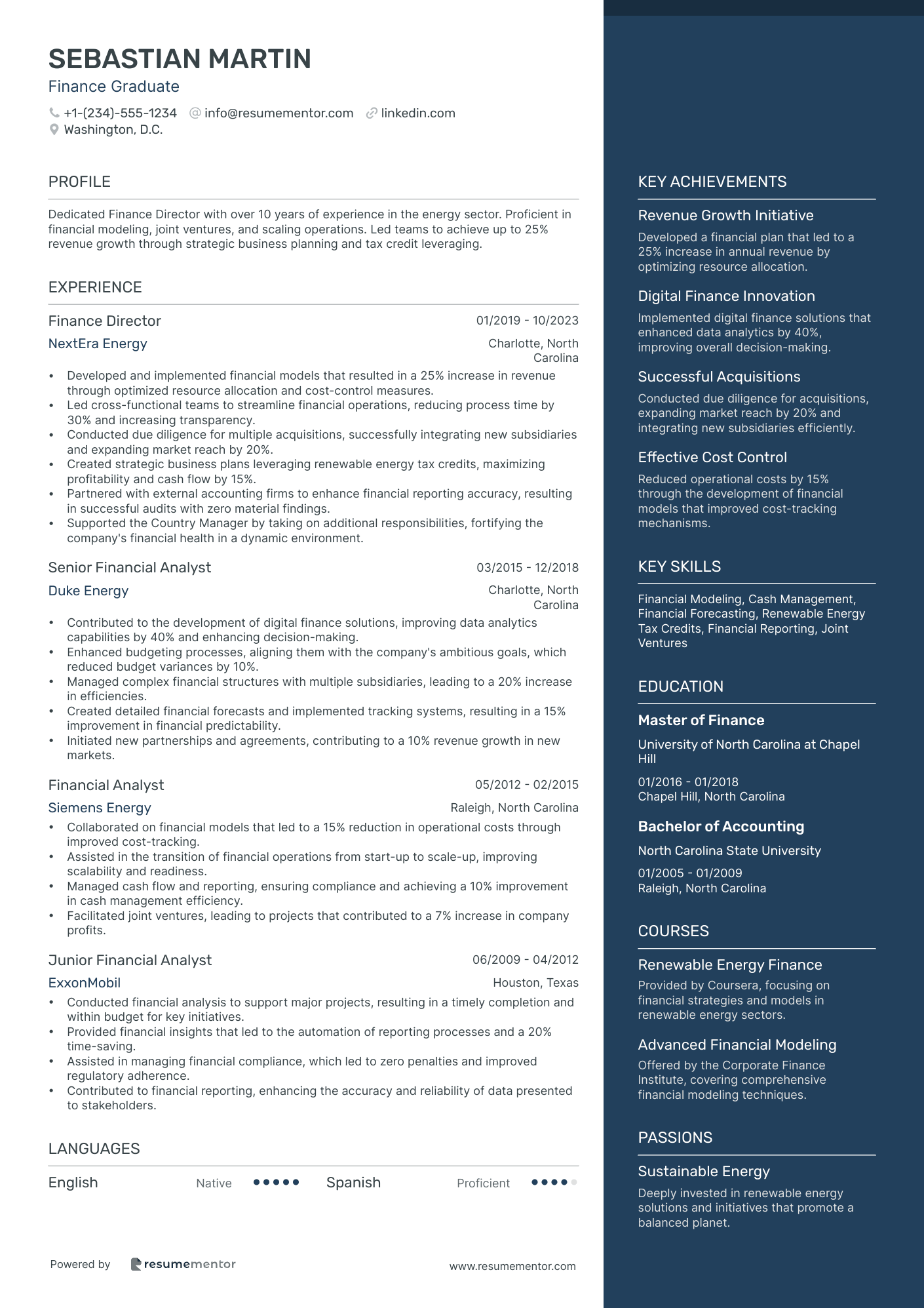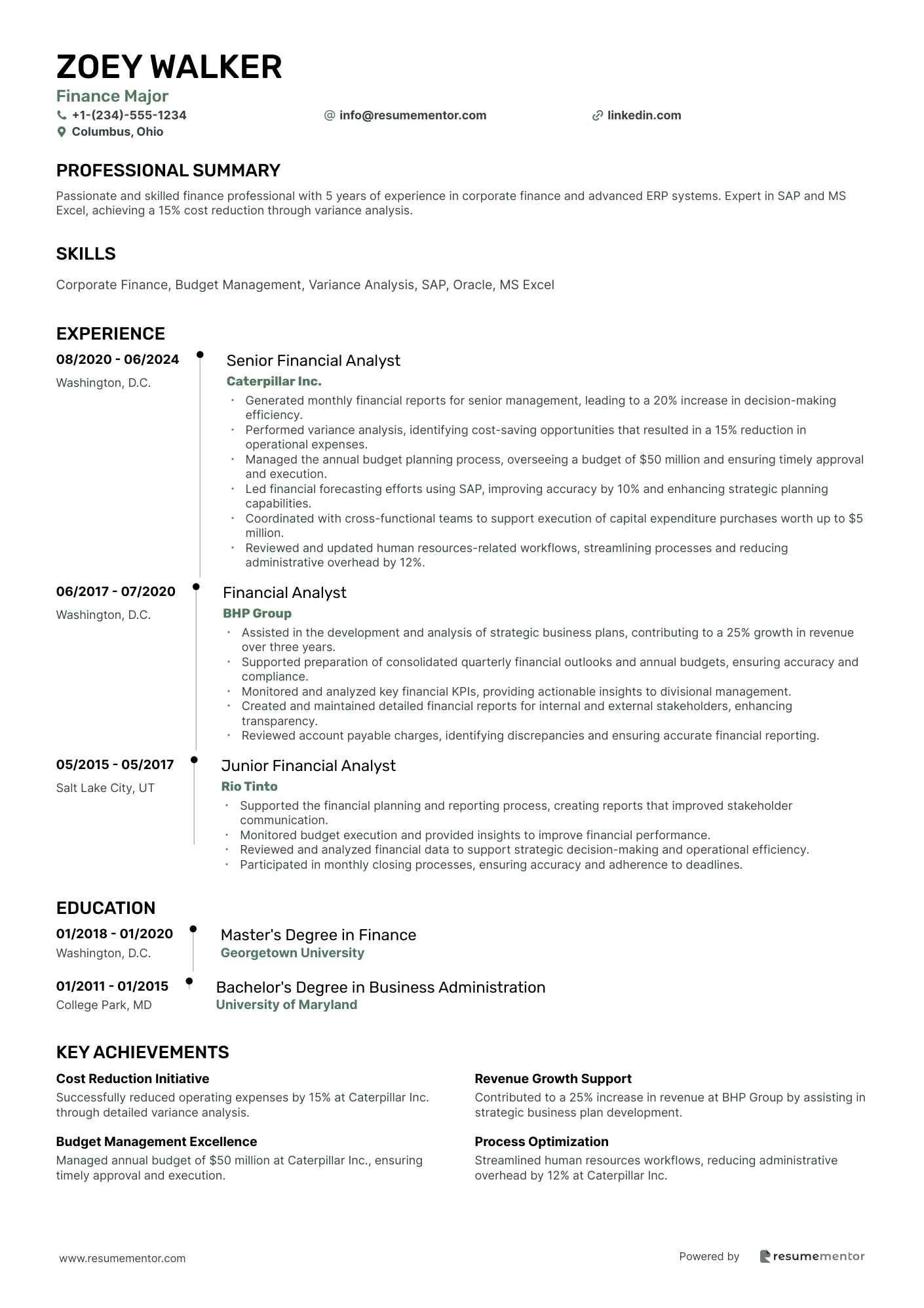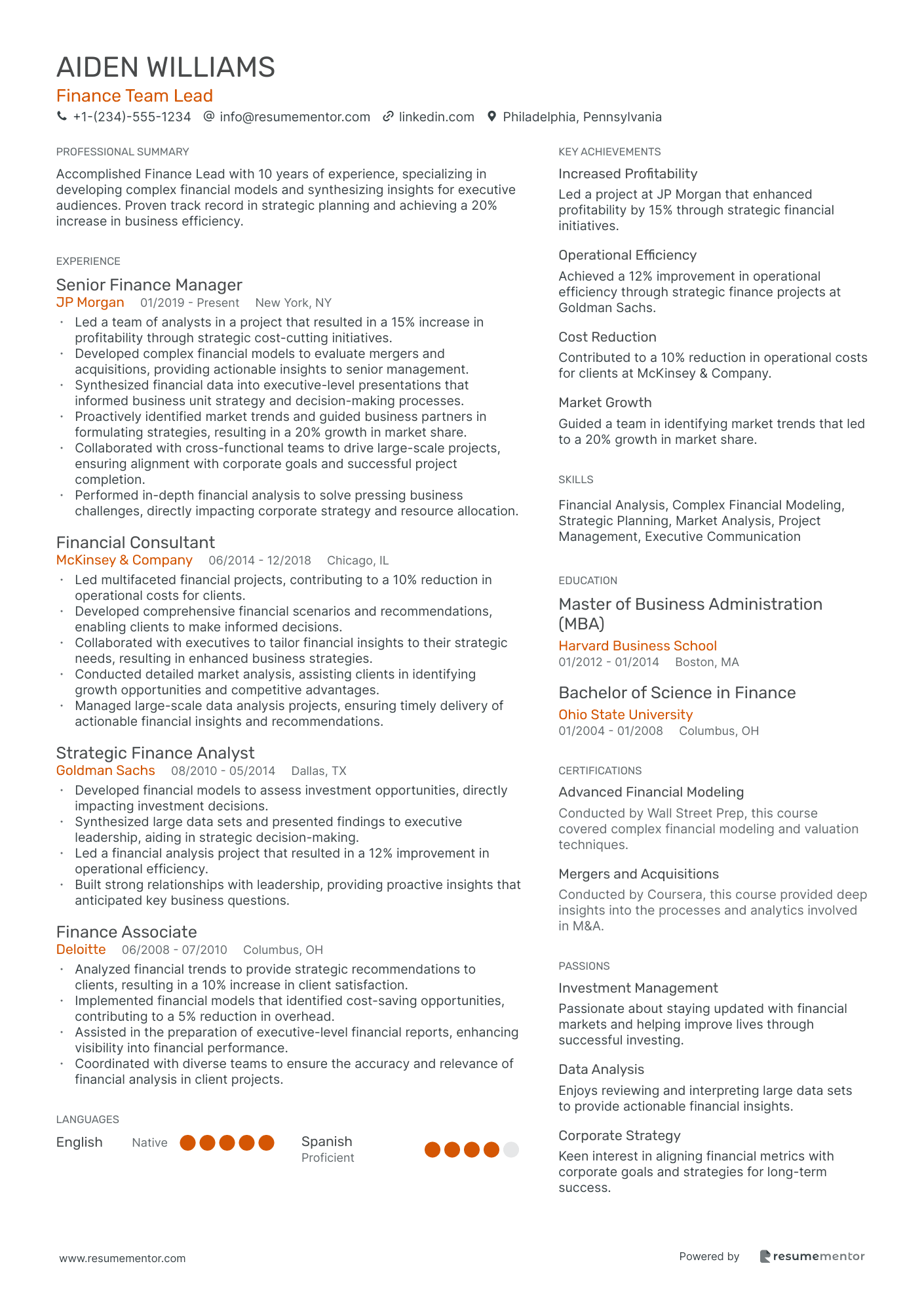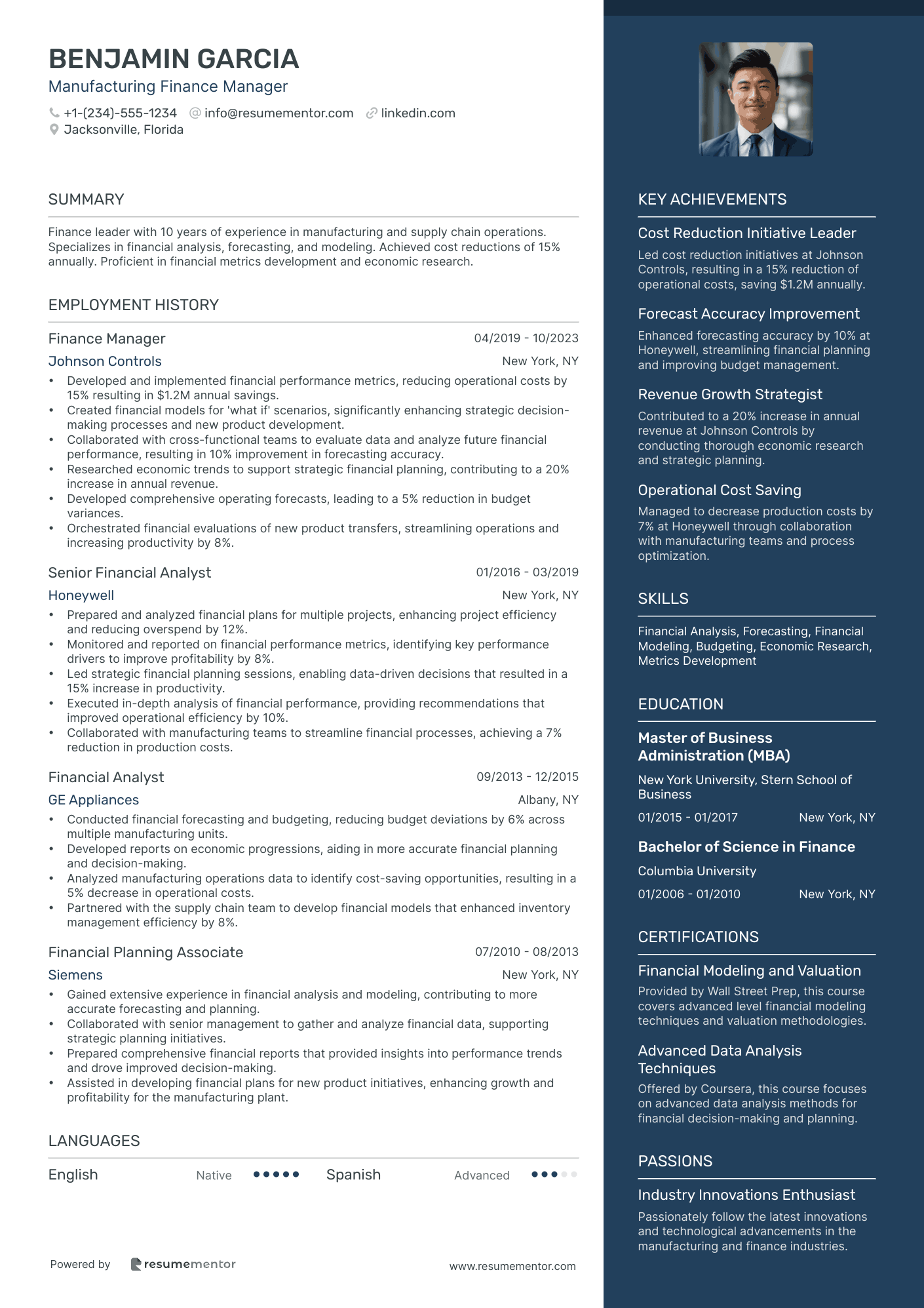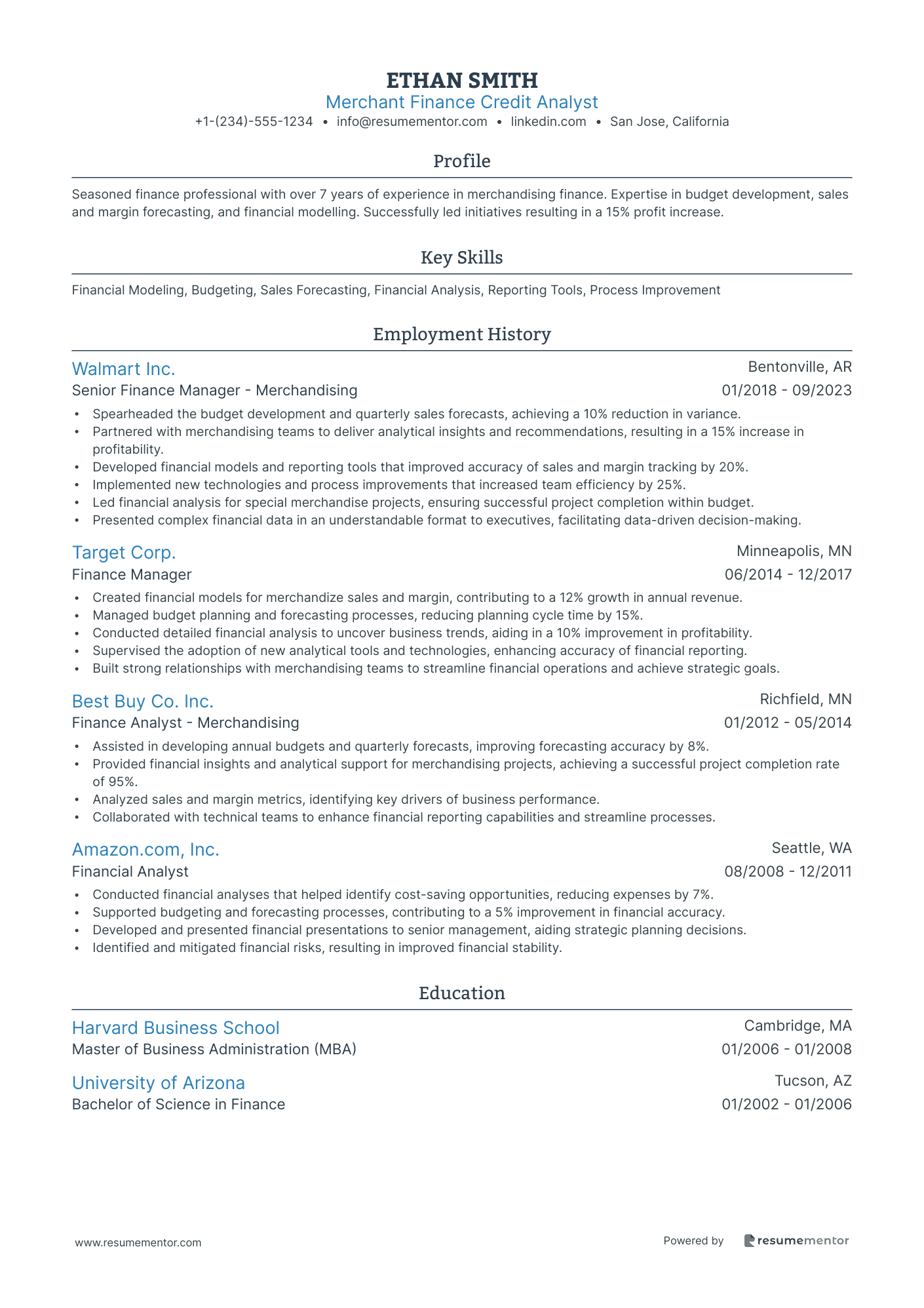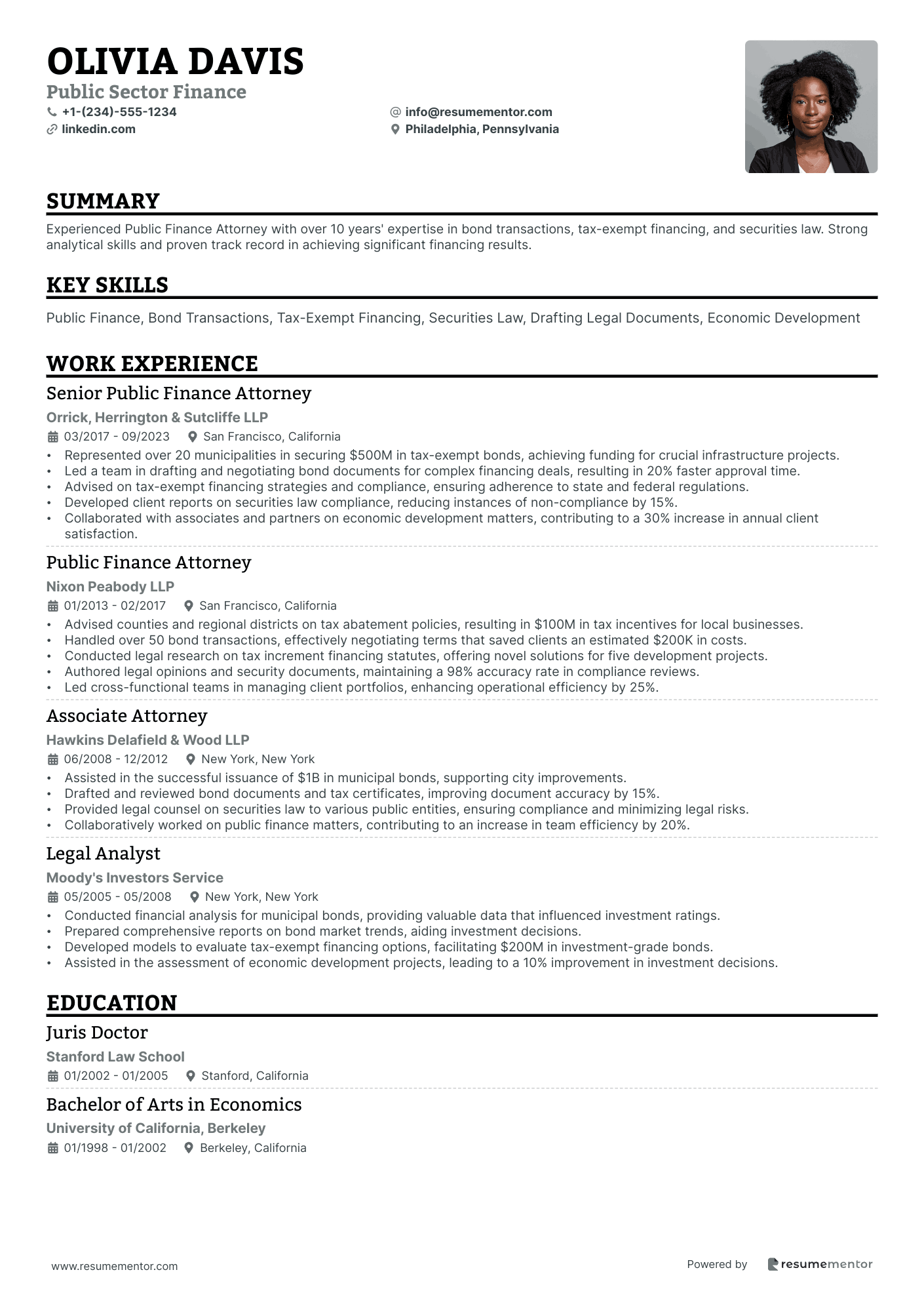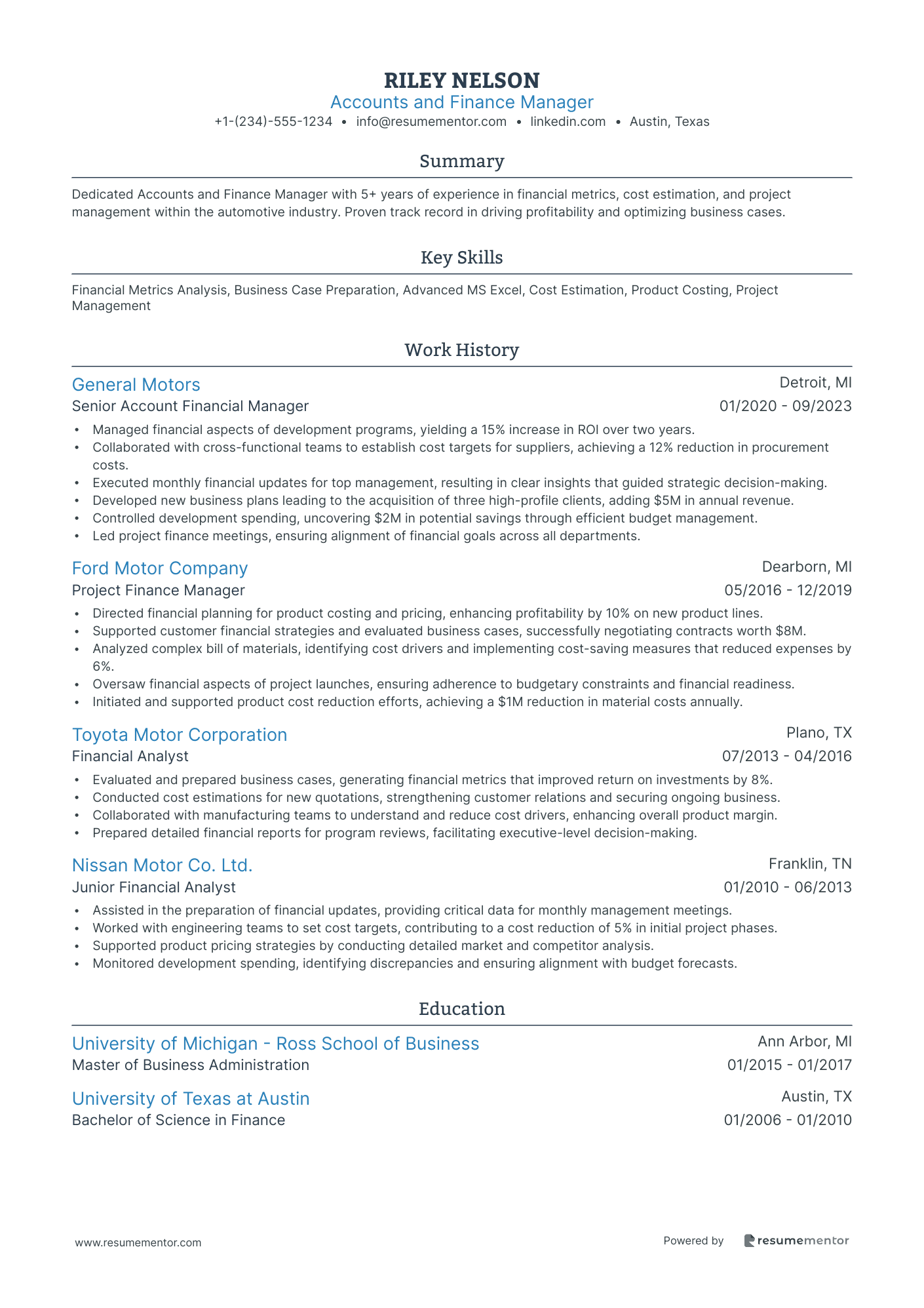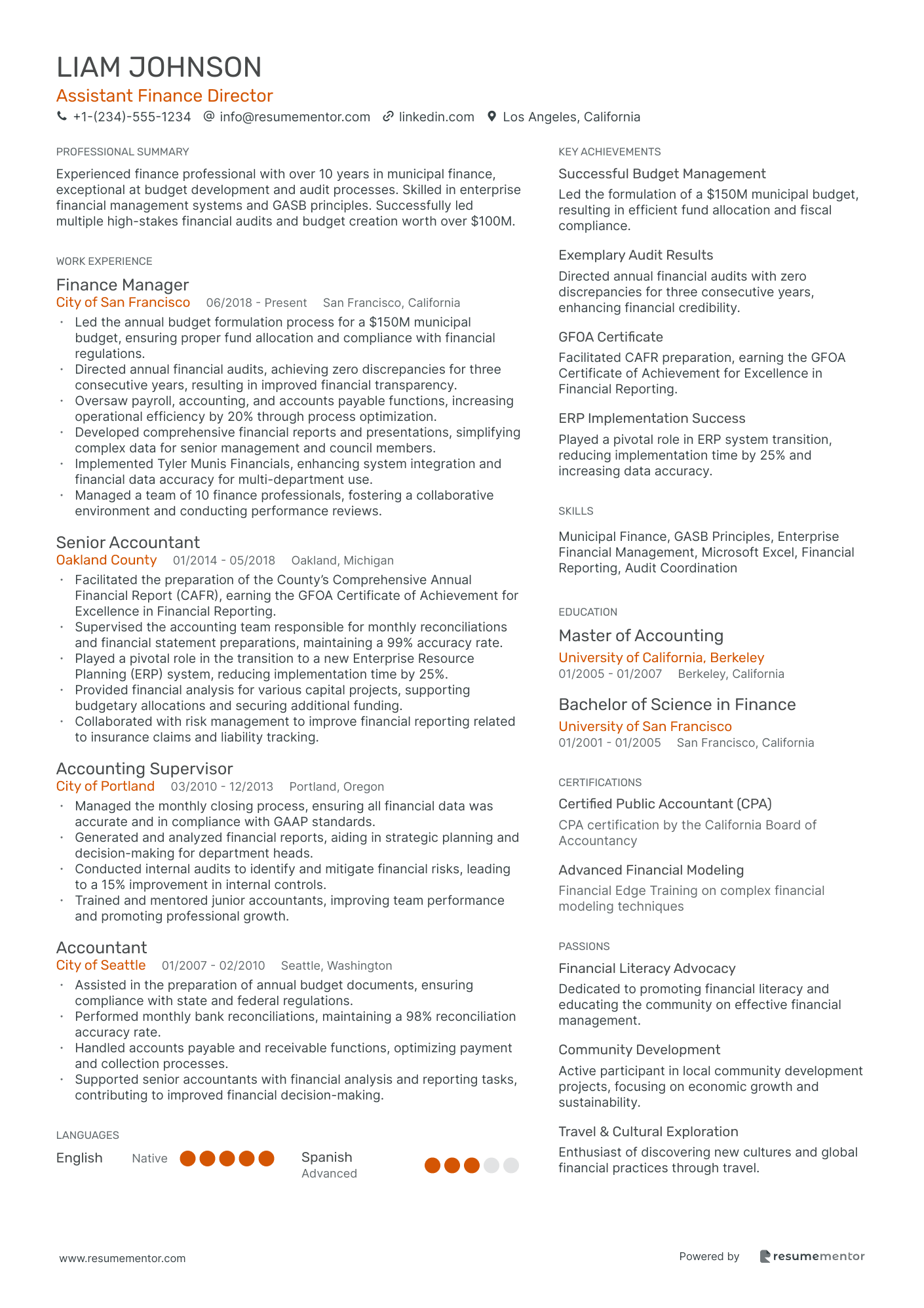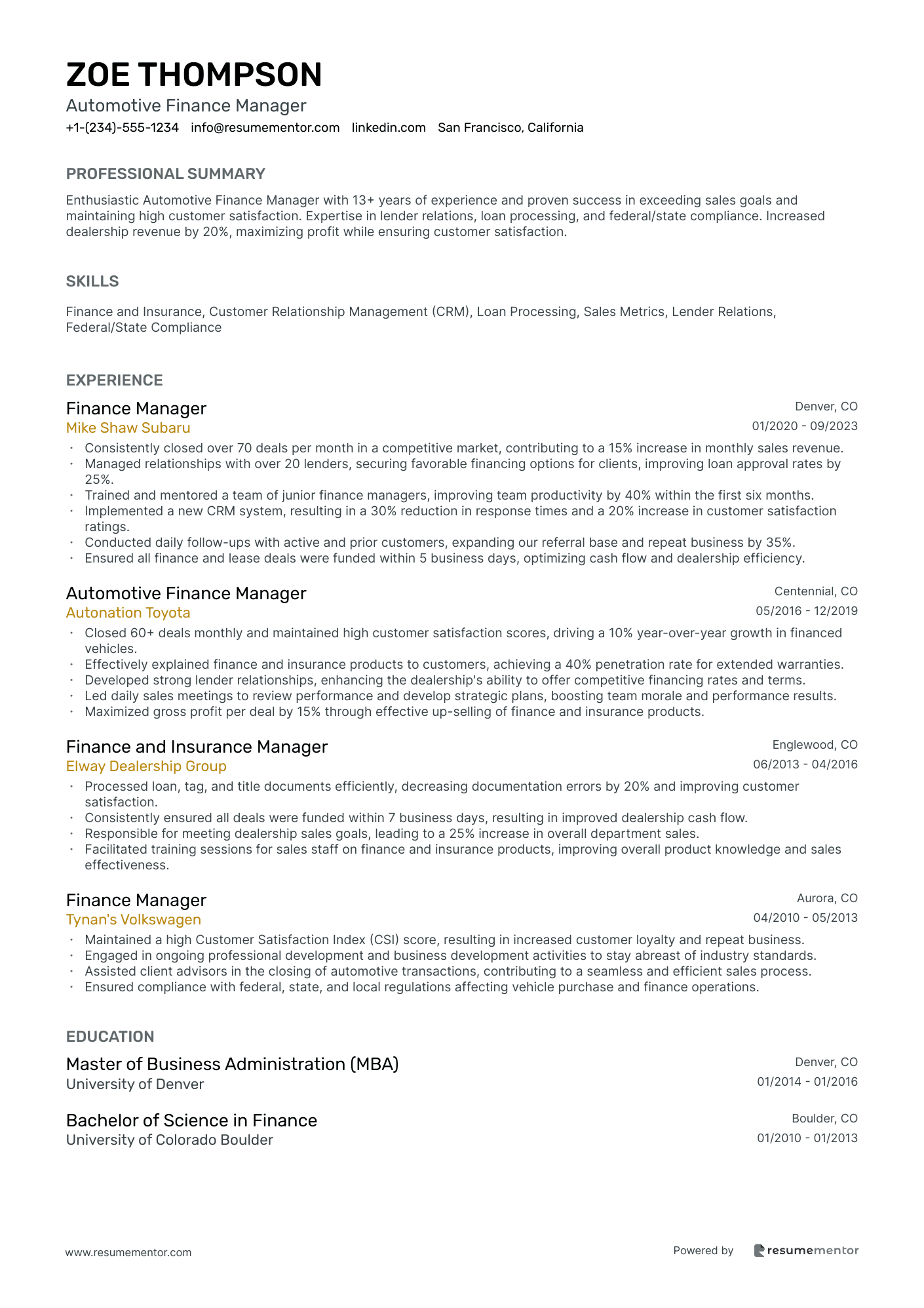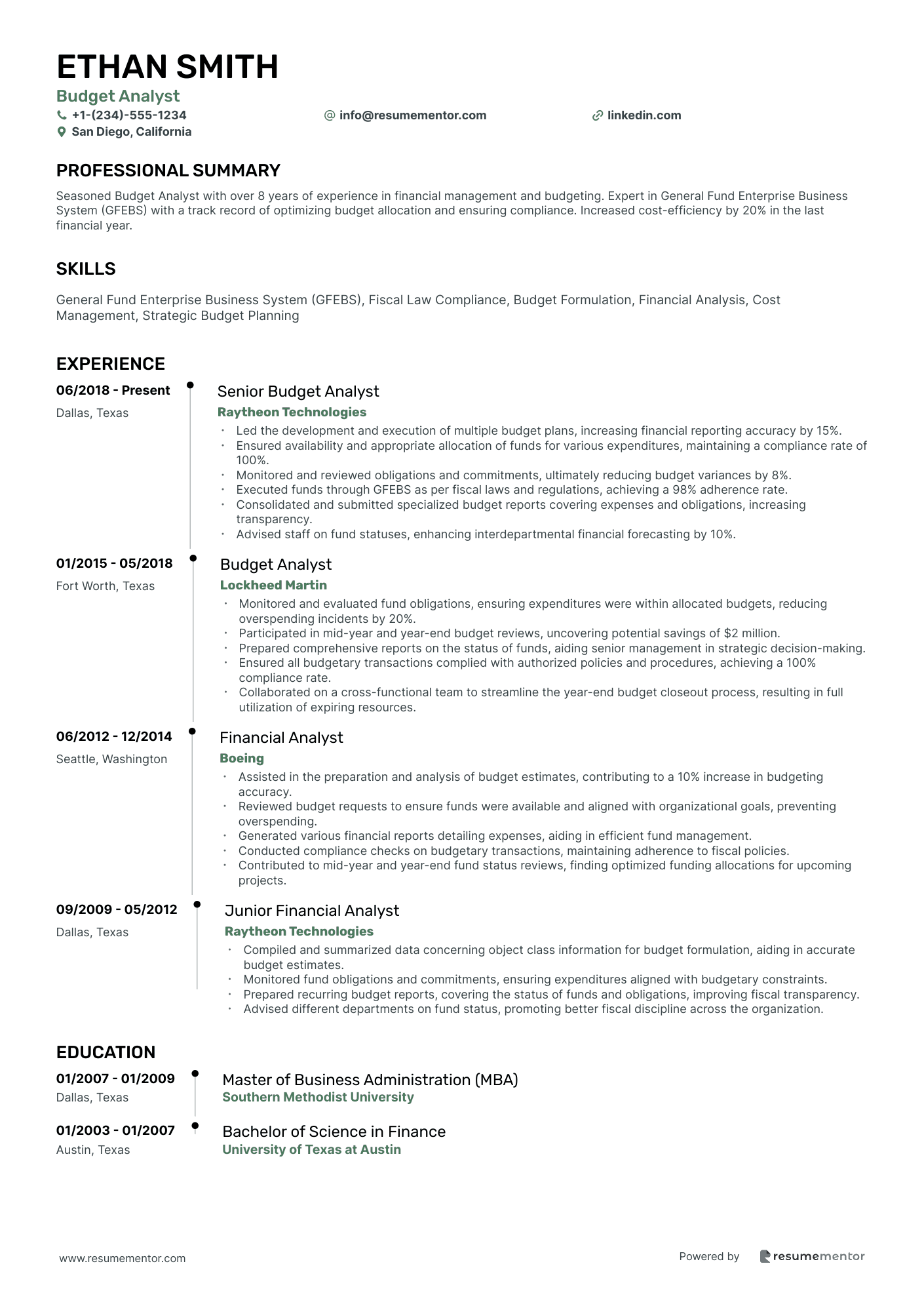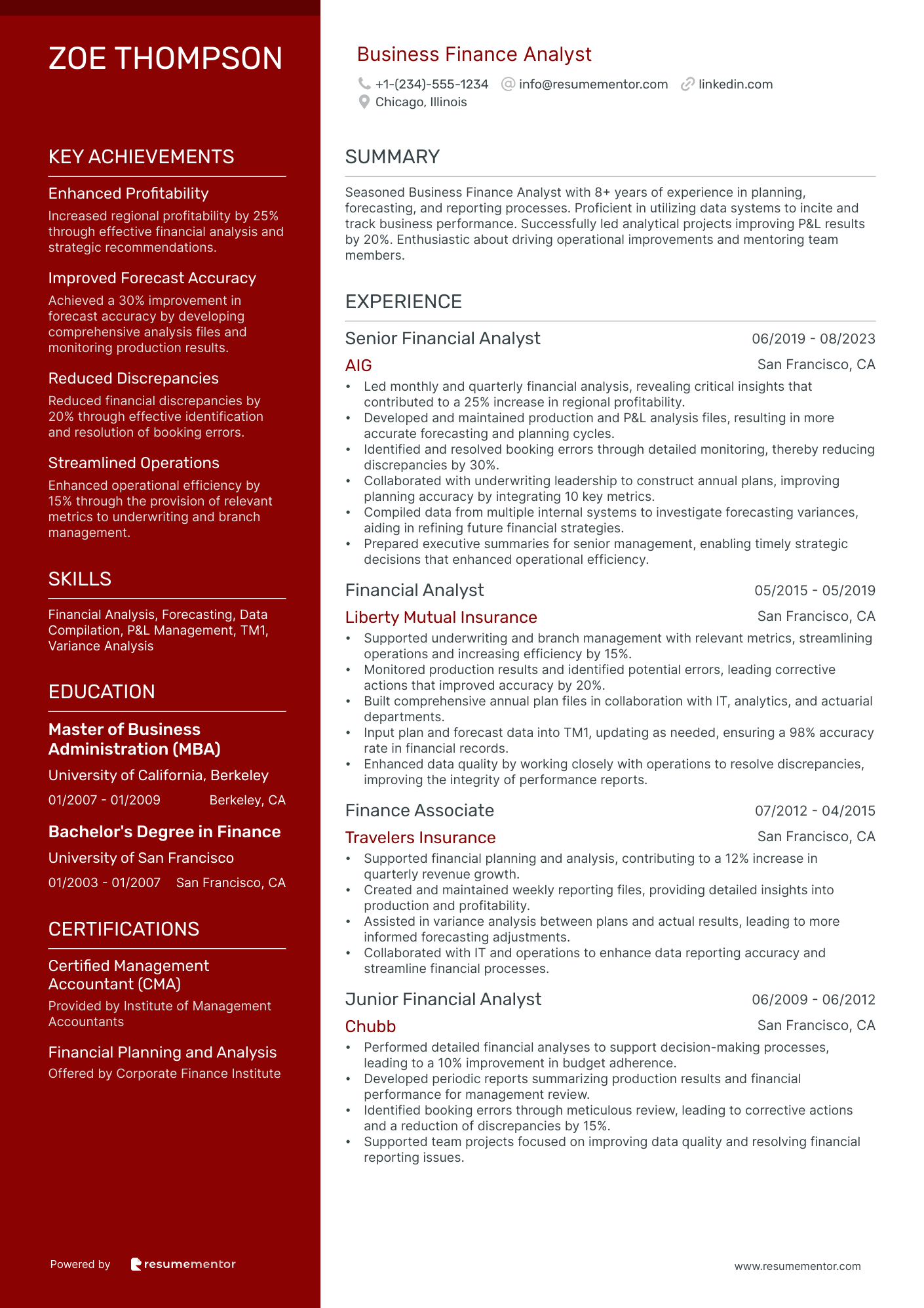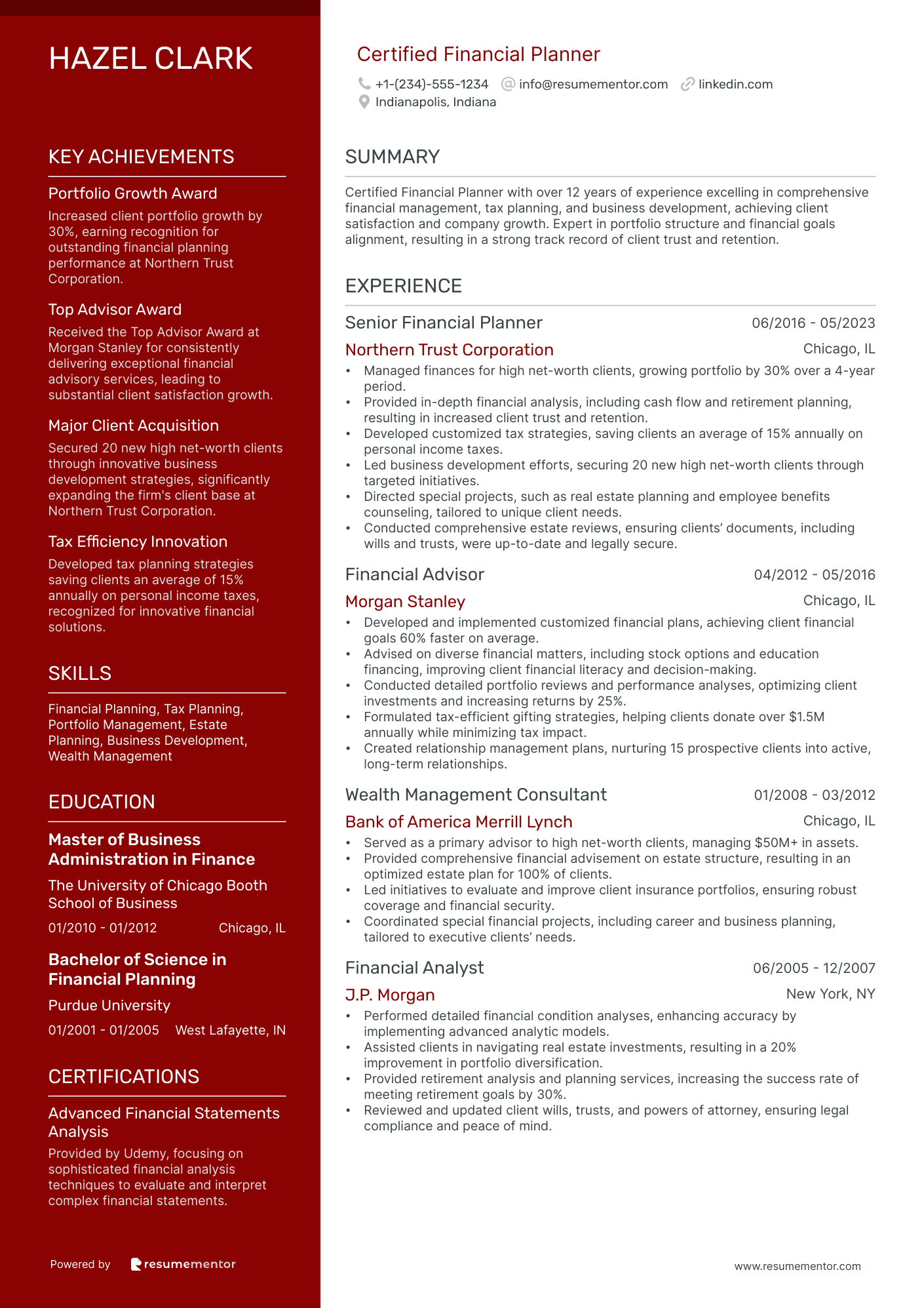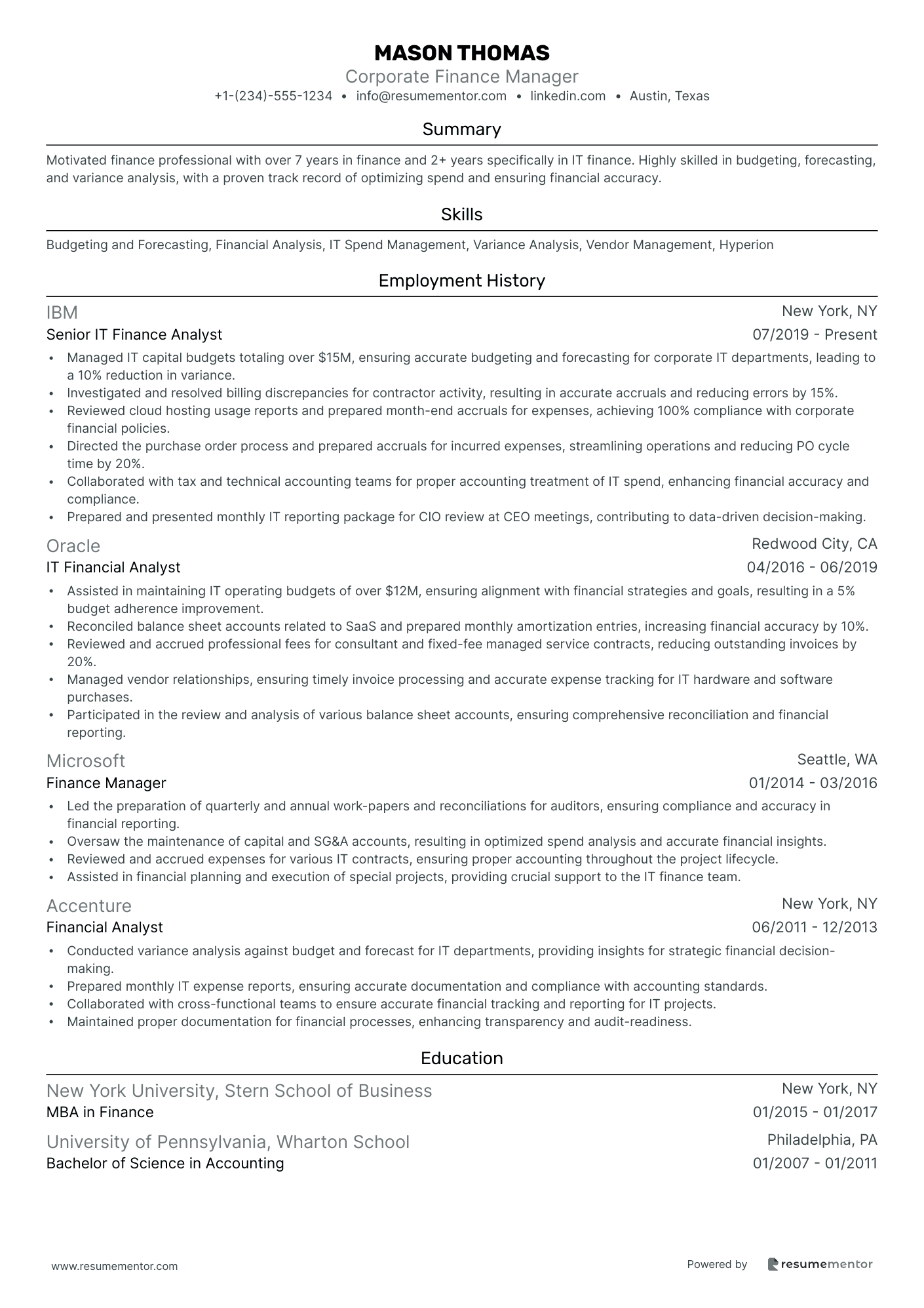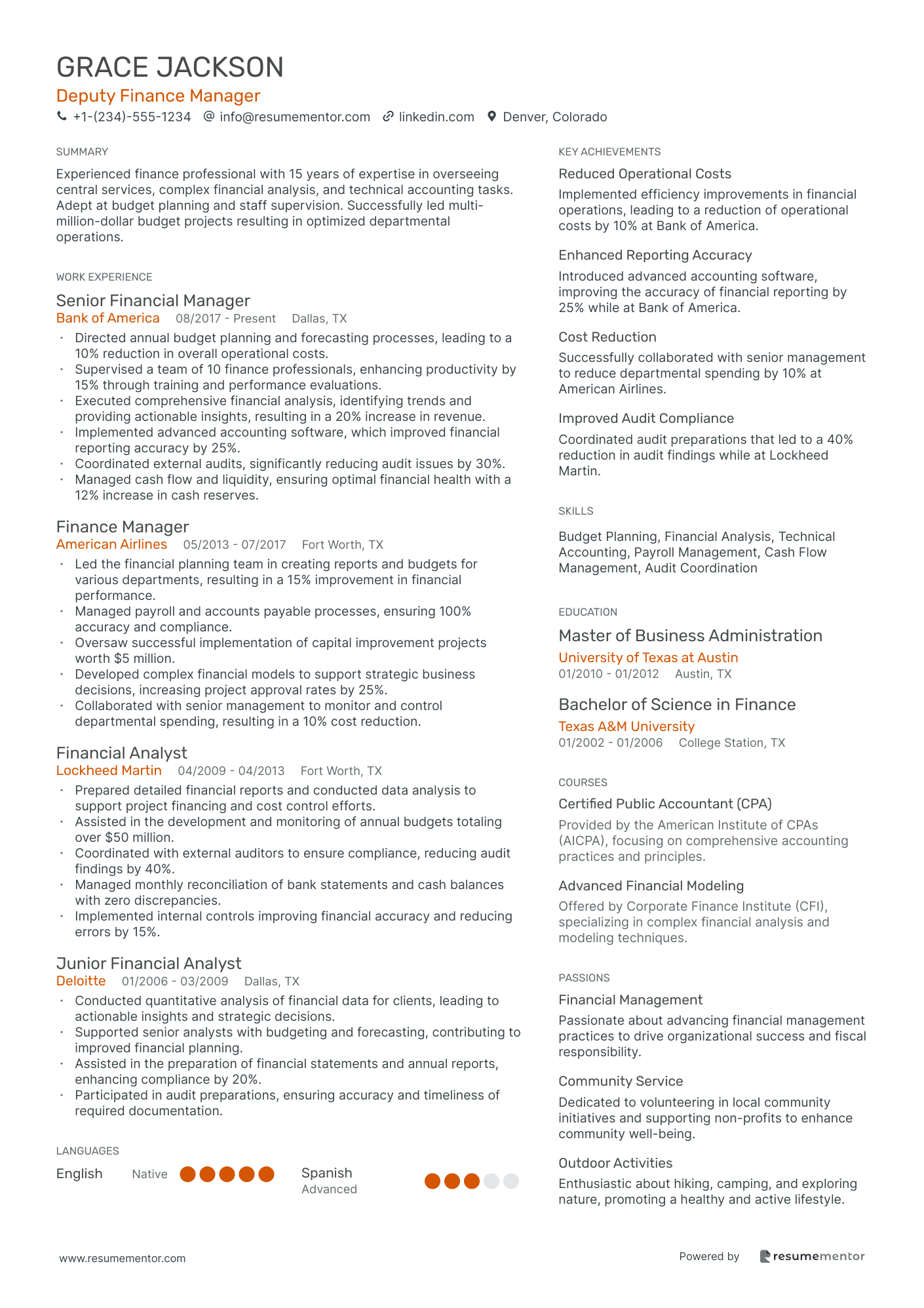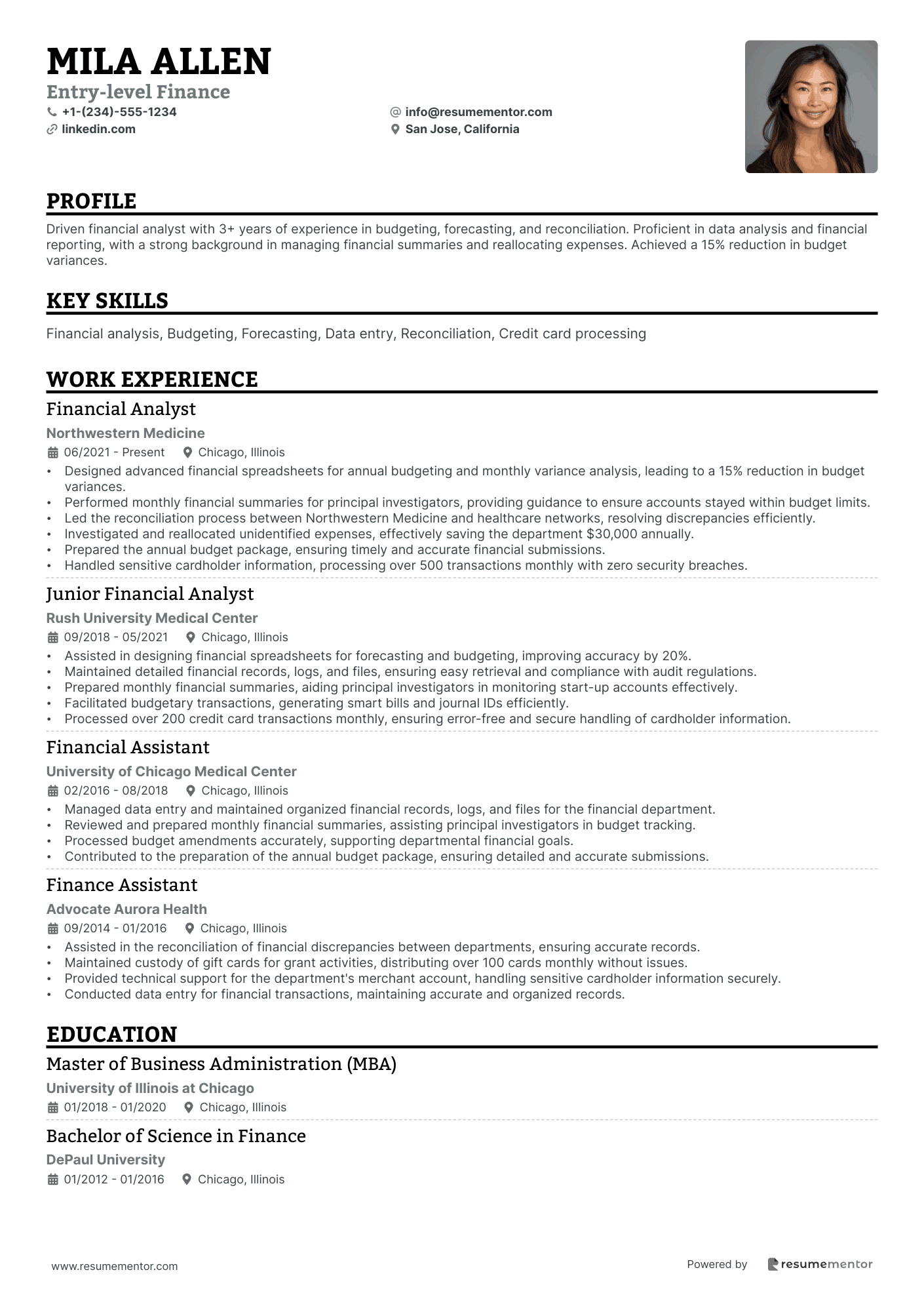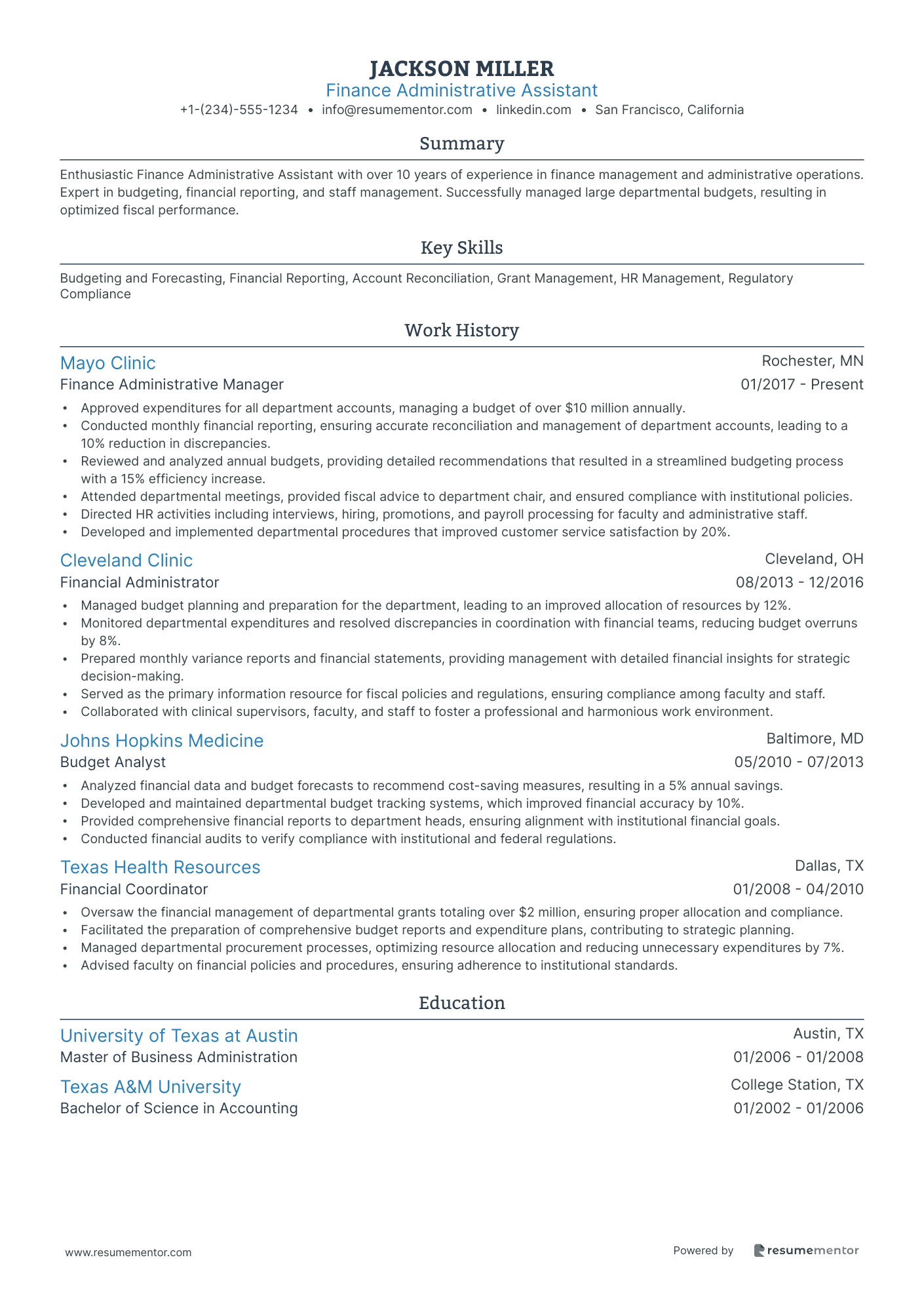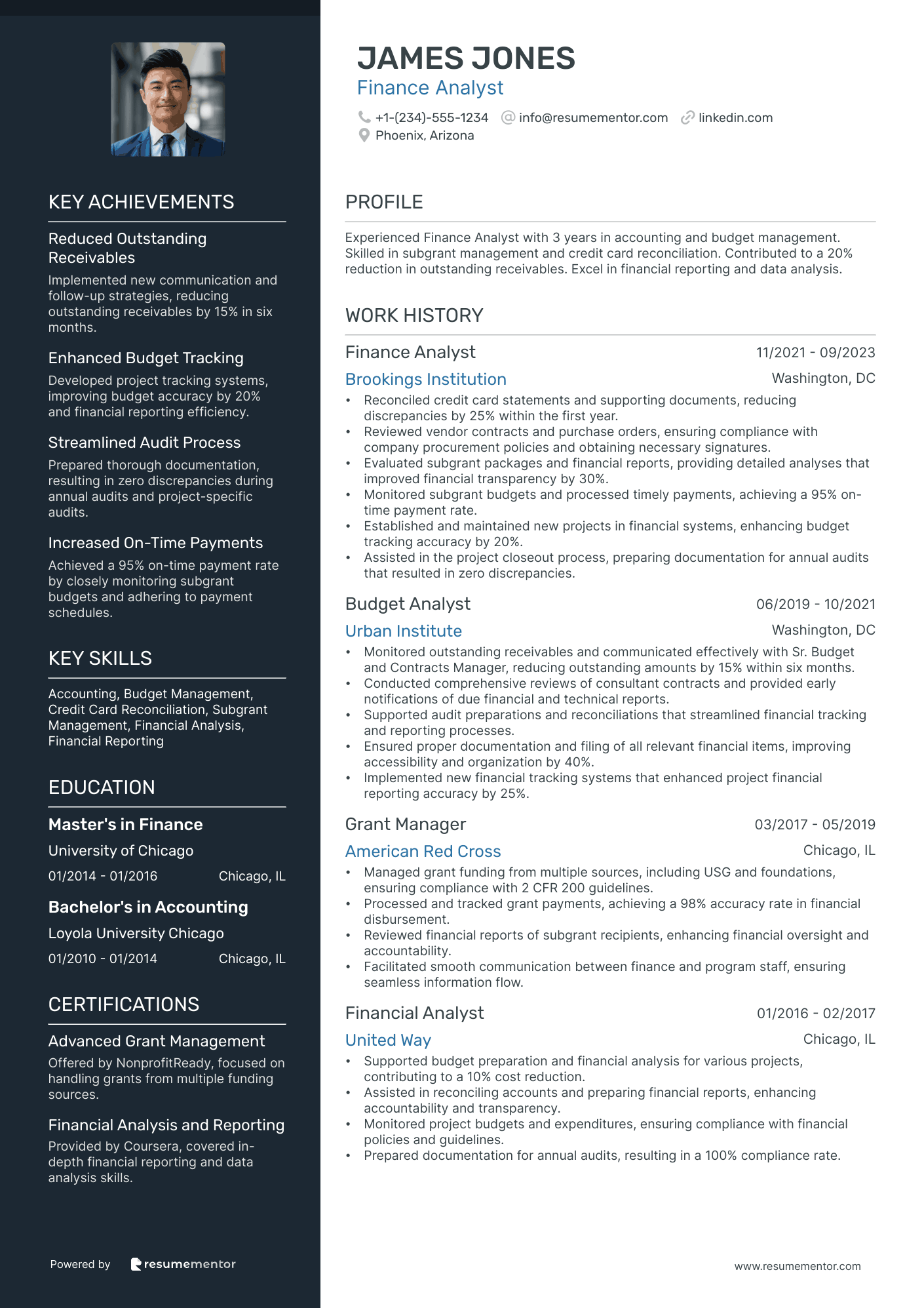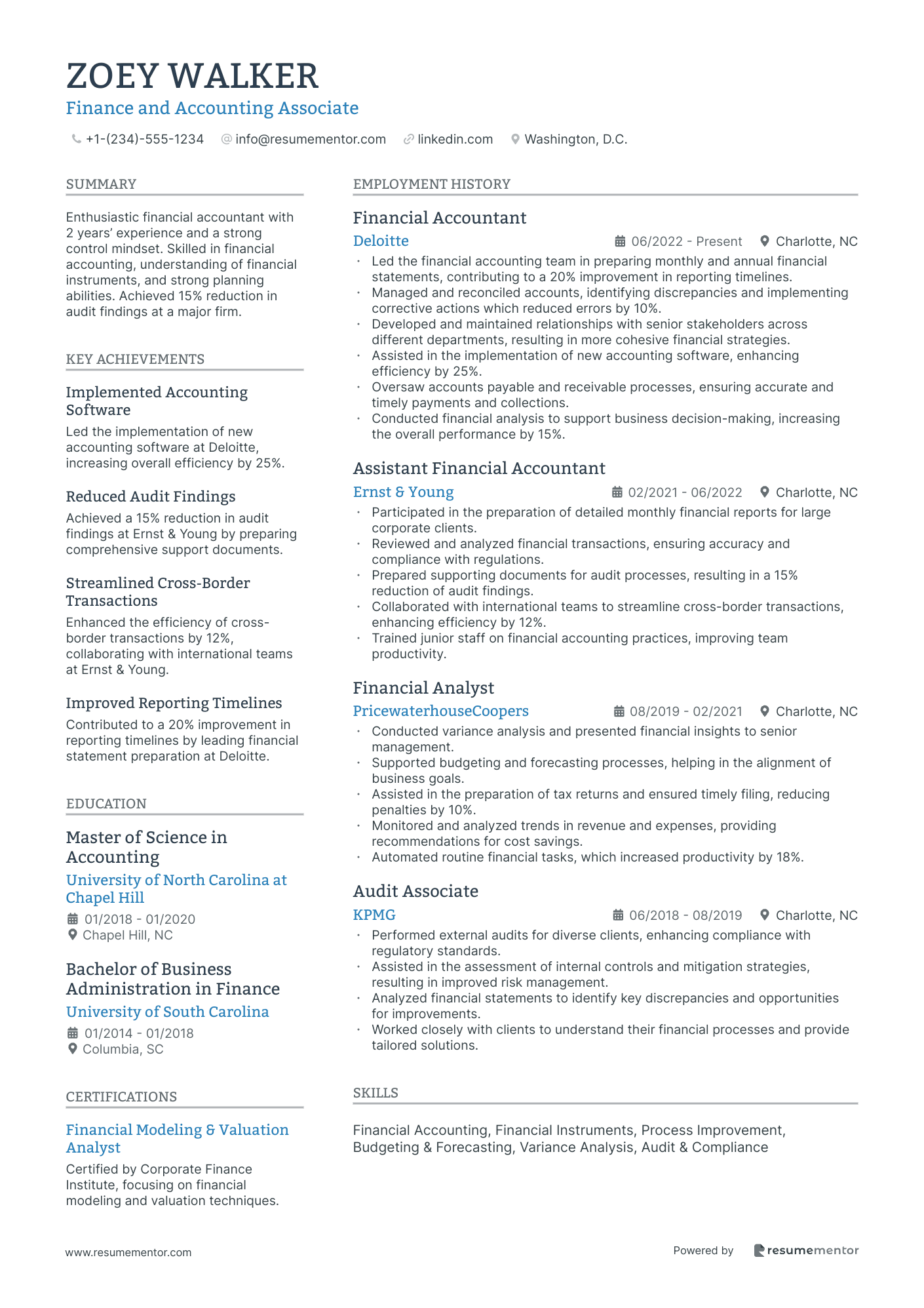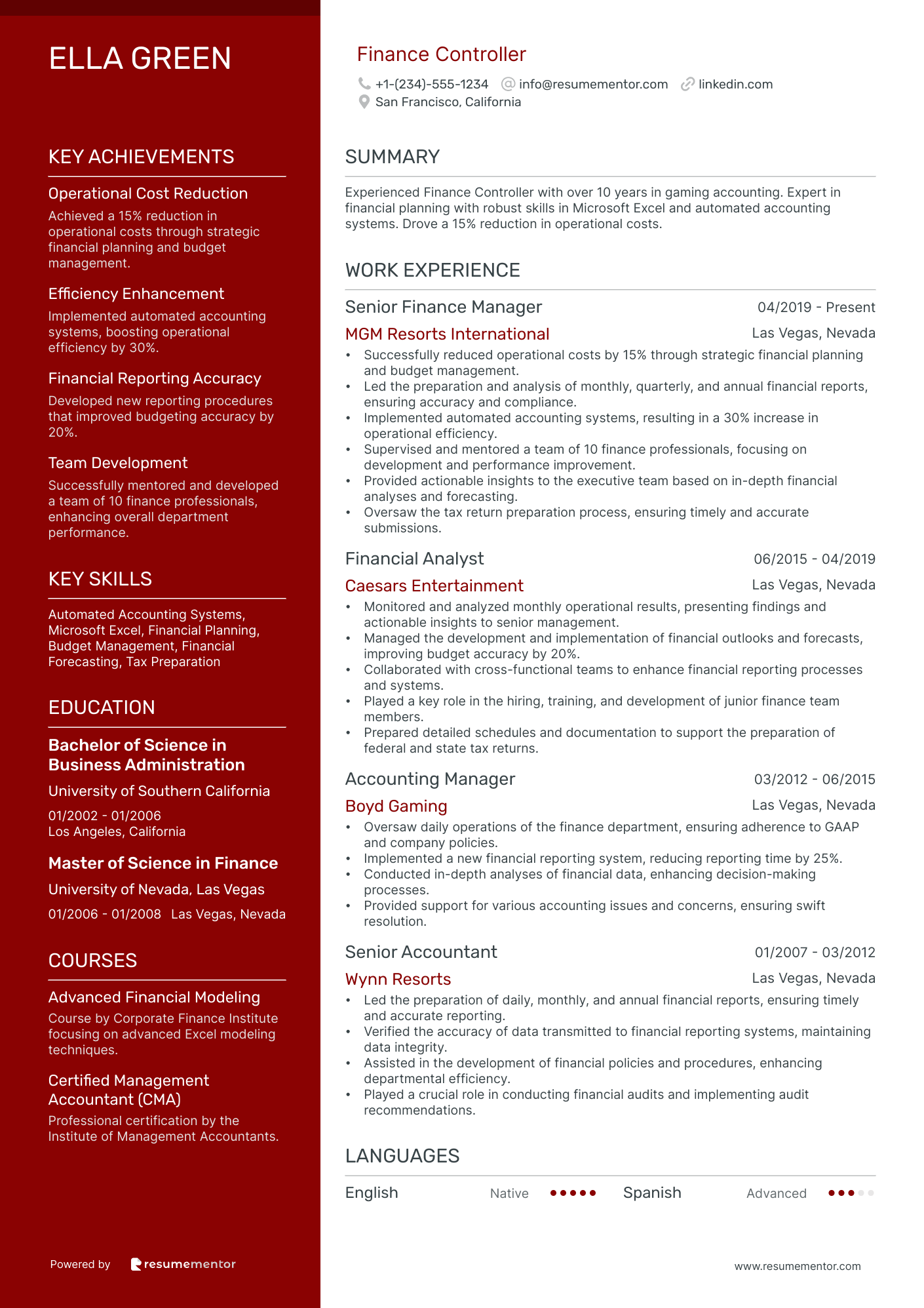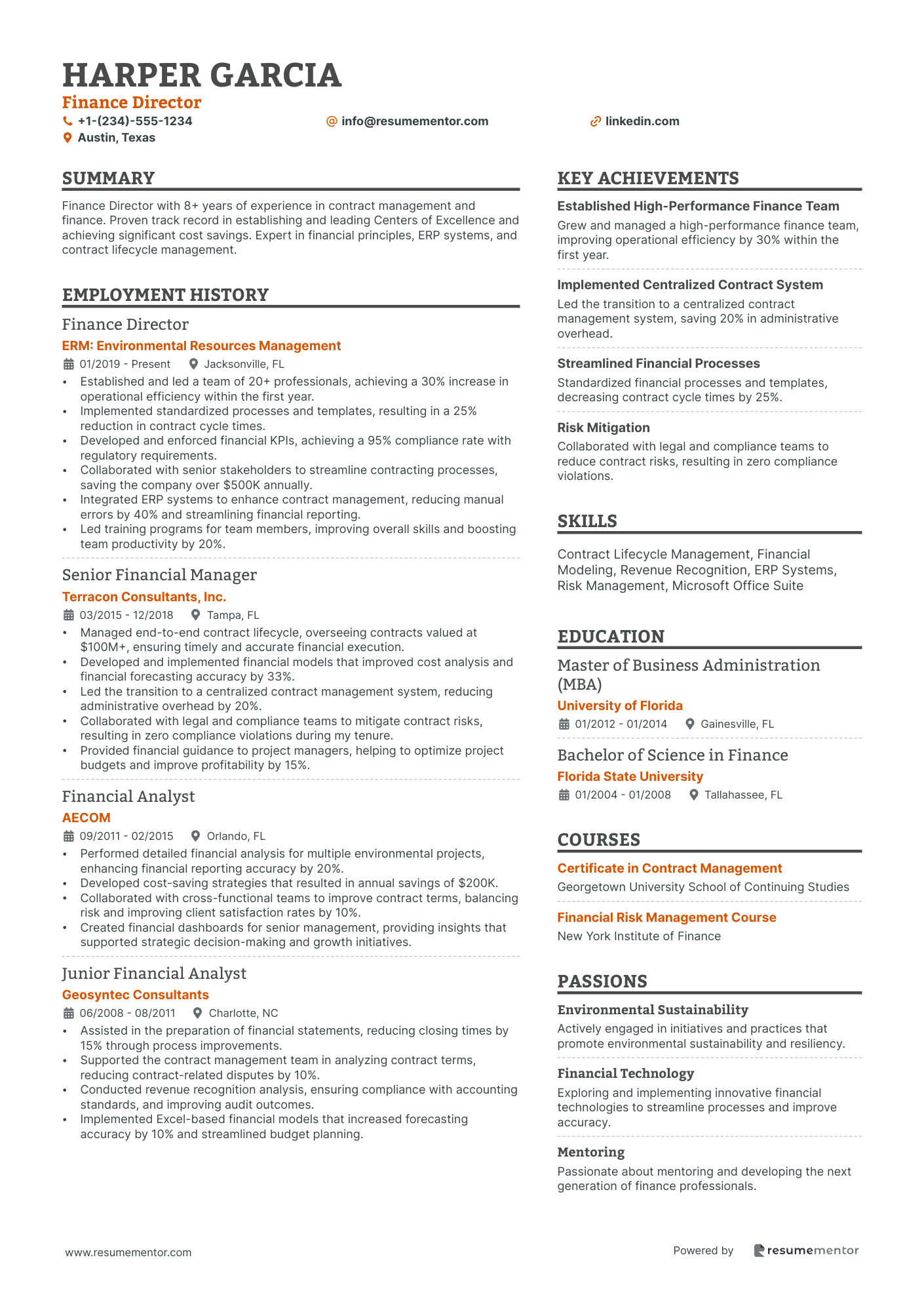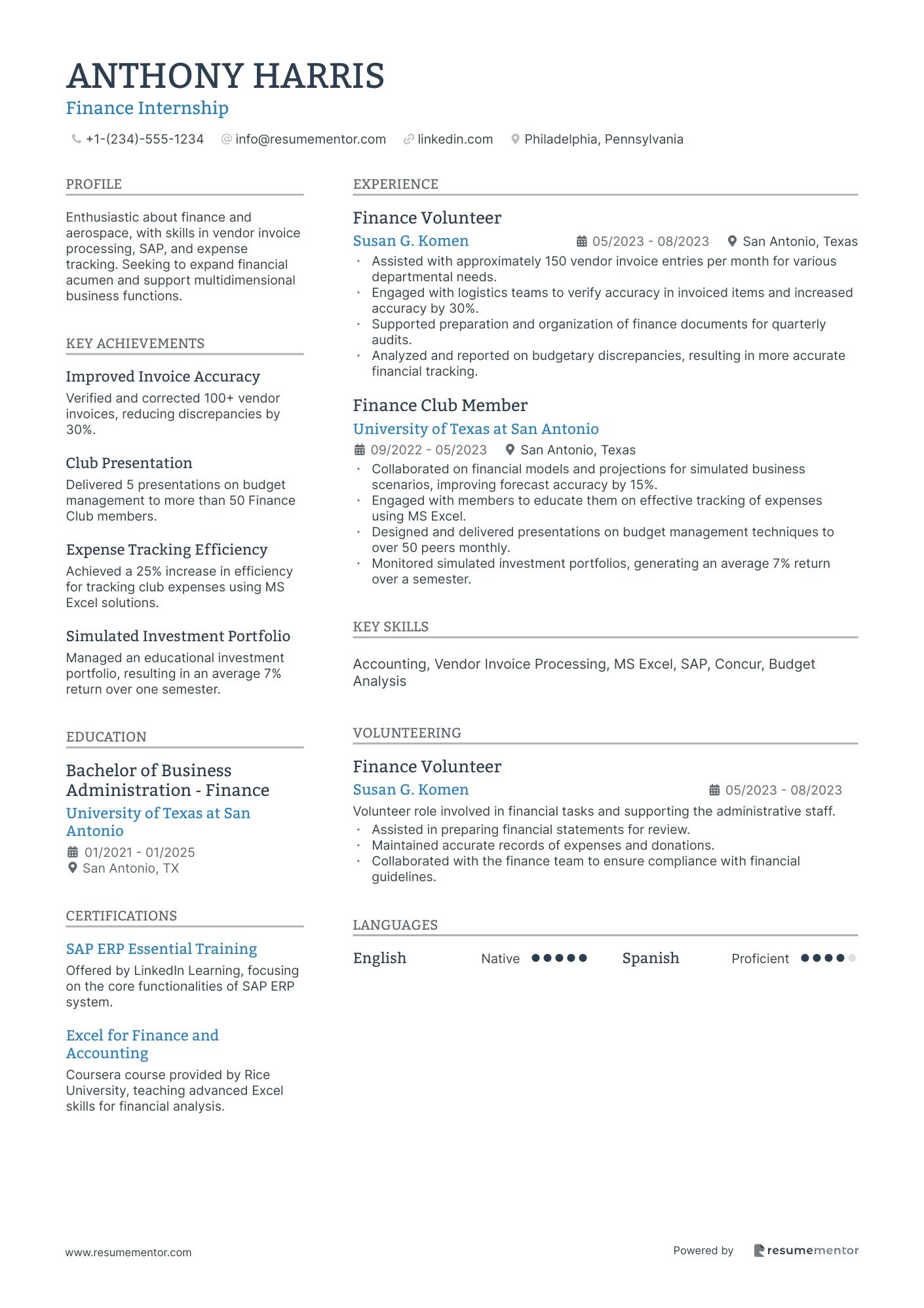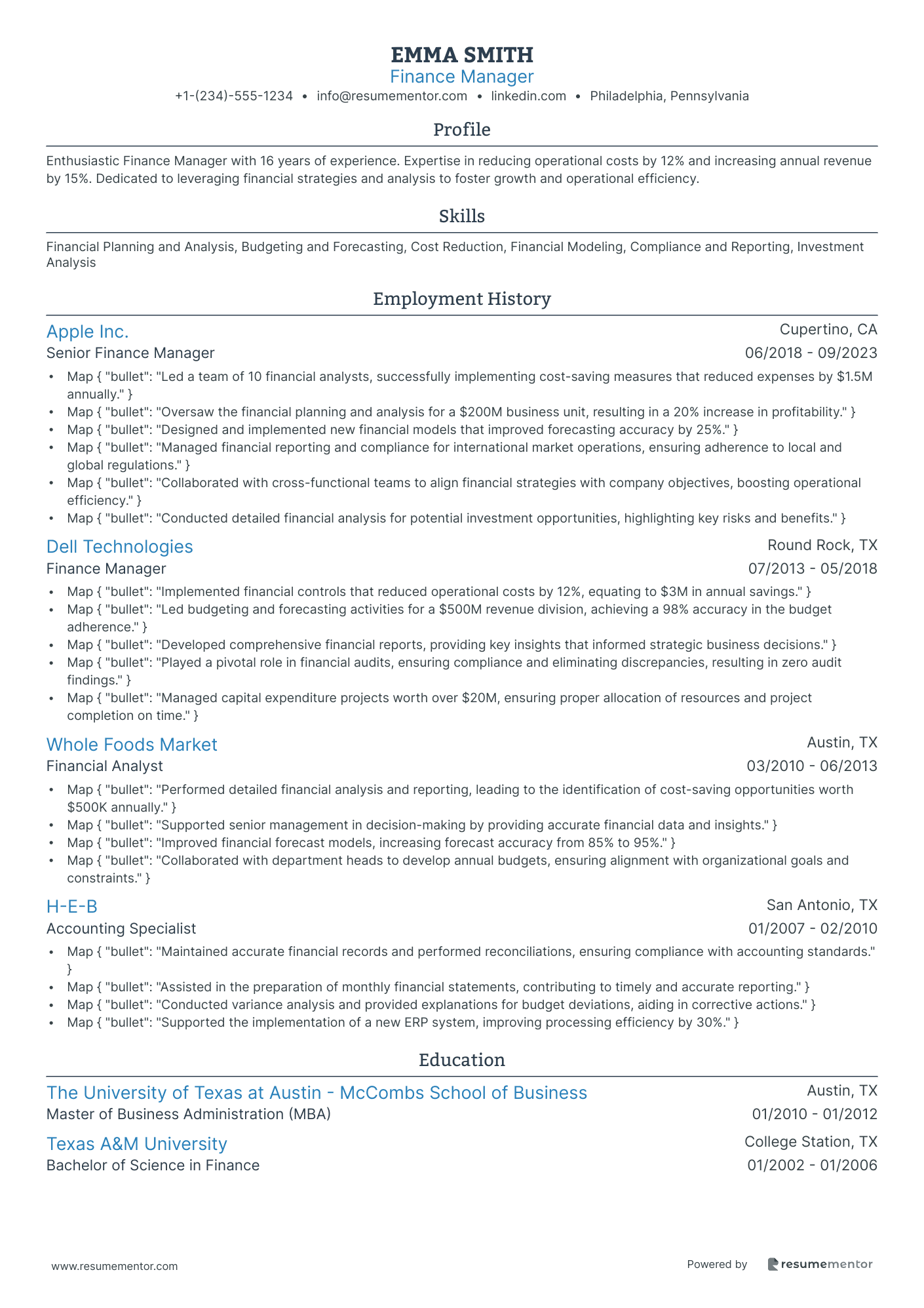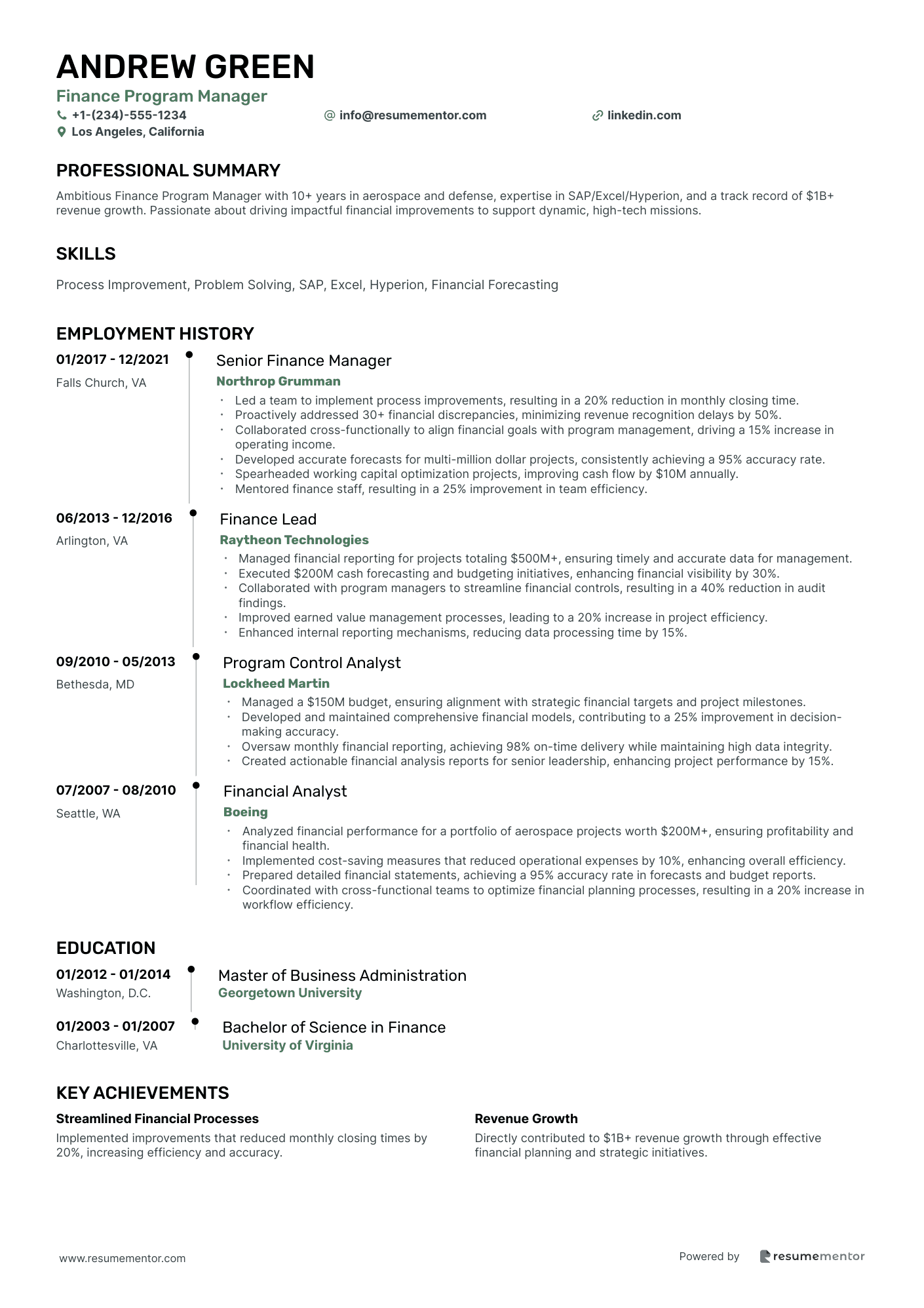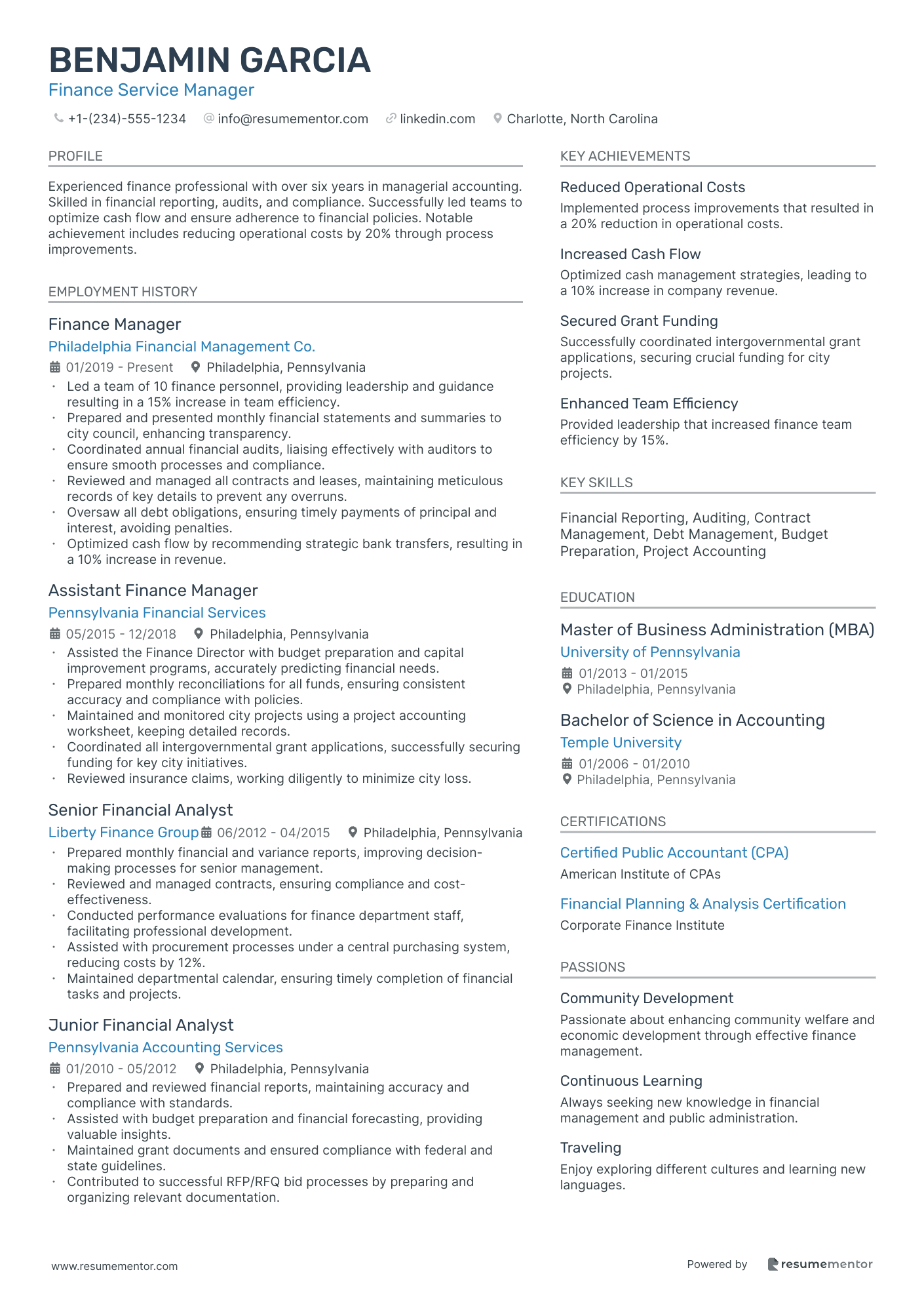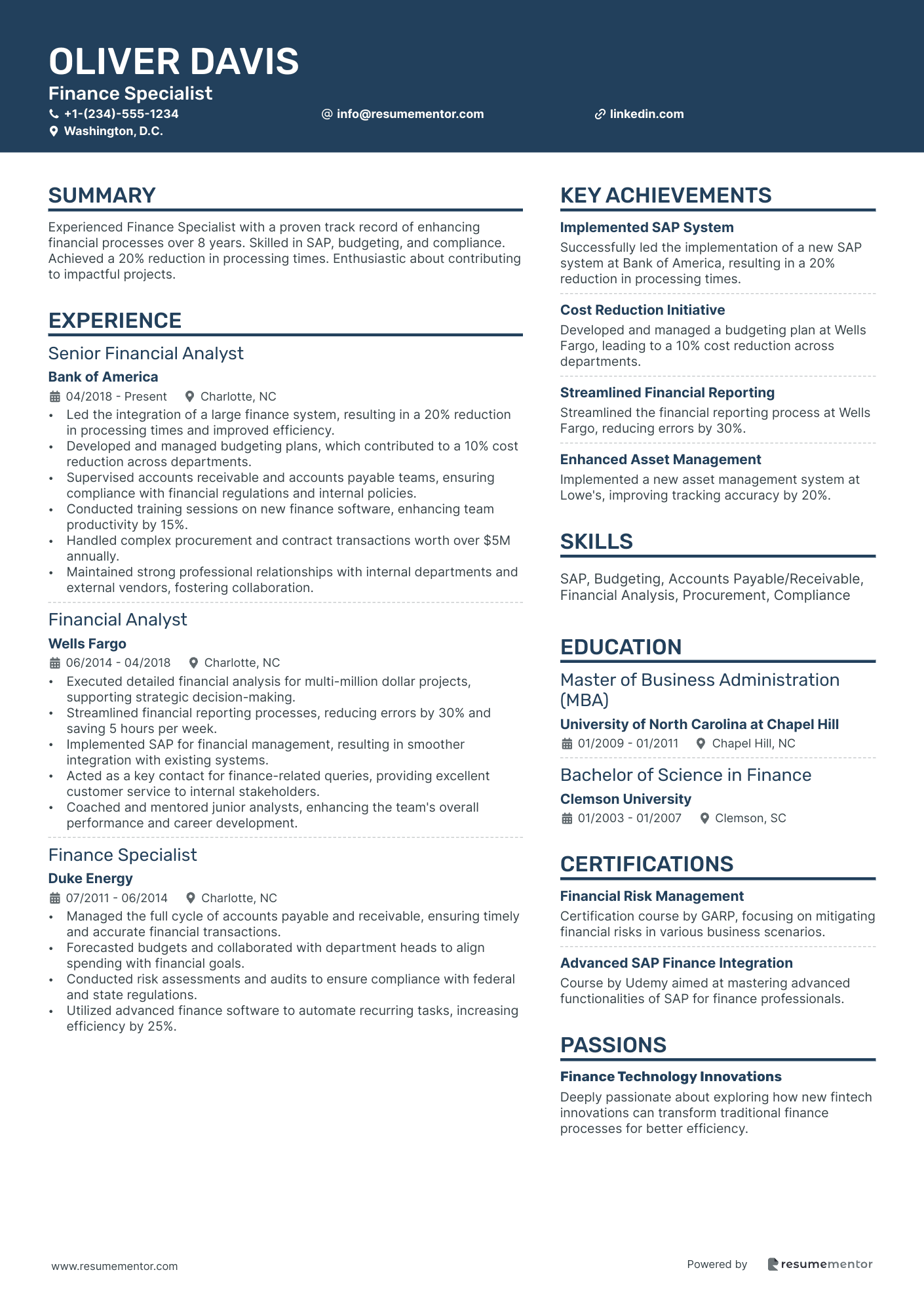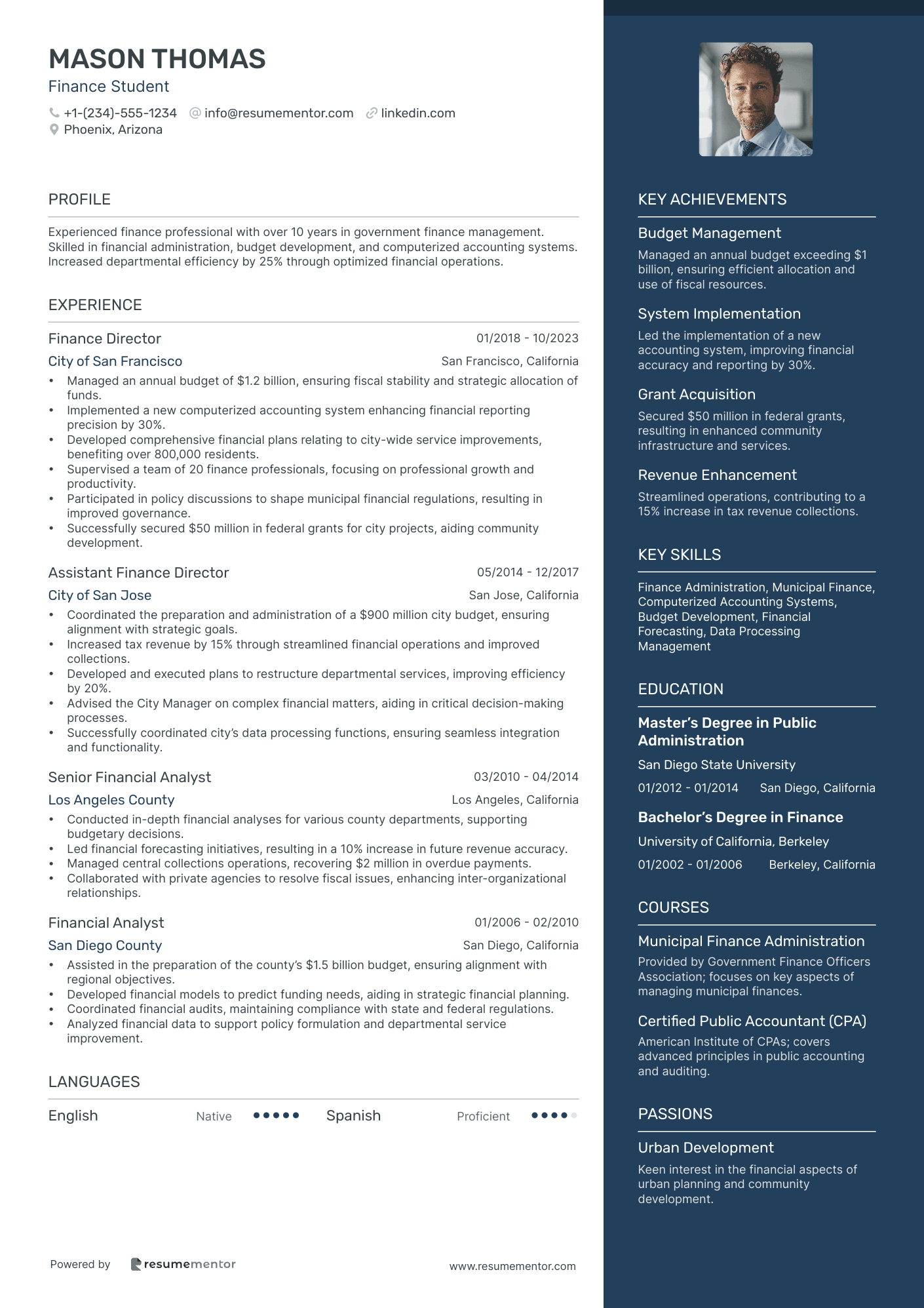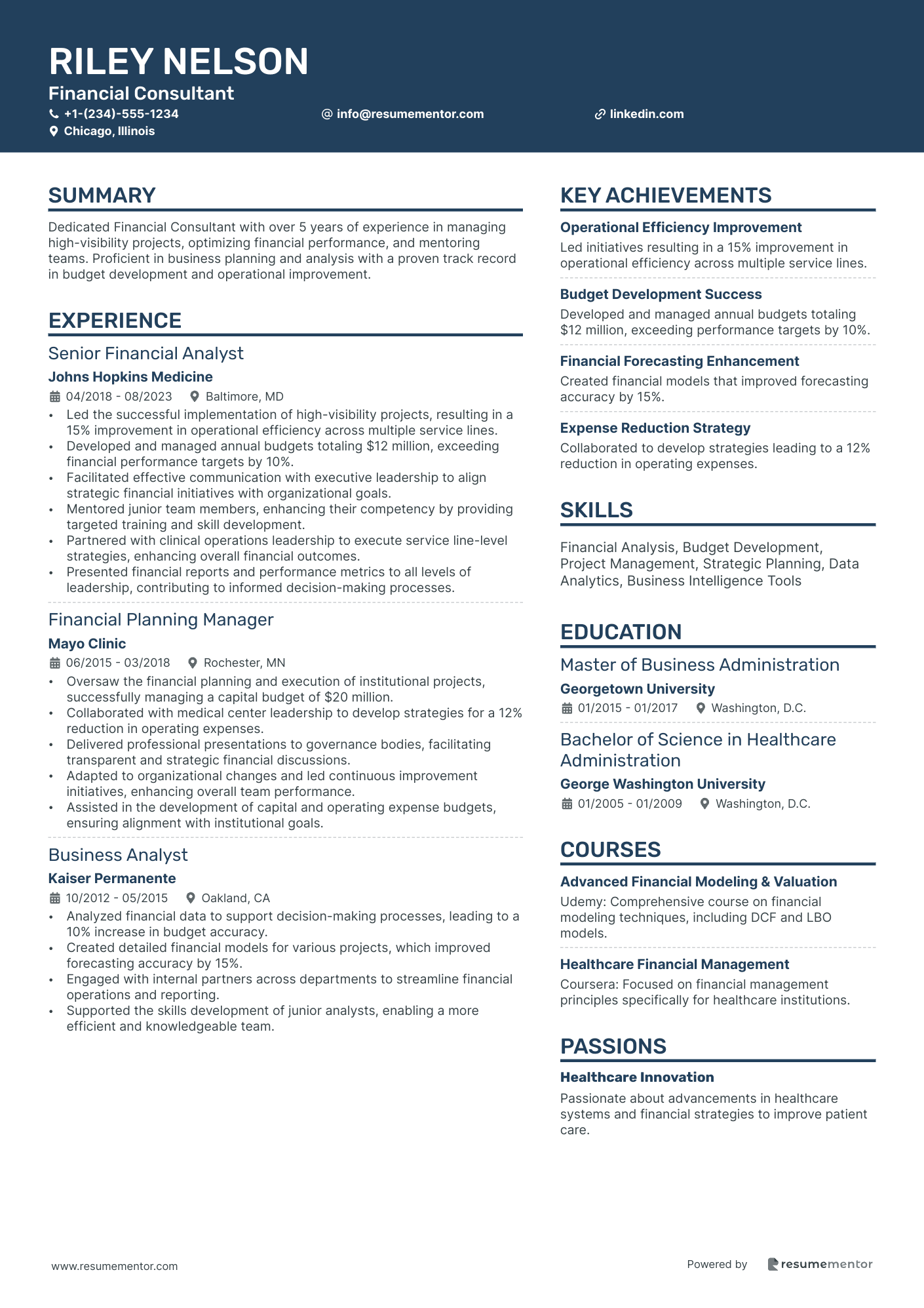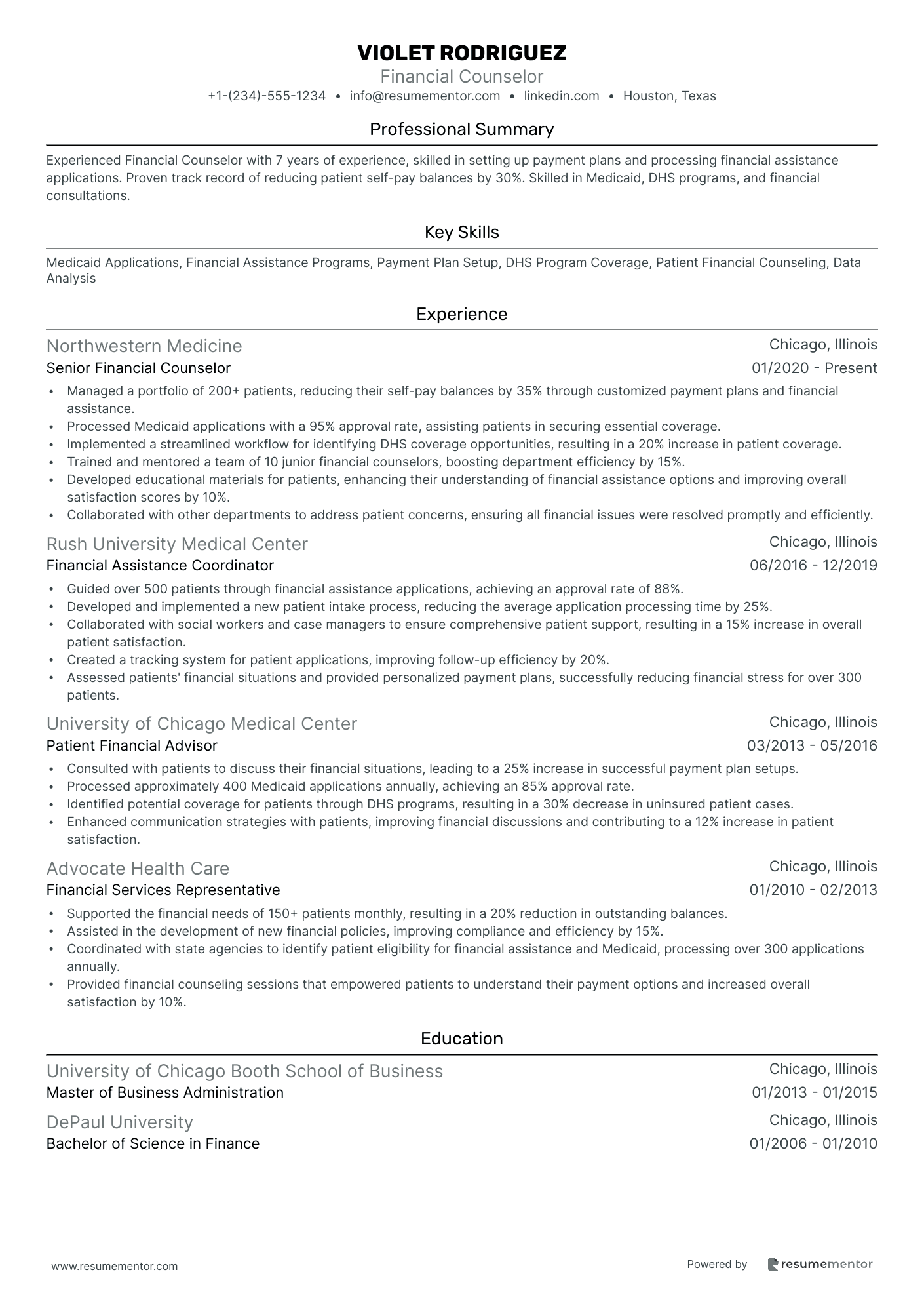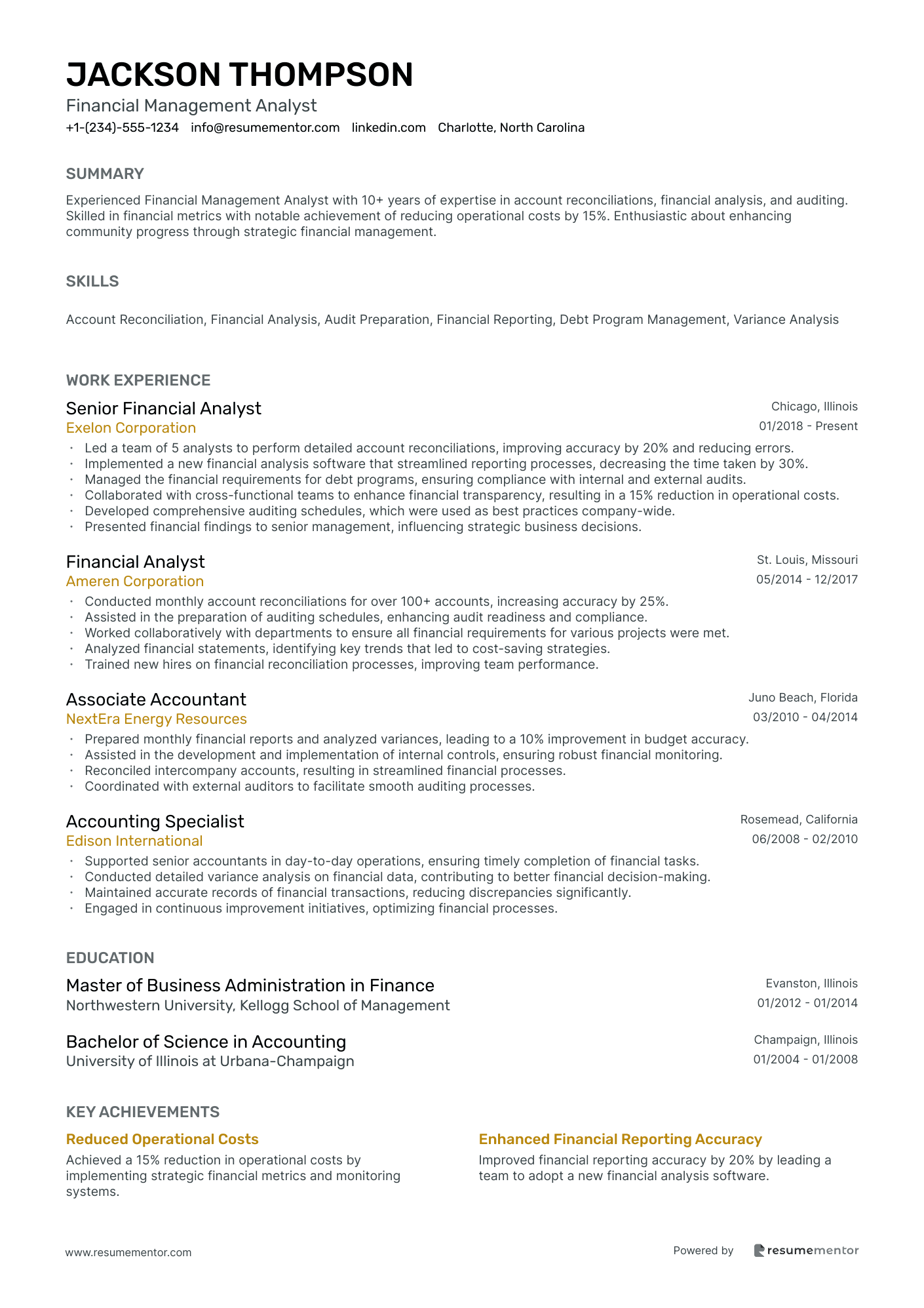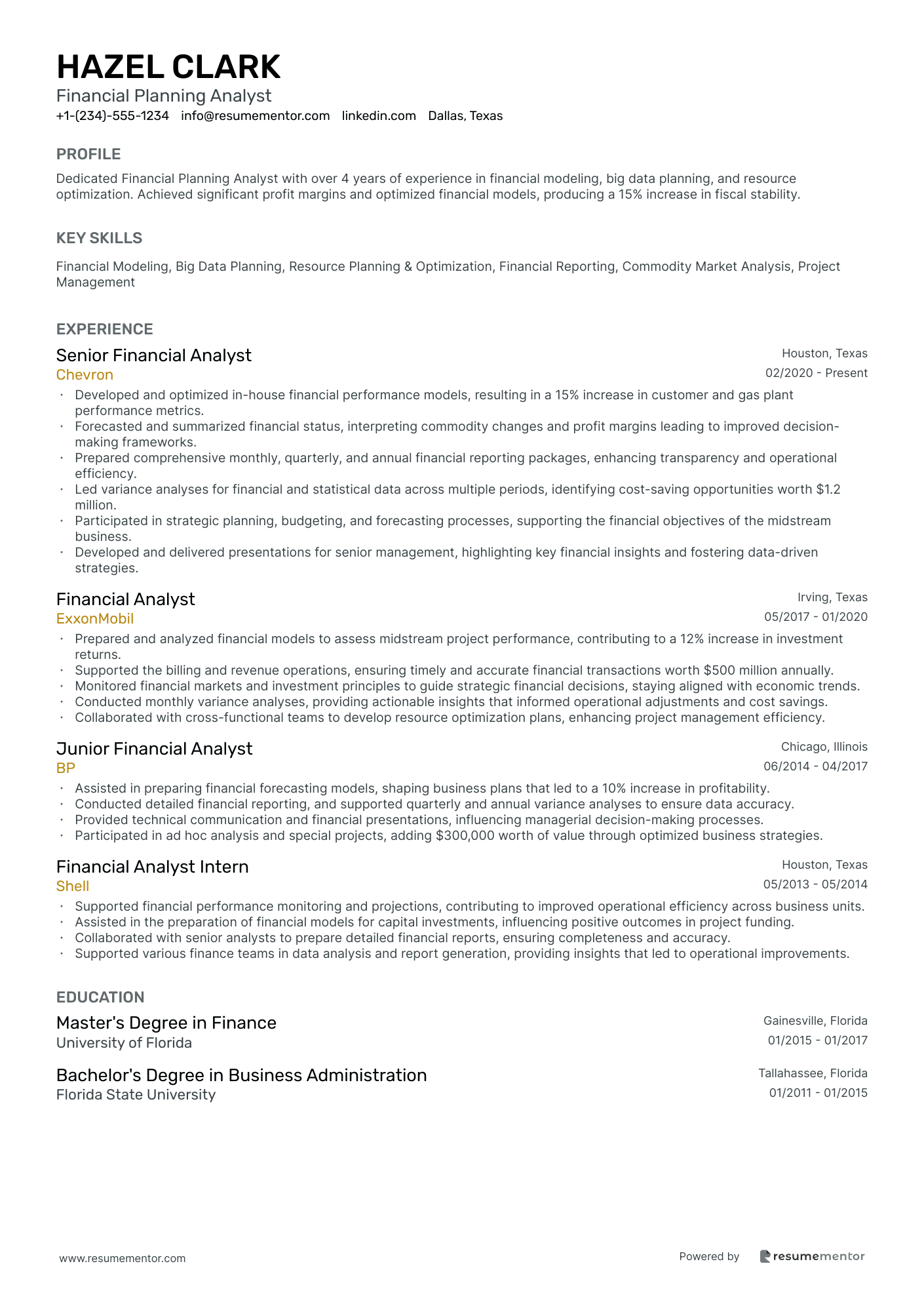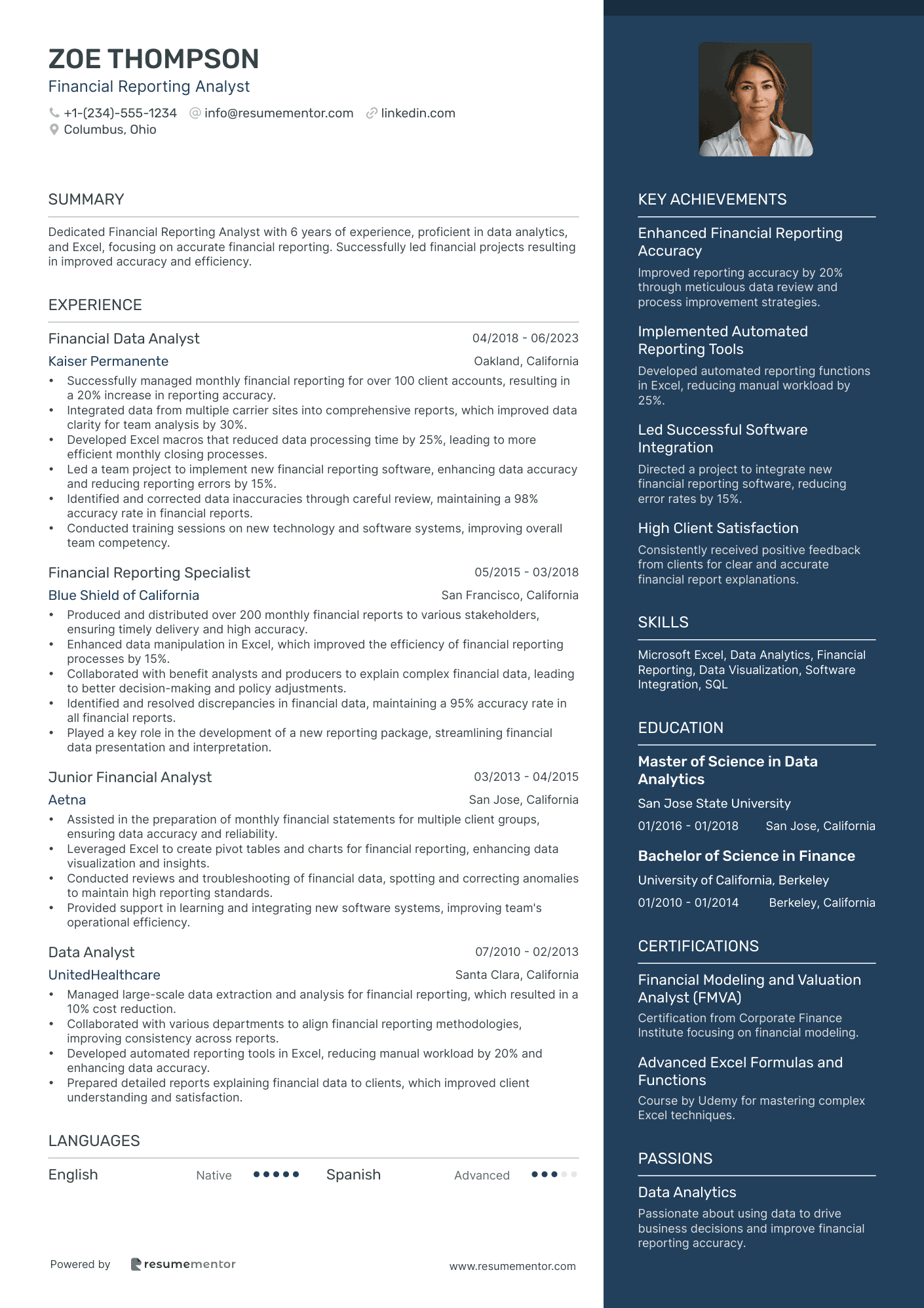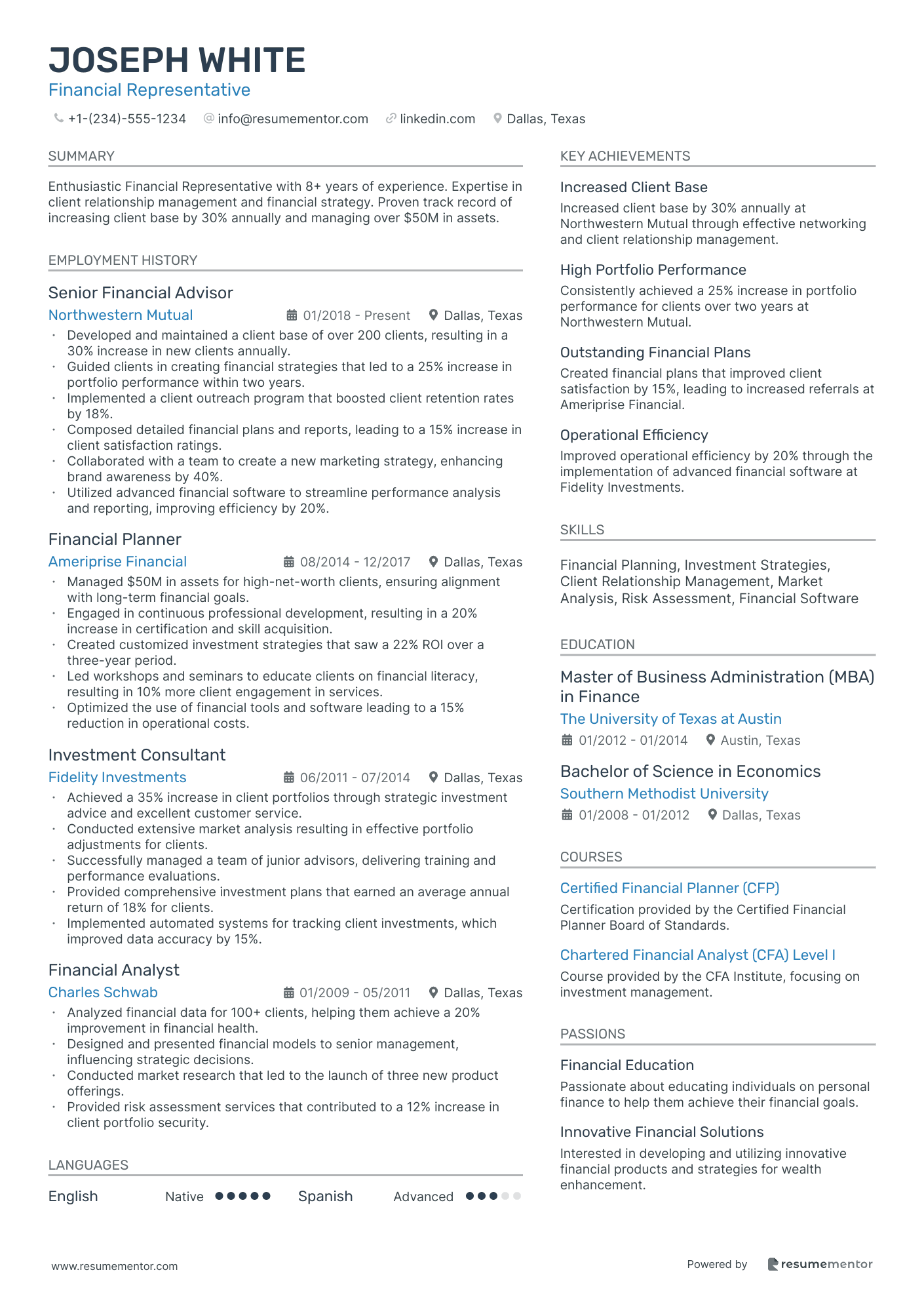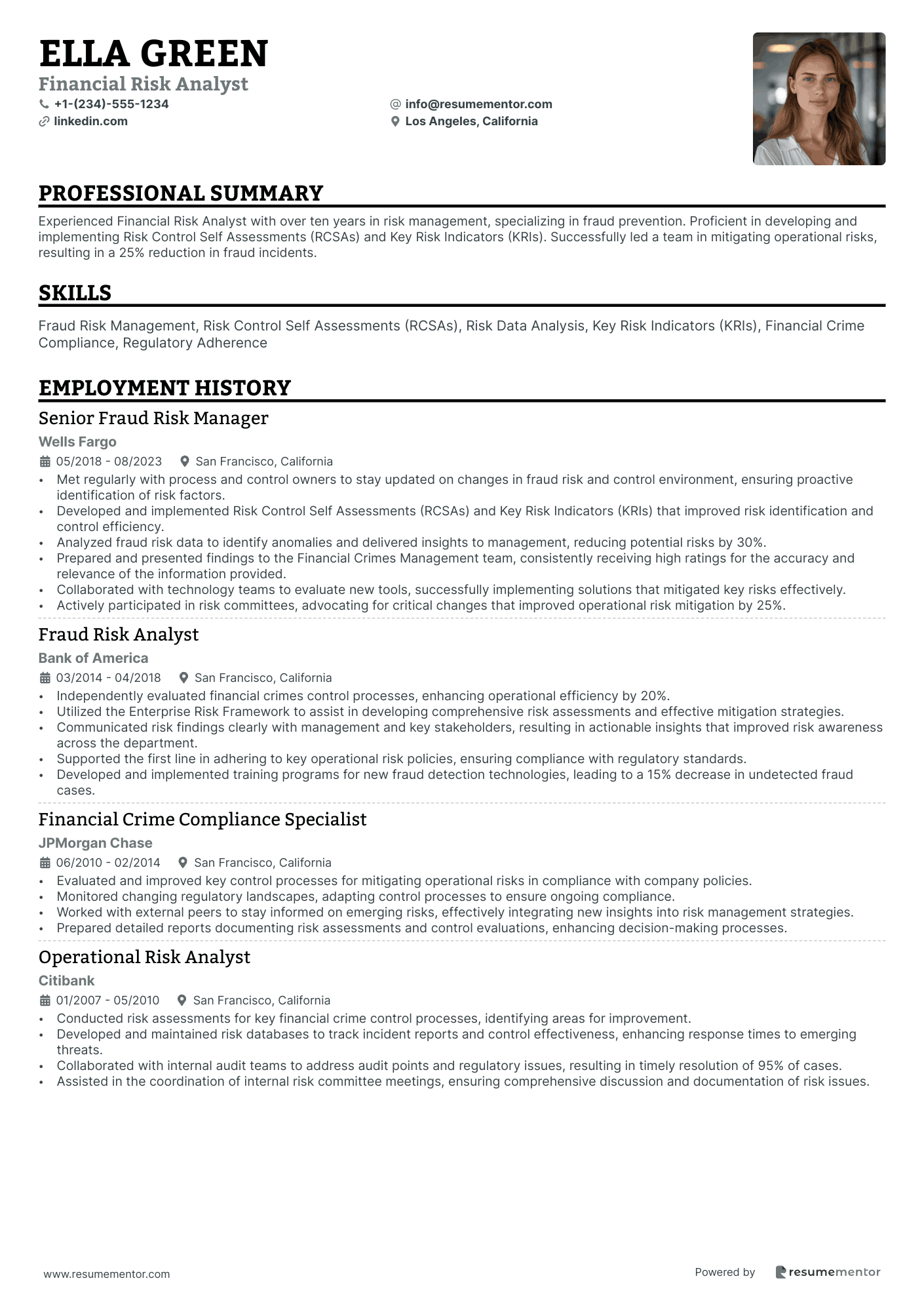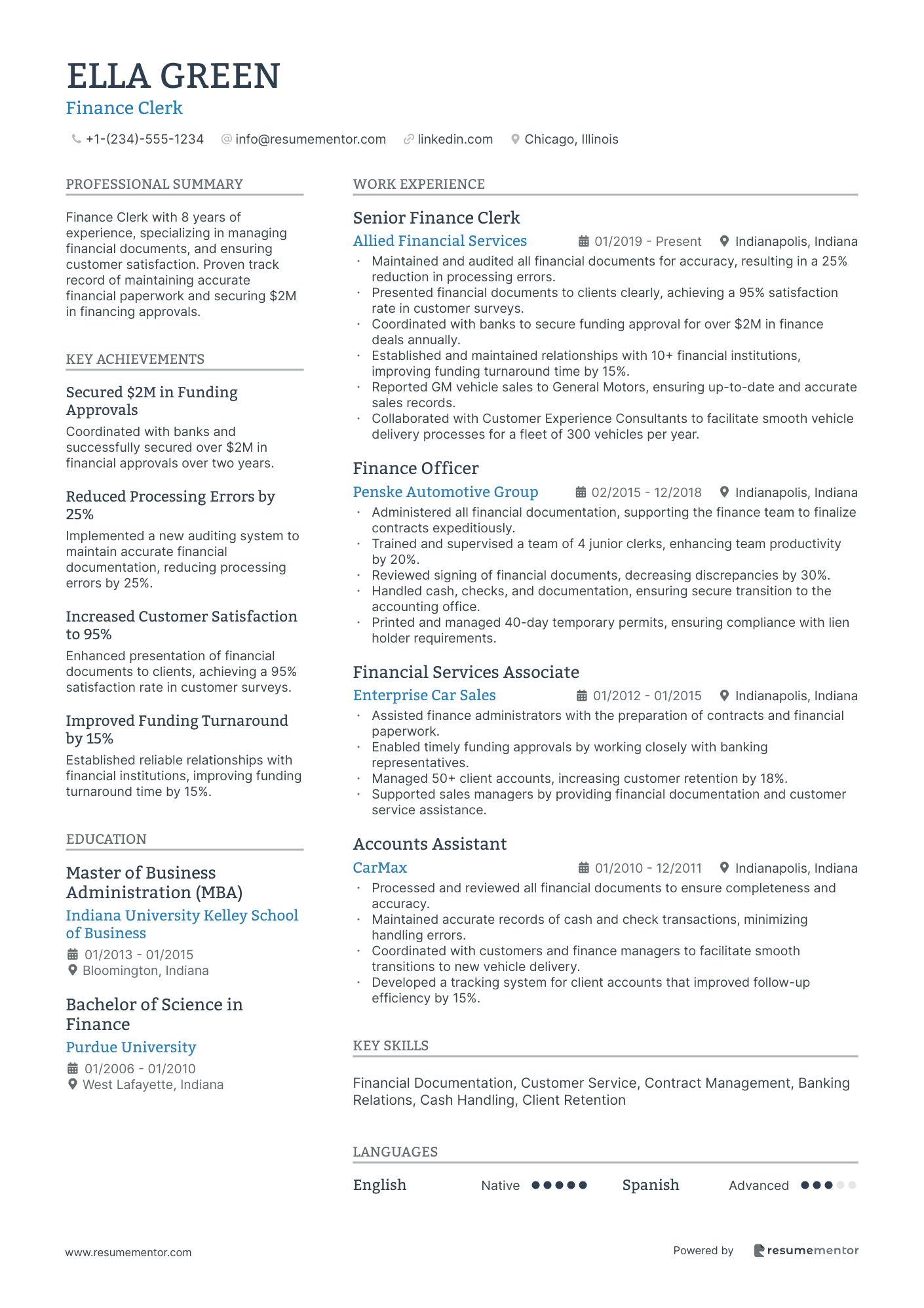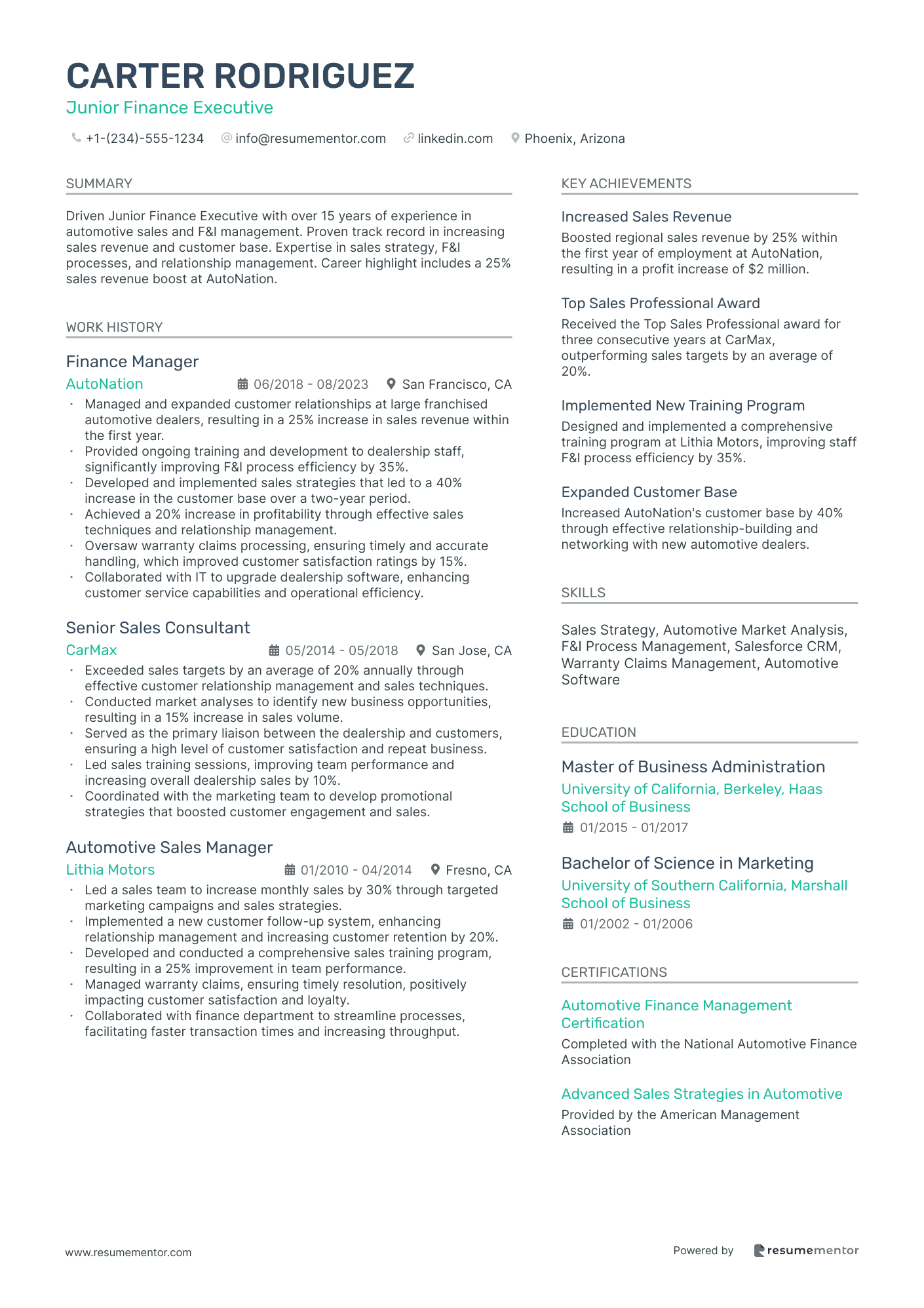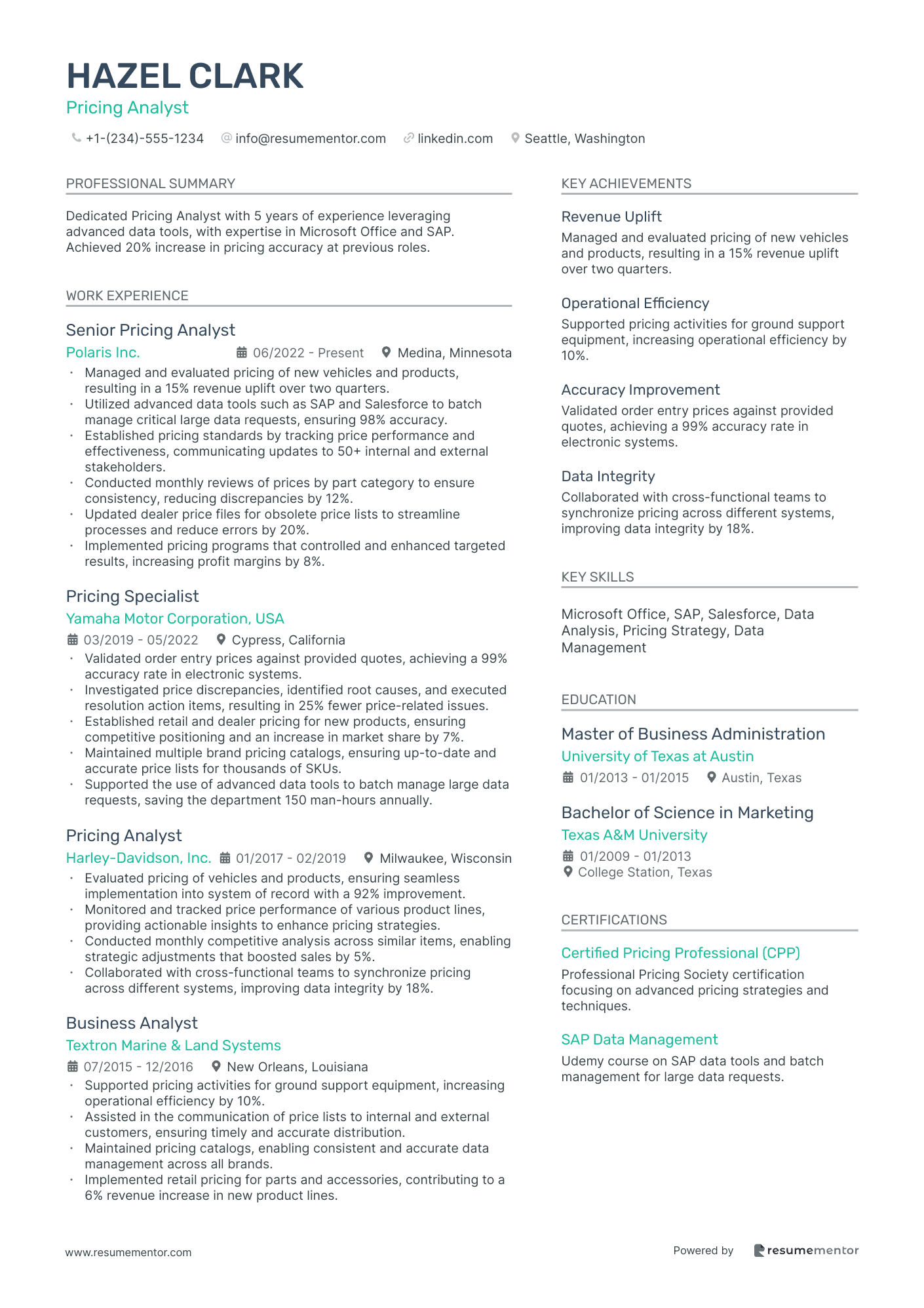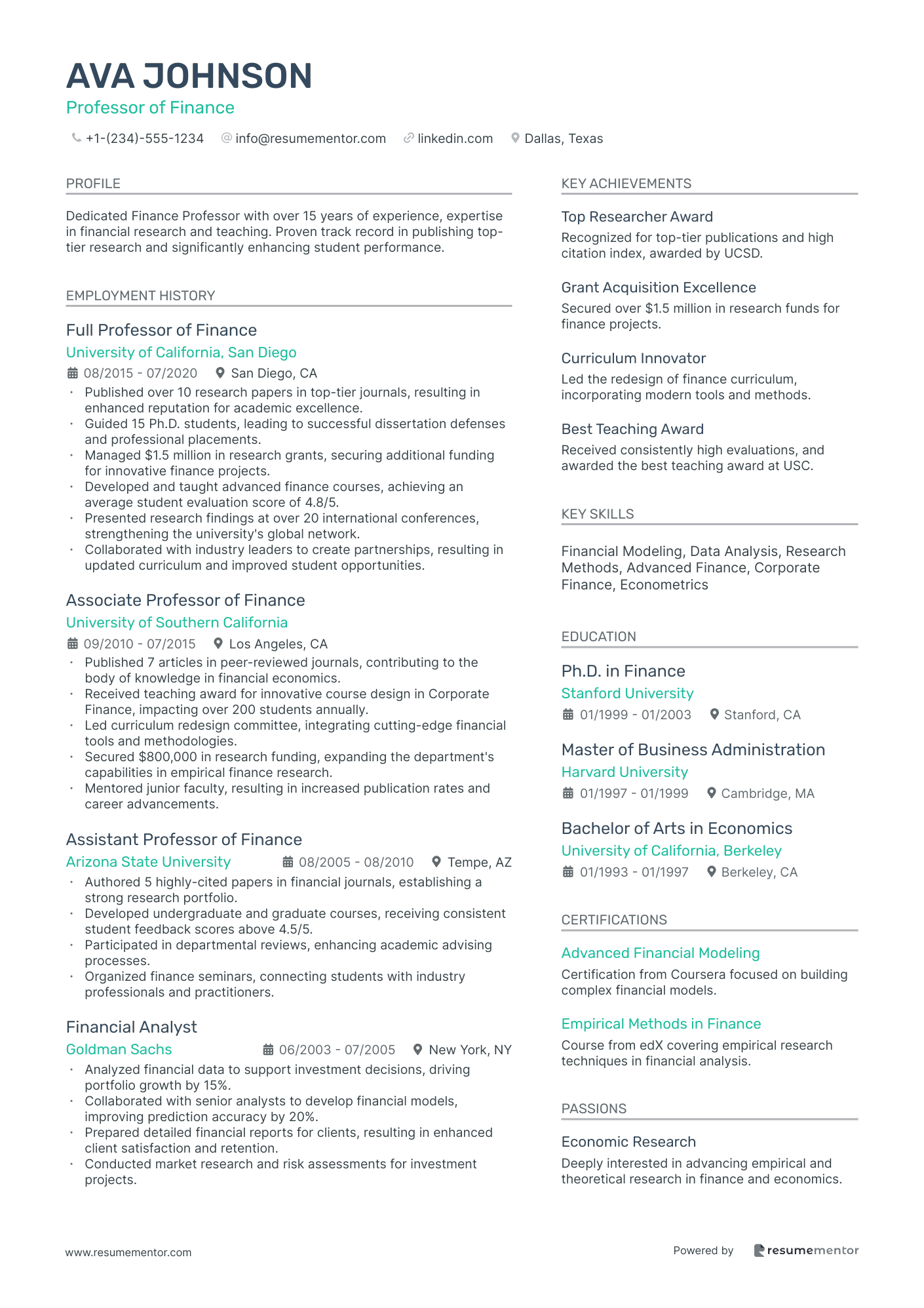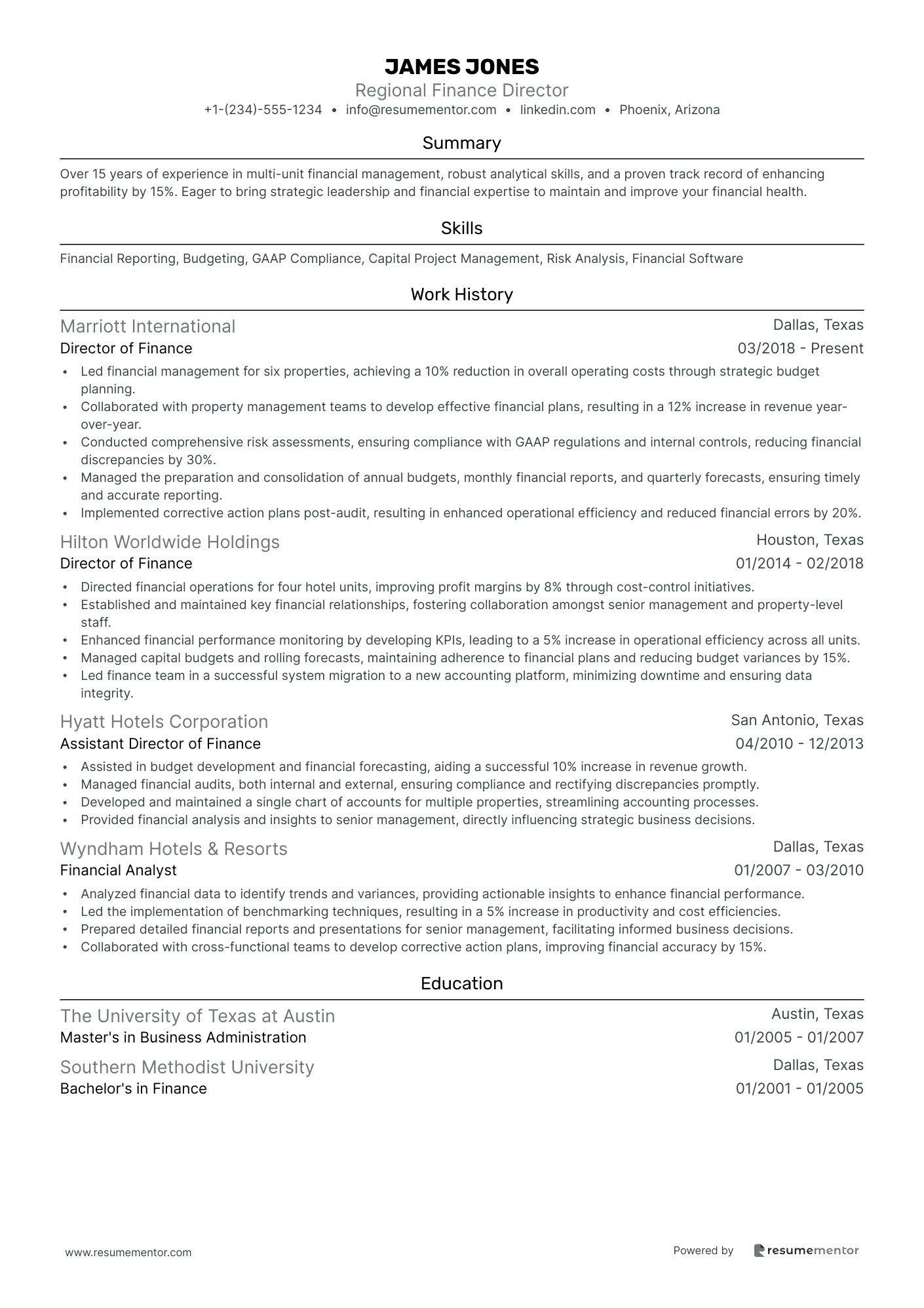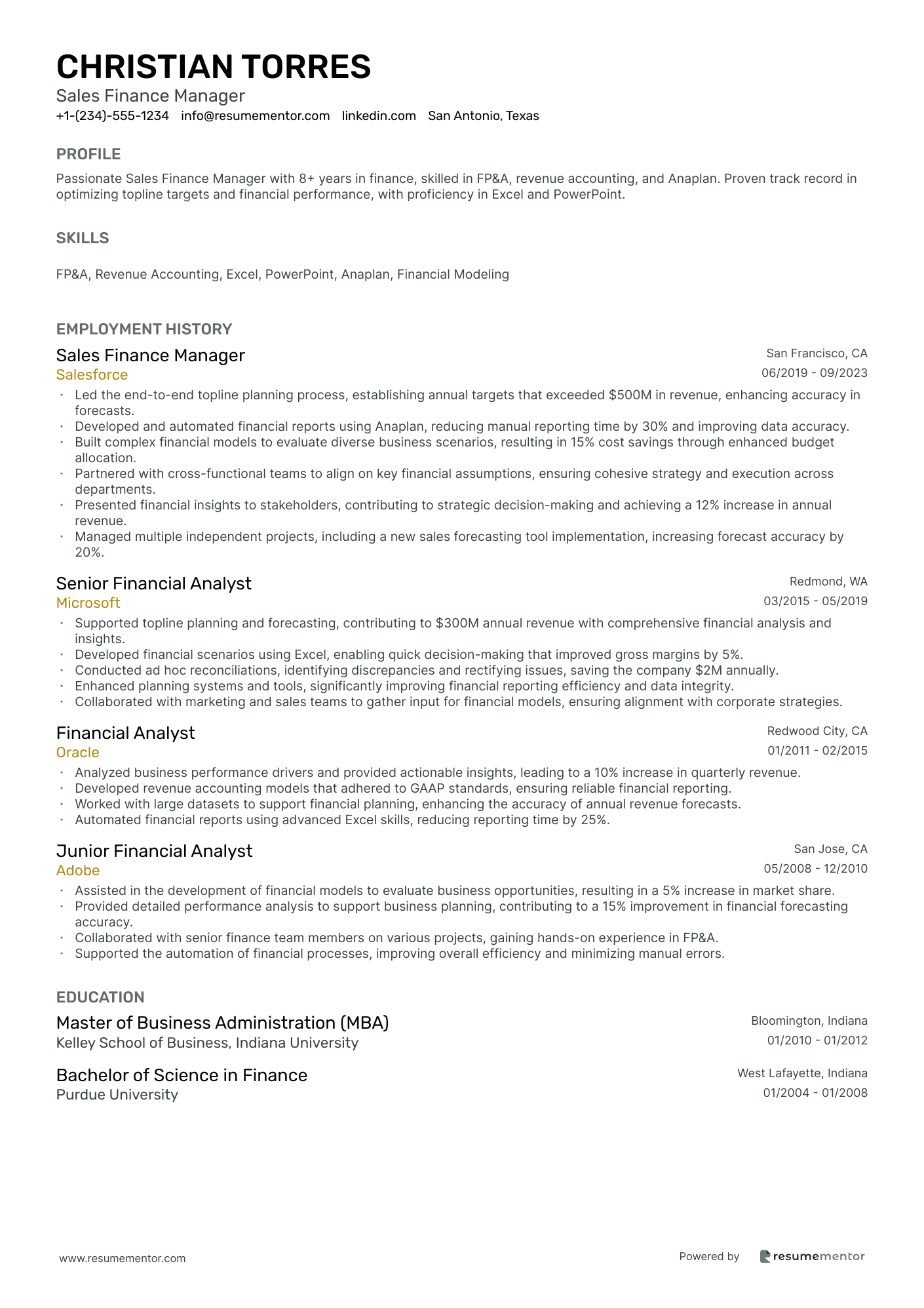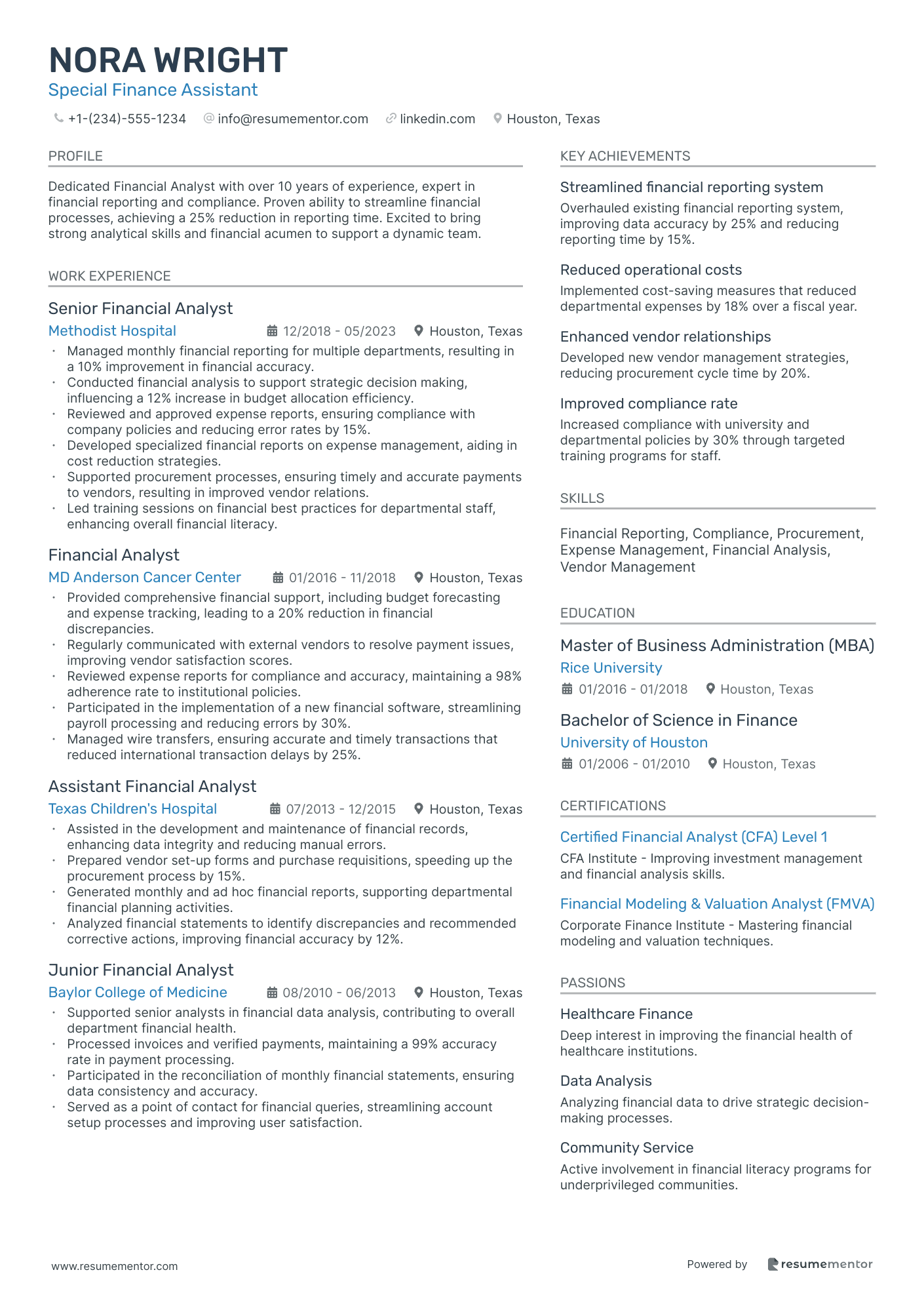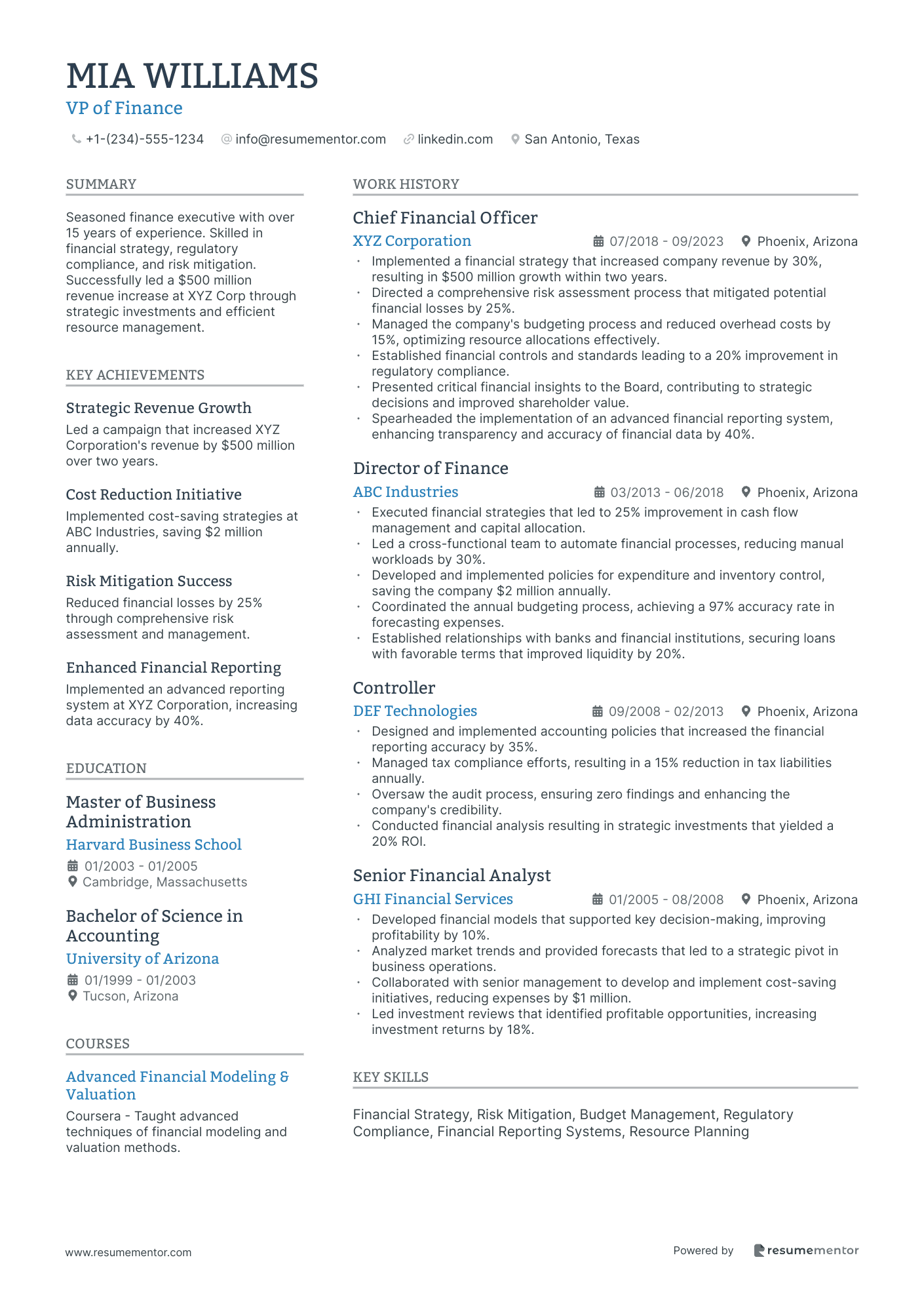42+ Finance Resume Examples

Jul 29, 2024
|
12 min read
Master your finance resume: Tips to showcase your wealth of experience and land your dream job in the finance sector.
Rated by 348 people

Finance Graduate resume sample
- •Developed and implemented financial models that resulted in a 25% increase in revenue through optimized resource allocation and cost-control measures.
- •Led cross-functional teams to streamline financial operations, reducing process time by 30% and increasing transparency.
- •Conducted due diligence for multiple acquisitions, successfully integrating new subsidiaries and expanding market reach by 20%.
- •Created strategic business plans leveraging renewable energy tax credits, maximizing profitability and cash flow by 15%.
- •Partnered with external accounting firms to enhance financial reporting accuracy, resulting in successful audits with zero material findings.
- •Supported the Country Manager by taking on additional responsibilities, fortifying the company's financial health in a dynamic environment.
- •Contributed to the development of digital finance solutions, improving data analytics capabilities by 40% and enhancing decision-making.
- •Enhanced budgeting processes, aligning them with the company's ambitious goals, which reduced budget variances by 10%.
- •Managed complex financial structures with multiple subsidiaries, leading to a 20% increase in efficiencies.
- •Created detailed financial forecasts and implemented tracking systems, resulting in a 15% improvement in financial predictability.
- •Initiated new partnerships and agreements, contributing to a 10% revenue growth in new markets.
- •Collaborated on financial models that led to a 15% reduction in operational costs through improved cost-tracking.
- •Assisted in the transition of financial operations from start-up to scale-up, improving scalability and readiness.
- •Managed cash flow and reporting, ensuring compliance and achieving a 10% improvement in cash management efficiency.
- •Facilitated joint ventures, leading to projects that contributed to a 7% increase in company profits.
- •Conducted financial analysis to support major projects, resulting in a timely completion and within budget for key initiatives.
- •Provided financial insights that led to the automation of reporting processes and a 20% time-saving.
- •Assisted in managing financial compliance, which led to zero penalties and improved regulatory adherence.
- •Contributed to financial reporting, enhancing the accuracy and reliability of data presented to stakeholders.
Finance Major resume sample
- •Generated monthly financial reports for senior management, leading to a 20% increase in decision-making efficiency.
- •Performed variance analysis, identifying cost-saving opportunities that resulted in a 15% reduction in operational expenses.
- •Managed the annual budget planning process, overseeing a budget of $50 million and ensuring timely approval and execution.
- •Led financial forecasting efforts using SAP, improving accuracy by 10% and enhancing strategic planning capabilities.
- •Coordinated with cross-functional teams to support execution of capital expenditure purchases worth up to $5 million.
- •Reviewed and updated human resources-related workflows, streamlining processes and reducing administrative overhead by 12%.
- •Assisted in the development and analysis of strategic business plans, contributing to a 25% growth in revenue over three years.
- •Supported preparation of consolidated quarterly financial outlooks and annual budgets, ensuring accuracy and compliance.
- •Monitored and analyzed key financial KPIs, providing actionable insights to divisional management.
- •Created and maintained detailed financial reports for internal and external stakeholders, enhancing transparency.
- •Reviewed account payable charges, identifying discrepancies and ensuring accurate financial reporting.
- •Supported the financial planning and reporting process, creating reports that improved stakeholder communication.
- •Monitored budget execution and provided insights to improve financial performance.
- •Reviewed and analyzed financial data to support strategic decision-making and operational efficiency.
- •Participated in monthly closing processes, ensuring accuracy and adherence to deadlines.
Manufacturing Finance Manager resume sample
- •Developed and implemented financial performance metrics, reducing operational costs by 15% resulting in $1.2M annual savings.
- •Created financial models for 'what if' scenarios, significantly enhancing strategic decision-making processes and new product development.
- •Collaborated with cross-functional teams to evaluate data and analyze future financial performance, resulting in 10% improvement in forecasting accuracy.
- •Researched economic trends to support strategic financial planning, contributing to a 20% increase in annual revenue.
- •Developed comprehensive operating forecasts, leading to a 5% reduction in budget variances.
- •Orchestrated financial evaluations of new product transfers, streamlining operations and increasing productivity by 8%.
- •Prepared and analyzed financial plans for multiple projects, enhancing project efficiency and reducing overspend by 12%.
- •Monitored and reported on financial performance metrics, identifying key performance drivers to improve profitability by 8%.
- •Led strategic financial planning sessions, enabling data-driven decisions that resulted in a 15% increase in productivity.
- •Executed in-depth analysis of financial performance, providing recommendations that improved operational efficiency by 10%.
- •Collaborated with manufacturing teams to streamline financial processes, achieving a 7% reduction in production costs.
- •Conducted financial forecasting and budgeting, reducing budget deviations by 6% across multiple manufacturing units.
- •Developed reports on economic progressions, aiding in more accurate financial planning and decision-making.
- •Analyzed manufacturing operations data to identify cost-saving opportunities, resulting in a 5% decrease in operational costs.
- •Partnered with the supply chain team to develop financial models that enhanced inventory management efficiency by 8%.
- •Gained extensive experience in financial analysis and modeling, contributing to more accurate forecasting and planning.
- •Collaborated with senior management to gather and analyze financial data, supporting strategic planning initiatives.
- •Prepared comprehensive financial reports that provided insights into performance trends and drove improved decision-making.
- •Assisted in developing financial plans for new product initiatives, enhancing growth and profitability for the manufacturing plant.
Public Sector Finance resume sample
- •Represented over 20 municipalities in securing $500M in tax-exempt bonds, achieving funding for crucial infrastructure projects.
- •Led a team in drafting and negotiating bond documents for complex financing deals, resulting in 20% faster approval time.
- •Advised on tax-exempt financing strategies and compliance, ensuring adherence to state and federal regulations.
- •Developed client reports on securities law compliance, reducing instances of non-compliance by 15%.
- •Collaborated with associates and partners on economic development matters, contributing to a 30% increase in annual client satisfaction.
- •Advised counties and regional districts on tax abatement policies, resulting in $100M in tax incentives for local businesses.
- •Handled over 50 bond transactions, effectively negotiating terms that saved clients an estimated $200K in costs.
- •Conducted legal research on tax increment financing statutes, offering novel solutions for five development projects.
- •Authored legal opinions and security documents, maintaining a 98% accuracy rate in compliance reviews.
- •Led cross-functional teams in managing client portfolios, enhancing operational efficiency by 25%.
- •Assisted in the successful issuance of $1B in municipal bonds, supporting city improvements.
- •Drafted and reviewed bond documents and tax certificates, improving document accuracy by 15%.
- •Provided legal counsel on securities law to various public entities, ensuring compliance and minimizing legal risks.
- •Collaboratively worked on public finance matters, contributing to an increase in team efficiency by 20%.
- •Conducted financial analysis for municipal bonds, providing valuable data that influenced investment ratings.
- •Prepared comprehensive reports on bond market trends, aiding investment decisions.
- •Developed models to evaluate tax-exempt financing options, facilitating $200M in investment-grade bonds.
- •Assisted in the assessment of economic development projects, leading to a 10% improvement in investment decisions.
Automotive Finance Manager resume sample
- •Consistently closed over 70 deals per month in a competitive market, contributing to a 15% increase in monthly sales revenue.
- •Managed relationships with over 20 lenders, securing favorable financing options for clients, improving loan approval rates by 25%.
- •Trained and mentored a team of junior finance managers, improving team productivity by 40% within the first six months.
- •Implemented a new CRM system, resulting in a 30% reduction in response times and a 20% increase in customer satisfaction ratings.
- •Conducted daily follow-ups with active and prior customers, expanding our referral base and repeat business by 35%.
- •Ensured all finance and lease deals were funded within 5 business days, optimizing cash flow and dealership efficiency.
- •Closed 60+ deals monthly and maintained high customer satisfaction scores, driving a 10% year-over-year growth in financed vehicles.
- •Effectively explained finance and insurance products to customers, achieving a 40% penetration rate for extended warranties.
- •Developed strong lender relationships, enhancing the dealership's ability to offer competitive financing rates and terms.
- •Led daily sales meetings to review performance and develop strategic plans, boosting team morale and performance results.
- •Maximized gross profit per deal by 15% through effective up-selling of finance and insurance products.
- •Processed loan, tag, and title documents efficiently, decreasing documentation errors by 20% and improving customer satisfaction.
- •Consistently ensured all deals were funded within 7 business days, resulting in improved dealership cash flow.
- •Responsible for meeting dealership sales goals, leading to a 25% increase in overall department sales.
- •Facilitated training sessions for sales staff on finance and insurance products, improving overall product knowledge and sales effectiveness.
- •Maintained a high Customer Satisfaction Index (CSI) score, resulting in increased customer loyalty and repeat business.
- •Engaged in ongoing professional development and business development activities to stay abreast of industry standards.
- •Assisted client advisors in the closing of automotive transactions, contributing to a seamless and efficient sales process.
- •Ensured compliance with federal, state, and local regulations affecting vehicle purchase and finance operations.
Business Finance Analyst resume sample
- •Led monthly and quarterly financial analysis, revealing critical insights that contributed to a 25% increase in regional profitability.
- •Developed and maintained production and P&L analysis files, resulting in more accurate forecasting and planning cycles.
- •Identified and resolved booking errors through detailed monitoring, thereby reducing discrepancies by 30%.
- •Collaborated with underwriting leadership to construct annual plans, improving planning accuracy by integrating 10 key metrics.
- •Compiled data from multiple internal systems to investigate forecasting variances, aiding in refining future financial strategies.
- •Prepared executive summaries for senior management, enabling timely strategic decisions that enhanced operational efficiency.
- •Supported underwriting and branch management with relevant metrics, streamlining operations and increasing efficiency by 15%.
- •Monitored production results and identified potential errors, leading corrective actions that improved accuracy by 20%.
- •Built comprehensive annual plan files in collaboration with IT, analytics, and actuarial departments.
- •Input plan and forecast data into TM1, updating as needed, ensuring a 98% accuracy rate in financial records.
- •Enhanced data quality by working closely with operations to resolve discrepancies, improving the integrity of performance reports.
- •Supported financial planning and analysis, contributing to a 12% increase in quarterly revenue growth.
- •Created and maintained weekly reporting files, providing detailed insights into production and profitability.
- •Assisted in variance analysis between plans and actual results, leading to more informed forecasting adjustments.
- •Collaborated with IT and operations to enhance data reporting accuracy and streamline financial processes.
- •Performed detailed financial analyses to support decision-making processes, leading to a 10% improvement in budget adherence.
- •Developed periodic reports summarizing production results and financial performance for management review.
- •Identified booking errors through meticulous review, leading to corrective actions and a reduction of discrepancies by 15%.
- •Supported team projects focused on improving data quality and resolving financial reporting issues.
Finance Team Lead resume sample
- •Led a team of analysts in a project that resulted in a 15% increase in profitability through strategic cost-cutting initiatives.
- •Developed complex financial models to evaluate mergers and acquisitions, providing actionable insights to senior management.
- •Synthesized financial data into executive-level presentations that informed business unit strategy and decision-making processes.
- •Proactively identified market trends and guided business partners in formulating strategies, resulting in a 20% growth in market share.
- •Collaborated with cross-functional teams to drive large-scale projects, ensuring alignment with corporate goals and successful project completion.
- •Performed in-depth financial analysis to solve pressing business challenges, directly impacting corporate strategy and resource allocation.
- •Led multifaceted financial projects, contributing to a 10% reduction in operational costs for clients.
- •Developed comprehensive financial scenarios and recommendations, enabling clients to make informed decisions.
- •Collaborated with executives to tailor financial insights to their strategic needs, resulting in enhanced business strategies.
- •Conducted detailed market analysis, assisting clients in identifying growth opportunities and competitive advantages.
- •Managed large-scale data analysis projects, ensuring timely delivery of actionable financial insights and recommendations.
- •Developed financial models to assess investment opportunities, directly impacting investment decisions.
- •Synthesized large data sets and presented findings to executive leadership, aiding in strategic decision-making.
- •Led a financial analysis project that resulted in a 12% improvement in operational efficiency.
- •Built strong relationships with leadership, providing proactive insights that anticipated key business questions.
- •Analyzed financial trends to provide strategic recommendations to clients, resulting in a 10% increase in client satisfaction.
- •Implemented financial models that identified cost-saving opportunities, contributing to a 5% reduction in overhead.
- •Assisted in the preparation of executive-level financial reports, enhancing visibility into financial performance.
- •Coordinated with diverse teams to ensure the accuracy and relevance of financial analysis in client projects.
Merchant Finance Credit Analyst resume sample
- •Spearheaded the budget development and quarterly sales forecasts, achieving a 10% reduction in variance.
- •Partnered with merchandising teams to deliver analytical insights and recommendations, resulting in a 15% increase in profitability.
- •Developed financial models and reporting tools that improved accuracy of sales and margin tracking by 20%.
- •Implemented new technologies and process improvements that increased team efficiency by 25%.
- •Led financial analysis for special merchandise projects, ensuring successful project completion within budget.
- •Presented complex financial data in an understandable format to executives, facilitating data-driven decision-making.
- •Created financial models for merchandize sales and margin, contributing to a 12% growth in annual revenue.
- •Managed budget planning and forecasting processes, reducing planning cycle time by 15%.
- •Conducted detailed financial analysis to uncover business trends, aiding in a 10% improvement in profitability.
- •Supervised the adoption of new analytical tools and technologies, enhancing accuracy of financial reporting.
- •Built strong relationships with merchandising teams to streamline financial operations and achieve strategic goals.
- •Assisted in developing annual budgets and quarterly forecasts, improving forecasting accuracy by 8%.
- •Provided financial insights and analytical support for merchandising projects, achieving a successful project completion rate of 95%.
- •Analyzed sales and margin metrics, identifying key drivers of business performance.
- •Collaborated with technical teams to enhance financial reporting capabilities and streamline processes.
- •Conducted financial analyses that helped identify cost-saving opportunities, reducing expenses by 7%.
- •Supported budgeting and forecasting processes, contributing to a 5% improvement in financial accuracy.
- •Developed and presented financial presentations to senior management, aiding strategic planning decisions.
- •Identified and mitigated financial risks, resulting in improved financial stability.
Accounts and Finance Manager resume sample
- •Managed financial aspects of development programs, yielding a 15% increase in ROI over two years.
- •Collaborated with cross-functional teams to establish cost targets for suppliers, achieving a 12% reduction in procurement costs.
- •Executed monthly financial updates for top management, resulting in clear insights that guided strategic decision-making.
- •Developed new business plans leading to the acquisition of three high-profile clients, adding $5M in annual revenue.
- •Controlled development spending, uncovering $2M in potential savings through efficient budget management.
- •Led project finance meetings, ensuring alignment of financial goals across all departments.
- •Directed financial planning for product costing and pricing, enhancing profitability by 10% on new product lines.
- •Supported customer financial strategies and evaluated business cases, successfully negotiating contracts worth $8M.
- •Analyzed complex bill of materials, identifying cost drivers and implementing cost-saving measures that reduced expenses by 6%.
- •Oversaw financial aspects of project launches, ensuring adherence to budgetary constraints and financial readiness.
- •Initiated and supported product cost reduction efforts, achieving a $1M reduction in material costs annually.
- •Evaluated and prepared business cases, generating financial metrics that improved return on investments by 8%.
- •Conducted cost estimations for new quotations, strengthening customer relations and securing ongoing business.
- •Collaborated with manufacturing teams to understand and reduce cost drivers, enhancing overall product margin.
- •Prepared detailed financial reports for program reviews, facilitating executive-level decision-making.
- •Assisted in the preparation of financial updates, providing critical data for monthly management meetings.
- •Worked with engineering teams to set cost targets, contributing to a cost reduction of 5% in initial project phases.
- •Supported product pricing strategies by conducting detailed market and competitor analysis.
- •Monitored development spending, identifying discrepancies and ensuring alignment with budget forecasts.
Assistant Finance Director resume sample
- •Led the annual budget formulation process for a $150M municipal budget, ensuring proper fund allocation and compliance with financial regulations.
- •Directed annual financial audits, achieving zero discrepancies for three consecutive years, resulting in improved financial transparency.
- •Oversaw payroll, accounting, and accounts payable functions, increasing operational efficiency by 20% through process optimization.
- •Developed comprehensive financial reports and presentations, simplifying complex data for senior management and council members.
- •Implemented Tyler Munis Financials, enhancing system integration and financial data accuracy for multi-department use.
- •Managed a team of 10 finance professionals, fostering a collaborative environment and conducting performance reviews.
- •Facilitated the preparation of the County’s Comprehensive Annual Financial Report (CAFR), earning the GFOA Certificate of Achievement for Excellence in Financial Reporting.
- •Supervised the accounting team responsible for monthly reconciliations and financial statement preparations, maintaining a 99% accuracy rate.
- •Played a pivotal role in the transition to a new Enterprise Resource Planning (ERP) system, reducing implementation time by 25%.
- •Provided financial analysis for various capital projects, supporting budgetary allocations and securing additional funding.
- •Collaborated with risk management to improve financial reporting related to insurance claims and liability tracking.
- •Managed the monthly closing process, ensuring all financial data was accurate and in compliance with GAAP standards.
- •Generated and analyzed financial reports, aiding in strategic planning and decision-making for department heads.
- •Conducted internal audits to identify and mitigate financial risks, leading to a 15% improvement in internal controls.
- •Trained and mentored junior accountants, improving team performance and promoting professional growth.
- •Assisted in the preparation of annual budget documents, ensuring compliance with state and federal regulations.
- •Performed monthly bank reconciliations, maintaining a 98% reconciliation accuracy rate.
- •Handled accounts payable and receivable functions, optimizing payment and collection processes.
- •Supported senior accountants with financial analysis and reporting tasks, contributing to improved financial decision-making.
Budget Analyst resume sample
- •Led the development and execution of multiple budget plans, increasing financial reporting accuracy by 15%.
- •Ensured availability and appropriate allocation of funds for various expenditures, maintaining a compliance rate of 100%.
- •Monitored and reviewed obligations and commitments, ultimately reducing budget variances by 8%.
- •Executed funds through GFEBS as per fiscal laws and regulations, achieving a 98% adherence rate.
- •Consolidated and submitted specialized budget reports covering expenses and obligations, increasing transparency.
- •Advised staff on fund statuses, enhancing interdepartmental financial forecasting by 10%.
- •Monitored and evaluated fund obligations, ensuring expenditures were within allocated budgets, reducing overspending incidents by 20%.
- •Participated in mid-year and year-end budget reviews, uncovering potential savings of $2 million.
- •Prepared comprehensive reports on the status of funds, aiding senior management in strategic decision-making.
- •Ensured all budgetary transactions complied with authorized policies and procedures, achieving a 100% compliance rate.
- •Collaborated on a cross-functional team to streamline the year-end budget closeout process, resulting in full utilization of expiring resources.
- •Assisted in the preparation and analysis of budget estimates, contributing to a 10% increase in budgeting accuracy.
- •Reviewed budget requests to ensure funds were available and aligned with organizational goals, preventing overspending.
- •Generated various financial reports detailing expenses, aiding in efficient fund management.
- •Conducted compliance checks on budgetary transactions, maintaining adherence to fiscal policies.
- •Contributed to mid-year and year-end fund status reviews, finding optimized funding allocations for upcoming projects.
- •Compiled and summarized data concerning object class information for budget formulation, aiding in accurate budget estimates.
- •Monitored fund obligations and commitments, ensuring expenditures aligned with budgetary constraints.
- •Prepared recurring budget reports, covering the status of funds and obligations, improving fiscal transparency.
- •Advised different departments on fund status, promoting better fiscal discipline across the organization.
Certified Financial Planner resume sample
- •Managed finances for high net-worth clients, growing portfolio by 30% over a 4-year period.
- •Provided in-depth financial analysis, including cash flow and retirement planning, resulting in increased client trust and retention.
- •Developed customized tax strategies, saving clients an average of 15% annually on personal income taxes.
- •Led business development efforts, securing 20 new high net-worth clients through targeted initiatives.
- •Directed special projects, such as real estate planning and employee benefits counseling, tailored to unique client needs.
- •Conducted comprehensive estate reviews, ensuring clients’ documents, including wills and trusts, were up-to-date and legally secure.
- •Developed and implemented customized financial plans, achieving client financial goals 60% faster on average.
- •Advised on diverse financial matters, including stock options and education financing, improving client financial literacy and decision-making.
- •Conducted detailed portfolio reviews and performance analyses, optimizing client investments and increasing returns by 25%.
- •Formulated tax-efficient gifting strategies, helping clients donate over $1.5M annually while minimizing tax impact.
- •Created relationship management plans, nurturing 15 prospective clients into active, long-term relationships.
- •Served as a primary advisor to high net-worth clients, managing $50M+ in assets.
- •Provided comprehensive financial advisement on estate structure, resulting in an optimized estate plan for 100% of clients.
- •Led initiatives to evaluate and improve client insurance portfolios, ensuring robust coverage and financial security.
- •Coordinated special financial projects, including career and business planning, tailored to executive clients’ needs.
- •Performed detailed financial condition analyses, enhancing accuracy by implementing advanced analytic models.
- •Assisted clients in navigating real estate investments, resulting in a 20% improvement in portfolio diversification.
- •Provided retirement analysis and planning services, increasing the success rate of meeting retirement goals by 30%.
- •Reviewed and updated client wills, trusts, and powers of attorney, ensuring legal compliance and peace of mind.
Corporate Finance Manager resume sample
- •Managed IT capital budgets totaling over $15M, ensuring accurate budgeting and forecasting for corporate IT departments, leading to a 10% reduction in variance.
- •Investigated and resolved billing discrepancies for contractor activity, resulting in accurate accruals and reducing errors by 15%.
- •Reviewed cloud hosting usage reports and prepared month-end accruals for expenses, achieving 100% compliance with corporate financial policies.
- •Directed the purchase order process and prepared accruals for incurred expenses, streamlining operations and reducing PO cycle time by 20%.
- •Collaborated with tax and technical accounting teams for proper accounting treatment of IT spend, enhancing financial accuracy and compliance.
- •Prepared and presented monthly IT reporting package for CIO review at CEO meetings, contributing to data-driven decision-making.
- •Assisted in maintaining IT operating budgets of over $12M, ensuring alignment with financial strategies and goals, resulting in a 5% budget adherence improvement.
- •Reconciled balance sheet accounts related to SaaS and prepared monthly amortization entries, increasing financial accuracy by 10%.
- •Reviewed and accrued professional fees for consultant and fixed-fee managed service contracts, reducing outstanding invoices by 20%.
- •Managed vendor relationships, ensuring timely invoice processing and accurate expense tracking for IT hardware and software purchases.
- •Participated in the review and analysis of various balance sheet accounts, ensuring comprehensive reconciliation and financial reporting.
- •Led the preparation of quarterly and annual work-papers and reconciliations for auditors, ensuring compliance and accuracy in financial reporting.
- •Oversaw the maintenance of capital and SG&A accounts, resulting in optimized spend analysis and accurate financial insights.
- •Reviewed and accrued expenses for various IT contracts, ensuring proper accounting throughout the project lifecycle.
- •Assisted in financial planning and execution of special projects, providing crucial support to the IT finance team.
- •Conducted variance analysis against budget and forecast for IT departments, providing insights for strategic financial decision-making.
- •Prepared monthly IT expense reports, ensuring accurate documentation and compliance with accounting standards.
- •Collaborated with cross-functional teams to ensure accurate financial tracking and reporting for IT projects.
- •Maintained proper documentation for financial processes, enhancing transparency and audit-readiness.
Deputy Finance Manager resume sample
- •Directed annual budget planning and forecasting processes, leading to a 10% reduction in overall operational costs.
- •Supervised a team of 10 finance professionals, enhancing productivity by 15% through training and performance evaluations.
- •Executed comprehensive financial analysis, identifying trends and providing actionable insights, resulting in a 20% increase in revenue.
- •Implemented advanced accounting software, which improved financial reporting accuracy by 25%.
- •Coordinated external audits, significantly reducing audit issues by 30%.
- •Managed cash flow and liquidity, ensuring optimal financial health with a 12% increase in cash reserves.
- •Led the financial planning team in creating reports and budgets for various departments, resulting in a 15% improvement in financial performance.
- •Managed payroll and accounts payable processes, ensuring 100% accuracy and compliance.
- •Oversaw successful implementation of capital improvement projects worth $5 million.
- •Developed complex financial models to support strategic business decisions, increasing project approval rates by 25%.
- •Collaborated with senior management to monitor and control departmental spending, resulting in a 10% cost reduction.
- •Prepared detailed financial reports and conducted data analysis to support project financing and cost control efforts.
- •Assisted in the development and monitoring of annual budgets totaling over $50 million.
- •Coordinated with external auditors to ensure compliance, reducing audit findings by 40%.
- •Managed monthly reconciliation of bank statements and cash balances with zero discrepancies.
- •Implemented internal controls improving financial accuracy and reducing errors by 15%.
- •Conducted quantitative analysis of financial data for clients, leading to actionable insights and strategic decisions.
- •Supported senior analysts with budgeting and forecasting, contributing to improved financial planning.
- •Assisted in the preparation of financial statements and annual reports, enhancing compliance by 20%.
- •Participated in audit preparations, ensuring accuracy and timeliness of required documentation.
Entry-level Finance resume sample
- •Designed advanced financial spreadsheets for annual budgeting and monthly variance analysis, leading to a 15% reduction in budget variances.
- •Performed monthly financial summaries for principal investigators, providing guidance to ensure accounts stayed within budget limits.
- •Led the reconciliation process between Northwestern Medicine and healthcare networks, resolving discrepancies efficiently.
- •Investigated and reallocated unidentified expenses, effectively saving the department $30,000 annually.
- •Prepared the annual budget package, ensuring timely and accurate financial submissions.
- •Handled sensitive cardholder information, processing over 500 transactions monthly with zero security breaches.
- •Assisted in designing financial spreadsheets for forecasting and budgeting, improving accuracy by 20%.
- •Maintained detailed financial records, logs, and files, ensuring easy retrieval and compliance with audit regulations.
- •Prepared monthly financial summaries, aiding principal investigators in monitoring start-up accounts effectively.
- •Facilitated budgetary transactions, generating smart bills and journal IDs efficiently.
- •Processed over 200 credit card transactions monthly, ensuring error-free and secure handling of cardholder information.
- •Managed data entry and maintained organized financial records, logs, and files for the financial department.
- •Reviewed and prepared monthly financial summaries, assisting principal investigators in budget tracking.
- •Processed budget amendments accurately, supporting departmental financial goals.
- •Contributed to the preparation of the annual budget package, ensuring detailed and accurate submissions.
- •Assisted in the reconciliation of financial discrepancies between departments, ensuring accurate records.
- •Maintained custody of gift cards for grant activities, distributing over 100 cards monthly without issues.
- •Provided technical support for the department's merchant account, handling sensitive cardholder information securely.
- •Conducted data entry for financial transactions, maintaining accurate and organized records.
Finance Administrative Assistant resume sample
- •Approved expenditures for all department accounts, managing a budget of over $10 million annually.
- •Conducted monthly financial reporting, ensuring accurate reconciliation and management of department accounts, leading to a 10% reduction in discrepancies.
- •Reviewed and analyzed annual budgets, providing detailed recommendations that resulted in a streamlined budgeting process with a 15% efficiency increase.
- •Attended departmental meetings, provided fiscal advice to department chair, and ensured compliance with institutional policies.
- •Directed HR activities including interviews, hiring, promotions, and payroll processing for faculty and administrative staff.
- •Developed and implemented departmental procedures that improved customer service satisfaction by 20%.
- •Managed budget planning and preparation for the department, leading to an improved allocation of resources by 12%.
- •Monitored departmental expenditures and resolved discrepancies in coordination with financial teams, reducing budget overruns by 8%.
- •Prepared monthly variance reports and financial statements, providing management with detailed financial insights for strategic decision-making.
- •Served as the primary information resource for fiscal policies and regulations, ensuring compliance among faculty and staff.
- •Collaborated with clinical supervisors, faculty, and staff to foster a professional and harmonious work environment.
- •Analyzed financial data and budget forecasts to recommend cost-saving measures, resulting in a 5% annual savings.
- •Developed and maintained departmental budget tracking systems, which improved financial accuracy by 10%.
- •Provided comprehensive financial reports to department heads, ensuring alignment with institutional financial goals.
- •Conducted financial audits to verify compliance with institutional and federal regulations.
- •Oversaw the financial management of departmental grants totaling over $2 million, ensuring proper allocation and compliance.
- •Facilitated the preparation of comprehensive budget reports and expenditure plans, contributing to strategic planning.
- •Managed departmental procurement processes, optimizing resource allocation and reducing unnecessary expenditures by 7%.
- •Advised faculty on financial policies and procedures, ensuring adherence to institutional standards.
Finance Analyst resume sample
- •Reconciled credit card statements and supporting documents, reducing discrepancies by 25% within the first year.
- •Reviewed vendor contracts and purchase orders, ensuring compliance with company procurement policies and obtaining necessary signatures.
- •Evaluated subgrant packages and financial reports, providing detailed analyses that improved financial transparency by 30%.
- •Monitored subgrant budgets and processed timely payments, achieving a 95% on-time payment rate.
- •Established and maintained new projects in financial systems, enhancing budget tracking accuracy by 20%.
- •Assisted in the project closeout process, preparing documentation for annual audits that resulted in zero discrepancies.
- •Monitored outstanding receivables and communicated effectively with Sr. Budget and Contracts Manager, reducing outstanding amounts by 15% within six months.
- •Conducted comprehensive reviews of consultant contracts and provided early notifications of due financial and technical reports.
- •Supported audit preparations and reconciliations that streamlined financial tracking and reporting processes.
- •Ensured proper documentation and filing of all relevant financial items, improving accessibility and organization by 40%.
- •Implemented new financial tracking systems that enhanced project financial reporting accuracy by 25%.
- •Managed grant funding from multiple sources, including USG and foundations, ensuring compliance with 2 CFR 200 guidelines.
- •Processed and tracked grant payments, achieving a 98% accuracy rate in financial disbursement.
- •Reviewed financial reports of subgrant recipients, enhancing financial oversight and accountability.
- •Facilitated smooth communication between finance and program staff, ensuring seamless information flow.
- •Supported budget preparation and financial analysis for various projects, contributing to a 10% cost reduction.
- •Assisted in reconciling accounts and preparing financial reports, enhancing accountability and transparency.
- •Monitored project budgets and expenditures, ensuring compliance with financial policies and guidelines.
- •Prepared documentation for annual audits, resulting in a 100% compliance rate.
Finance and Accounting Associate resume sample
- •Led the financial accounting team in preparing monthly and annual financial statements, contributing to a 20% improvement in reporting timelines.
- •Managed and reconciled accounts, identifying discrepancies and implementing corrective actions which reduced errors by 10%.
- •Developed and maintained relationships with senior stakeholders across different departments, resulting in more cohesive financial strategies.
- •Assisted in the implementation of new accounting software, enhancing efficiency by 25%.
- •Oversaw accounts payable and receivable processes, ensuring accurate and timely payments and collections.
- •Conducted financial analysis to support business decision-making, increasing the overall performance by 15%.
- •Participated in the preparation of detailed monthly financial reports for large corporate clients.
- •Reviewed and analyzed financial transactions, ensuring accuracy and compliance with regulations.
- •Prepared supporting documents for audit processes, resulting in a 15% reduction of audit findings.
- •Collaborated with international teams to streamline cross-border transactions, enhancing efficiency by 12%.
- •Trained junior staff on financial accounting practices, improving team productivity.
- •Conducted variance analysis and presented financial insights to senior management.
- •Supported budgeting and forecasting processes, helping in the alignment of business goals.
- •Assisted in the preparation of tax returns and ensured timely filing, reducing penalties by 10%.
- •Monitored and analyzed trends in revenue and expenses, providing recommendations for cost savings.
- •Automated routine financial tasks, which increased productivity by 18%.
- •Performed external audits for diverse clients, enhancing compliance with regulatory standards.
- •Assisted in the assessment of internal controls and mitigation strategies, resulting in improved risk management.
- •Analyzed financial statements to identify key discrepancies and opportunities for improvements.
- •Worked closely with clients to understand their financial processes and provide tailored solutions.
Finance Controller resume sample
- •Successfully reduced operational costs by 15% through strategic financial planning and budget management.
- •Led the preparation and analysis of monthly, quarterly, and annual financial reports, ensuring accuracy and compliance.
- •Implemented automated accounting systems, resulting in a 30% increase in operational efficiency.
- •Supervised and mentored a team of 10 finance professionals, focusing on development and performance improvement.
- •Provided actionable insights to the executive team based on in-depth financial analyses and forecasting.
- •Oversaw the tax return preparation process, ensuring timely and accurate submissions.
- •Monitored and analyzed monthly operational results, presenting findings and actionable insights to senior management.
- •Managed the development and implementation of financial outlooks and forecasts, improving budget accuracy by 20%.
- •Collaborated with cross-functional teams to enhance financial reporting processes and systems.
- •Played a key role in the hiring, training, and development of junior finance team members.
- •Prepared detailed schedules and documentation to support the preparation of federal and state tax returns.
- •Oversaw daily operations of the finance department, ensuring adherence to GAAP and company policies.
- •Implemented a new financial reporting system, reducing reporting time by 25%.
- •Conducted in-depth analyses of financial data, enhancing decision-making processes.
- •Provided support for various accounting issues and concerns, ensuring swift resolution.
- •Led the preparation of daily, monthly, and annual financial reports, ensuring timely and accurate reporting.
- •Verified the accuracy of data transmitted to financial reporting systems, maintaining data integrity.
- •Assisted in the development of financial policies and procedures, enhancing departmental efficiency.
- •Played a crucial role in conducting financial audits and implementing audit recommendations.
Finance Director resume sample
- •Established and led a team of 20+ professionals, achieving a 30% increase in operational efficiency within the first year.
- •Implemented standardized processes and templates, resulting in a 25% reduction in contract cycle times.
- •Developed and enforced financial KPIs, achieving a 95% compliance rate with regulatory requirements.
- •Collaborated with senior stakeholders to streamline contracting processes, saving the company over $500K annually.
- •Integrated ERP systems to enhance contract management, reducing manual errors by 40% and streamlining financial reporting.
- •Led training programs for team members, improving overall skills and boosting team productivity by 20%.
- •Managed end-to-end contract lifecycle, overseeing contracts valued at $100M+, ensuring timely and accurate financial execution.
- •Developed and implemented financial models that improved cost analysis and financial forecasting accuracy by 33%.
- •Led the transition to a centralized contract management system, reducing administrative overhead by 20%.
- •Collaborated with legal and compliance teams to mitigate contract risks, resulting in zero compliance violations during my tenure.
- •Provided financial guidance to project managers, helping to optimize project budgets and improve profitability by 15%.
- •Performed detailed financial analysis for multiple environmental projects, enhancing financial reporting accuracy by 20%.
- •Developed cost-saving strategies that resulted in annual savings of $200K.
- •Collaborated with cross-functional teams to improve contract terms, balancing risk and improving client satisfaction rates by 10%.
- •Created financial dashboards for senior management, providing insights that supported strategic decision-making and growth initiatives.
- •Assisted in the preparation of financial statements, reducing closing times by 15% through process improvements.
- •Supported the contract management team in analyzing contract terms, reducing contract-related disputes by 10%.
- •Conducted revenue recognition analysis, ensuring compliance with accounting standards, and improving audit outcomes.
- •Implemented Excel-based financial models that increased forecasting accuracy by 10% and streamlined budget planning.
Finance Internship resume sample
- •Assisted with approximately 150 vendor invoice entries per month for various departmental needs.
- •Engaged with logistics teams to verify accuracy in invoiced items and increased accuracy by 30%.
- •Supported preparation and organization of finance documents for quarterly audits.
- •Analyzed and reported on budgetary discrepancies, resulting in more accurate financial tracking.
- •Collaborated on financial models and projections for simulated business scenarios, improving forecast accuracy by 15%.
- •Engaged with members to educate them on effective tracking of expenses using MS Excel.
- •Designed and delivered presentations on budget management techniques to over 50 peers monthly.
- •Monitored simulated investment portfolios, generating an average 7% return over a semester.
- •Assisted in preparing financial statements for review.
- •Maintained accurate records of expenses and donations.
- •Collaborated with the finance team to ensure compliance with financial guidelines.
Finance Manager resume sample
- •Map { "bullet": "Led a team of 10 financial analysts, successfully implementing cost-saving measures that reduced expenses by $1.5M annually." }
- •Map { "bullet": "Oversaw the financial planning and analysis for a $200M business unit, resulting in a 20% increase in profitability." }
- •Map { "bullet": "Designed and implemented new financial models that improved forecasting accuracy by 25%." }
- •Map { "bullet": "Managed financial reporting and compliance for international market operations, ensuring adherence to local and global regulations." }
- •Map { "bullet": "Collaborated with cross-functional teams to align financial strategies with company objectives, boosting operational efficiency." }
- •Map { "bullet": "Conducted detailed financial analysis for potential investment opportunities, highlighting key risks and benefits." }
- •Map { "bullet": "Implemented financial controls that reduced operational costs by 12%, equating to $3M in annual savings." }
- •Map { "bullet": "Led budgeting and forecasting activities for a $500M revenue division, achieving a 98% accuracy in the budget adherence." }
- •Map { "bullet": "Developed comprehensive financial reports, providing key insights that informed strategic business decisions." }
- •Map { "bullet": "Played a pivotal role in financial audits, ensuring compliance and eliminating discrepancies, resulting in zero audit findings." }
- •Map { "bullet": "Managed capital expenditure projects worth over $20M, ensuring proper allocation of resources and project completion on time." }
- •Map { "bullet": "Performed detailed financial analysis and reporting, leading to the identification of cost-saving opportunities worth $500K annually." }
- •Map { "bullet": "Supported senior management in decision-making by providing accurate financial data and insights." }
- •Map { "bullet": "Improved financial forecast models, increasing forecast accuracy from 85% to 95%." }
- •Map { "bullet": "Collaborated with department heads to develop annual budgets, ensuring alignment with organizational goals and constraints." }
- •Map { "bullet": "Maintained accurate financial records and performed reconciliations, ensuring compliance with accounting standards." }
- •Map { "bullet": "Assisted in the preparation of monthly financial statements, contributing to timely and accurate reporting." }
- •Map { "bullet": "Conducted variance analysis and provided explanations for budget deviations, aiding in corrective actions." }
- •Map { "bullet": "Supported the implementation of a new ERP system, improving processing efficiency by 30%." }
Finance Program Manager resume sample
- •Led a team to implement process improvements, resulting in a 20% reduction in monthly closing time.
- •Proactively addressed 30+ financial discrepancies, minimizing revenue recognition delays by 50%.
- •Collaborated cross-functionally to align financial goals with program management, driving a 15% increase in operating income.
- •Developed accurate forecasts for multi-million dollar projects, consistently achieving a 95% accuracy rate.
- •Spearheaded working capital optimization projects, improving cash flow by $10M annually.
- •Mentored finance staff, resulting in a 25% improvement in team efficiency.
- •Managed financial reporting for projects totaling $500M+, ensuring timely and accurate data for management.
- •Executed $200M cash forecasting and budgeting initiatives, enhancing financial visibility by 30%.
- •Collaborated with program managers to streamline financial controls, resulting in a 40% reduction in audit findings.
- •Improved earned value management processes, leading to a 20% increase in project efficiency.
- •Enhanced internal reporting mechanisms, reducing data processing time by 15%.
- •Managed a $150M budget, ensuring alignment with strategic financial targets and project milestones.
- •Developed and maintained comprehensive financial models, contributing to a 25% improvement in decision-making accuracy.
- •Oversaw monthly financial reporting, achieving 98% on-time delivery while maintaining high data integrity.
- •Created actionable financial analysis reports for senior leadership, enhancing project performance by 15%.
- •Analyzed financial performance for a portfolio of aerospace projects worth $200M+, ensuring profitability and financial health.
- •Implemented cost-saving measures that reduced operational expenses by 10%, enhancing overall efficiency.
- •Prepared detailed financial statements, achieving a 95% accuracy rate in forecasts and budget reports.
- •Coordinated with cross-functional teams to optimize financial planning processes, resulting in a 20% increase in workflow efficiency.
Finance Service Manager resume sample
- •Led a team of 10 finance personnel, providing leadership and guidance resulting in a 15% increase in team efficiency.
- •Prepared and presented monthly financial statements and summaries to city council, enhancing transparency.
- •Coordinated annual financial audits, liaising effectively with auditors to ensure smooth processes and compliance.
- •Reviewed and managed all contracts and leases, maintaining meticulous records of key details to prevent any overruns.
- •Oversaw all debt obligations, ensuring timely payments of principal and interest, avoiding penalties.
- •Optimized cash flow by recommending strategic bank transfers, resulting in a 10% increase in revenue.
- •Assisted the Finance Director with budget preparation and capital improvement programs, accurately predicting financial needs.
- •Prepared monthly reconciliations for all funds, ensuring consistent accuracy and compliance with policies.
- •Maintained and monitored city projects using a project accounting worksheet, keeping detailed records.
- •Coordinated all intergovernmental grant applications, successfully securing funding for key city initiatives.
- •Reviewed insurance claims, working diligently to minimize city loss.
- •Prepared monthly financial and variance reports, improving decision-making processes for senior management.
- •Reviewed and managed contracts, ensuring compliance and cost-effectiveness.
- •Conducted performance evaluations for finance department staff, facilitating professional development.
- •Assisted with procurement processes under a central purchasing system, reducing costs by 12%.
- •Maintained departmental calendar, ensuring timely completion of financial tasks and projects.
- •Prepared and reviewed financial reports, maintaining accuracy and compliance with standards.
- •Assisted with budget preparation and financial forecasting, providing valuable insights.
- •Maintained grant documents and ensured compliance with federal and state guidelines.
- •Contributed to successful RFP/RFQ bid processes by preparing and organizing relevant documentation.
Finance Specialist resume sample
- •Led the integration of a large finance system, resulting in a 20% reduction in processing times and improved efficiency.
- •Developed and managed budgeting plans, which contributed to a 10% cost reduction across departments.
- •Supervised accounts receivable and accounts payable teams, ensuring compliance with financial regulations and internal policies.
- •Conducted training sessions on new finance software, enhancing team productivity by 15%.
- •Handled complex procurement and contract transactions worth over $5M annually.
- •Maintained strong professional relationships with internal departments and external vendors, fostering collaboration.
- •Executed detailed financial analysis for multi-million dollar projects, supporting strategic decision-making.
- •Streamlined financial reporting processes, reducing errors by 30% and saving 5 hours per week.
- •Implemented SAP for financial management, resulting in smoother integration with existing systems.
- •Acted as a key contact for finance-related queries, providing excellent customer service to internal stakeholders.
- •Coached and mentored junior analysts, enhancing the team's overall performance and career development.
- •Managed the full cycle of accounts payable and receivable, ensuring timely and accurate financial transactions.
- •Forecasted budgets and collaborated with department heads to align spending with financial goals.
- •Conducted risk assessments and audits to ensure compliance with federal and state regulations.
- •Utilized advanced finance software to automate recurring tasks, increasing efficiency by 25%.
- •Coordinated monthly financial closings and prepared comprehensive financial statements.
- •Assisted in the development and implementation of a new asset management system, improving tracking accuracy by 20%.
- •Provided thorough financial support during internal audits, ensuring compliance with company policies and standards.
- •Collaborated with multiple units to streamline procurement processes, reducing overall costs by 10% annually.
Finance Student resume sample
- •Managed an annual budget of $1.2 billion, ensuring fiscal stability and strategic allocation of funds.
- •Implemented a new computerized accounting system enhancing financial reporting precision by 30%.
- •Developed comprehensive financial plans relating to city-wide service improvements, benefiting over 800,000 residents.
- •Supervised a team of 20 finance professionals, focusing on professional growth and productivity.
- •Participated in policy discussions to shape municipal financial regulations, resulting in improved governance.
- •Successfully secured $50 million in federal grants for city projects, aiding community development.
- •Coordinated the preparation and administration of a $900 million city budget, ensuring alignment with strategic goals.
- •Increased tax revenue by 15% through streamlined financial operations and improved collections.
- •Developed and executed plans to restructure departmental services, improving efficiency by 20%.
- •Advised the City Manager on complex financial matters, aiding in critical decision-making processes.
- •Successfully coordinated city’s data processing functions, ensuring seamless integration and functionality.
- •Conducted in-depth financial analyses for various county departments, supporting budgetary decisions.
- •Led financial forecasting initiatives, resulting in a 10% increase in future revenue accuracy.
- •Managed central collections operations, recovering $2 million in overdue payments.
- •Collaborated with private agencies to resolve fiscal issues, enhancing inter-organizational relationships.
- •Assisted in the preparation of the county’s $1.5 billion budget, ensuring alignment with regional objectives.
- •Developed financial models to predict funding needs, aiding in strategic financial planning.
- •Coordinated financial audits, maintaining compliance with state and federal regulations.
- •Analyzed financial data to support policy formulation and departmental service improvement.
Financial Consultant resume sample
- •Led the successful implementation of high-visibility projects, resulting in a 15% improvement in operational efficiency across multiple service lines.
- •Developed and managed annual budgets totaling $12 million, exceeding financial performance targets by 10%.
- •Facilitated effective communication with executive leadership to align strategic financial initiatives with organizational goals.
- •Mentored junior team members, enhancing their competency by providing targeted training and skill development.
- •Partnered with clinical operations leadership to execute service line-level strategies, enhancing overall financial outcomes.
- •Presented financial reports and performance metrics to all levels of leadership, contributing to informed decision-making processes.
- •Oversaw the financial planning and execution of institutional projects, successfully managing a capital budget of $20 million.
- •Collaborated with medical center leadership to develop strategies for a 12% reduction in operating expenses.
- •Delivered professional presentations to governance bodies, facilitating transparent and strategic financial discussions.
- •Adapted to organizational changes and led continuous improvement initiatives, enhancing overall team performance.
- •Assisted in the development of capital and operating expense budgets, ensuring alignment with institutional goals.
- •Analyzed financial data to support decision-making processes, leading to a 10% increase in budget accuracy.
- •Created detailed financial models for various projects, which improved forecasting accuracy by 15%.
- •Engaged with internal partners across departments to streamline financial operations and reporting.
- •Supported the skills development of junior analysts, enabling a more efficient and knowledgeable team.
- •Coordinated multiple high-visibility projects simultaneously, achieving on-time delivery and improved project outcomes.
- •Assisted in the development and execution of financial strategies, contributing to a 9% improvement in service line profitability.
- •Set and managed stakeholder expectations through clear and effective communication.
- •Cultivated internal partnerships, enhancing collaboration and information sharing across various levels of the organization.
Financial Counselor resume sample
- •Managed a portfolio of 200+ patients, reducing their self-pay balances by 35% through customized payment plans and financial assistance.
- •Processed Medicaid applications with a 95% approval rate, assisting patients in securing essential coverage.
- •Implemented a streamlined workflow for identifying DHS coverage opportunities, resulting in a 20% increase in patient coverage.
- •Trained and mentored a team of 10 junior financial counselors, boosting department efficiency by 15%.
- •Developed educational materials for patients, enhancing their understanding of financial assistance options and improving overall satisfaction scores by 10%.
- •Collaborated with other departments to address patient concerns, ensuring all financial issues were resolved promptly and efficiently.
- •Guided over 500 patients through financial assistance applications, achieving an approval rate of 88%.
- •Developed and implemented a new patient intake process, reducing the average application processing time by 25%.
- •Collaborated with social workers and case managers to ensure comprehensive patient support, resulting in a 15% increase in overall patient satisfaction.
- •Created a tracking system for patient applications, improving follow-up efficiency by 20%.
- •Assessed patients' financial situations and provided personalized payment plans, successfully reducing financial stress for over 300 patients.
- •Consulted with patients to discuss their financial situations, leading to a 25% increase in successful payment plan setups.
- •Processed approximately 400 Medicaid applications annually, achieving an 85% approval rate.
- •Identified potential coverage for patients through DHS programs, resulting in a 30% decrease in uninsured patient cases.
- •Enhanced communication strategies with patients, improving financial discussions and contributing to a 12% increase in patient satisfaction.
- •Supported the financial needs of 150+ patients monthly, resulting in a 20% reduction in outstanding balances.
- •Assisted in the development of new financial policies, improving compliance and efficiency by 15%.
- •Coordinated with state agencies to identify patient eligibility for financial assistance and Medicaid, processing over 300 applications annually.
- •Provided financial counseling sessions that empowered patients to understand their payment options and increased overall satisfaction by 10%.
Financial Management Analyst resume sample
- •Led a team of 5 analysts to perform detailed account reconciliations, improving accuracy by 20% and reducing errors.
- •Implemented a new financial analysis software that streamlined reporting processes, decreasing the time taken by 30%.
- •Managed the financial requirements for debt programs, ensuring compliance with internal and external audits.
- •Collaborated with cross-functional teams to enhance financial transparency, resulting in a 15% reduction in operational costs.
- •Developed comprehensive auditing schedules, which were used as best practices company-wide.
- •Presented financial findings to senior management, influencing strategic business decisions.
- •Conducted monthly account reconciliations for over 100+ accounts, increasing accuracy by 25%.
- •Assisted in the preparation of auditing schedules, enhancing audit readiness and compliance.
- •Worked collaboratively with departments to ensure all financial requirements for various projects were met.
- •Analyzed financial statements, identifying key trends that led to cost-saving strategies.
- •Trained new hires on financial reconciliation processes, improving team performance.
- •Prepared monthly financial reports and analyzed variances, leading to a 10% improvement in budget accuracy.
- •Assisted in the development and implementation of internal controls, ensuring robust financial monitoring.
- •Reconciled intercompany accounts, resulting in streamlined financial processes.
- •Coordinated with external auditors to facilitate smooth auditing processes.
- •Supported senior accountants in day-to-day operations, ensuring timely completion of financial tasks.
- •Conducted detailed variance analysis on financial data, contributing to better financial decision-making.
- •Maintained accurate records of financial transactions, reducing discrepancies significantly.
- •Engaged in continuous improvement initiatives, optimizing financial processes.
Financial Planning Analyst resume sample
- •Developed and optimized in-house financial performance models, resulting in a 15% increase in customer and gas plant performance metrics.
- •Forecasted and summarized financial status, interpreting commodity changes and profit margins leading to improved decision-making frameworks.
- •Prepared comprehensive monthly, quarterly, and annual financial reporting packages, enhancing transparency and operational efficiency.
- •Led variance analyses for financial and statistical data across multiple periods, identifying cost-saving opportunities worth $1.2 million.
- •Participated in strategic planning, budgeting, and forecasting processes, supporting the financial objectives of the midstream business.
- •Developed and delivered presentations for senior management, highlighting key financial insights and fostering data-driven strategies.
- •Prepared and analyzed financial models to assess midstream project performance, contributing to a 12% increase in investment returns.
- •Supported the billing and revenue operations, ensuring timely and accurate financial transactions worth $500 million annually.
- •Monitored financial markets and investment principles to guide strategic financial decisions, staying aligned with economic trends.
- •Conducted monthly variance analyses, providing actionable insights that informed operational adjustments and cost savings.
- •Collaborated with cross-functional teams to develop resource optimization plans, enhancing project management efficiency.
- •Assisted in preparing financial forecasting models, shaping business plans that led to a 10% increase in profitability.
- •Conducted detailed financial reporting, and supported quarterly and annual variance analyses to ensure data accuracy.
- •Provided technical communication and financial presentations, influencing managerial decision-making processes.
- •Participated in ad hoc analysis and special projects, adding $300,000 worth of value through optimized business strategies.
- •Supported financial performance monitoring and projections, contributing to improved operational efficiency across business units.
- •Assisted in the preparation of financial models for capital investments, influencing positive outcomes in project funding.
- •Collaborated with senior analysts to prepare detailed financial reports, ensuring completeness and accuracy.
- •Supported various finance teams in data analysis and report generation, providing insights that led to operational improvements.
Financial Reporting Analyst resume sample
- •Successfully managed monthly financial reporting for over 100 client accounts, resulting in a 20% increase in reporting accuracy.
- •Integrated data from multiple carrier sites into comprehensive reports, which improved data clarity for team analysis by 30%.
- •Developed Excel macros that reduced data processing time by 25%, leading to more efficient monthly closing processes.
- •Led a team project to implement new financial reporting software, enhancing data accuracy and reducing reporting errors by 15%.
- •Identified and corrected data inaccuracies through careful review, maintaining a 98% accuracy rate in financial reports.
- •Conducted training sessions on new technology and software systems, improving overall team competency.
- •Produced and distributed over 200 monthly financial reports to various stakeholders, ensuring timely delivery and high accuracy.
- •Enhanced data manipulation in Excel, which improved the efficiency of financial reporting processes by 15%.
- •Collaborated with benefit analysts and producers to explain complex financial data, leading to better decision-making and policy adjustments.
- •Identified and resolved discrepancies in financial data, maintaining a 95% accuracy rate in all financial reports.
- •Played a key role in the development of a new reporting package, streamlining financial data presentation and interpretation.
- •Assisted in the preparation of monthly financial statements for multiple client groups, ensuring data accuracy and reliability.
- •Leveraged Excel to create pivot tables and charts for financial reporting, enhancing data visualization and insights.
- •Conducted reviews and troubleshooting of financial data, spotting and correcting anomalies to maintain high reporting standards.
- •Provided support in learning and integrating new software systems, improving team's operational efficiency.
- •Managed large-scale data extraction and analysis for financial reporting, which resulted in a 10% cost reduction.
- •Collaborated with various departments to align financial reporting methodologies, improving consistency across reports.
- •Developed automated reporting tools in Excel, reducing manual workload by 20% and enhancing data accuracy.
- •Prepared detailed reports explaining financial data to clients, which improved client understanding and satisfaction.
Financial Representative resume sample
- •Developed and maintained a client base of over 200 clients, resulting in a 30% increase in new clients annually.
- •Guided clients in creating financial strategies that led to a 25% increase in portfolio performance within two years.
- •Implemented a client outreach program that boosted client retention rates by 18%.
- •Composed detailed financial plans and reports, leading to a 15% increase in client satisfaction ratings.
- •Collaborated with a team to create a new marketing strategy, enhancing brand awareness by 40%.
- •Utilized advanced financial software to streamline performance analysis and reporting, improving efficiency by 20%.
- •Managed $50M in assets for high-net-worth clients, ensuring alignment with long-term financial goals.
- •Engaged in continuous professional development, resulting in a 20% increase in certification and skill acquisition.
- •Created customized investment strategies that saw a 22% ROI over a three-year period.
- •Led workshops and seminars to educate clients on financial literacy, resulting in 10% more client engagement in services.
- •Optimized the use of financial tools and software leading to a 15% reduction in operational costs.
- •Achieved a 35% increase in client portfolios through strategic investment advice and excellent customer service.
- •Conducted extensive market analysis resulting in effective portfolio adjustments for clients.
- •Successfully managed a team of junior advisors, delivering training and performance evaluations.
- •Provided comprehensive investment plans that earned an average annual return of 18% for clients.
- •Implemented automated systems for tracking client investments, which improved data accuracy by 15%.
- •Analyzed financial data for 100+ clients, helping them achieve a 20% improvement in financial health.
- •Designed and presented financial models to senior management, influencing strategic decisions.
- •Conducted market research that led to the launch of three new product offerings.
- •Provided risk assessment services that contributed to a 12% increase in client portfolio security.
Financial Risk Analyst resume sample
- •Met regularly with process and control owners to stay updated on changes in fraud risk and control environment, ensuring proactive identification of risk factors.
- •Developed and implemented Risk Control Self Assessments (RCSAs) and Key Risk Indicators (KRIs) that improved risk identification and control efficiency.
- •Analyzed fraud risk data to identify anomalies and delivered insights to management, reducing potential risks by 30%.
- •Prepared and presented findings to the Financial Crimes Management team, consistently receiving high ratings for the accuracy and relevance of the information provided.
- •Collaborated with technology teams to evaluate new tools, successfully implementing solutions that mitigated key risks effectively.
- •Actively participated in risk committees, advocating for critical changes that improved operational risk mitigation by 25%.
- •Independently evaluated financial crimes control processes, enhancing operational efficiency by 20%.
- •Utilized the Enterprise Risk Framework to assist in developing comprehensive risk assessments and effective mitigation strategies.
- •Communicated risk findings clearly with management and key stakeholders, resulting in actionable insights that improved risk awareness across the department.
- •Supported the first line in adhering to key operational risk policies, ensuring compliance with regulatory standards.
- •Developed and implemented training programs for new fraud detection technologies, leading to a 15% decrease in undetected fraud cases.
- •Evaluated and improved key control processes for mitigating operational risks in compliance with company policies.
- •Monitored changing regulatory landscapes, adapting control processes to ensure ongoing compliance.
- •Worked with external peers to stay informed on emerging risks, effectively integrating new insights into risk management strategies.
- •Prepared detailed reports documenting risk assessments and control evaluations, enhancing decision-making processes.
- •Conducted risk assessments for key financial crime control processes, identifying areas for improvement.
- •Developed and maintained risk databases to track incident reports and control effectiveness, enhancing response times to emerging threats.
- •Collaborated with internal audit teams to address audit points and regulatory issues, resulting in timely resolution of 95% of cases.
- •Assisted in the coordination of internal risk committee meetings, ensuring comprehensive discussion and documentation of risk issues.
Finance Clerk resume sample
- •Maintained and audited all financial documents for accuracy, resulting in a 25% reduction in processing errors.
- •Presented financial documents to clients clearly, achieving a 95% satisfaction rate in customer surveys.
- •Coordinated with banks to secure funding approval for over $2M in finance deals annually.
- •Established and maintained relationships with 10+ financial institutions, improving funding turnaround time by 15%.
- •Reported GM vehicle sales to General Motors, ensuring up-to-date and accurate sales records.
- •Collaborated with Customer Experience Consultants to facilitate smooth vehicle delivery processes for a fleet of 300 vehicles per year.
- •Administered all financial documentation, supporting the finance team to finalize contracts expeditiously.
- •Trained and supervised a team of 4 junior clerks, enhancing team productivity by 20%.
- •Reviewed signing of financial documents, decreasing discrepancies by 30%.
- •Handled cash, checks, and documentation, ensuring secure transition to the accounting office.
- •Printed and managed 40-day temporary permits, ensuring compliance with lien holder requirements.
- •Assisted finance administrators with the preparation of contracts and financial paperwork.
- •Enabled timely funding approvals by working closely with banking representatives.
- •Managed 50+ client accounts, increasing customer retention by 18%.
- •Supported sales managers by providing financial documentation and customer service assistance.
- •Processed and reviewed all financial documents to ensure completeness and accuracy.
- •Maintained accurate records of cash and check transactions, minimizing handling errors.
- •Coordinated with customers and finance managers to facilitate smooth transitions to new vehicle delivery.
- •Developed a tracking system for client accounts that improved follow-up efficiency by 15%.
Junior Finance Executive resume sample
- •Managed and expanded customer relationships at large franchised automotive dealers, resulting in a 25% increase in sales revenue within the first year.
- •Provided ongoing training and development to dealership staff, significantly improving F&I process efficiency by 35%.
- •Developed and implemented sales strategies that led to a 40% increase in the customer base over a two-year period.
- •Achieved a 20% increase in profitability through effective sales techniques and relationship management.
- •Oversaw warranty claims processing, ensuring timely and accurate handling, which improved customer satisfaction ratings by 15%.
- •Collaborated with IT to upgrade dealership software, enhancing customer service capabilities and operational efficiency.
- •Exceeded sales targets by an average of 20% annually through effective customer relationship management and sales techniques.
- •Conducted market analyses to identify new business opportunities, resulting in a 15% increase in sales volume.
- •Served as the primary liaison between the dealership and customers, ensuring a high level of customer satisfaction and repeat business.
- •Led sales training sessions, improving team performance and increasing overall dealership sales by 10%.
- •Coordinated with the marketing team to develop promotional strategies that boosted customer engagement and sales.
- •Led a sales team to increase monthly sales by 30% through targeted marketing campaigns and sales strategies.
- •Implemented a new customer follow-up system, enhancing relationship management and increasing customer retention by 20%.
- •Developed and conducted a comprehensive sales training program, resulting in a 25% improvement in team performance.
- •Managed warranty claims, ensuring timely resolution, positively impacting customer satisfaction and loyalty.
- •Collaborated with finance department to streamline processes, facilitating faster transaction times and increasing throughput.
- •Consistently exceeded monthly sales targets by 15% through effective customer relationship management and sales techniques.
- •Developed a client referral program, increasing new customer acquisition by 10% year-over-year.
- •Provided exceptional customer service, improving customer satisfaction scores by 20%.
- •Collaborated with the marketing team to design and implement promotional campaigns that boosted sales during off-peak seasons.
Pricing Analyst resume sample
- •Managed and evaluated pricing of new vehicles and products, resulting in a 15% revenue uplift over two quarters.
- •Utilized advanced data tools such as SAP and Salesforce to batch manage critical large data requests, ensuring 98% accuracy.
- •Established pricing standards by tracking price performance and effectiveness, communicating updates to 50+ internal and external stakeholders.
- •Conducted monthly reviews of prices by part category to ensure consistency, reducing discrepancies by 12%.
- •Updated dealer price files for obsolete price lists to streamline processes and reduce errors by 20%.
- •Implemented pricing programs that controlled and enhanced targeted results, increasing profit margins by 8%.
- •Validated order entry prices against provided quotes, achieving a 99% accuracy rate in electronic systems.
- •Investigated price discrepancies, identified root causes, and executed resolution action items, resulting in 25% fewer price-related issues.
- •Established retail and dealer pricing for new products, ensuring competitive positioning and an increase in market share by 7%.
- •Maintained multiple brand pricing catalogs, ensuring up-to-date and accurate price lists for thousands of SKUs.
- •Supported the use of advanced data tools to batch manage large data requests, saving the department 150 man-hours annually.
- •Evaluated pricing of vehicles and products, ensuring seamless implementation into system of record with a 92% improvement.
- •Monitored and tracked price performance of various product lines, providing actionable insights to enhance pricing strategies.
- •Conducted monthly competitive analysis across similar items, enabling strategic adjustments that boosted sales by 5%.
- •Collaborated with cross-functional teams to synchronize pricing across different systems, improving data integrity by 18%.
- •Supported pricing activities for ground support equipment, increasing operational efficiency by 10%.
- •Assisted in the communication of price lists to internal and external customers, ensuring timely and accurate distribution.
- •Maintained pricing catalogs, enabling consistent and accurate data management across all brands.
- •Implemented retail pricing for parts and accessories, contributing to a 6% revenue increase in new product lines.
Professor of Finance resume sample
- •Published over 10 research papers in top-tier journals, resulting in enhanced reputation for academic excellence.
- •Guided 15 Ph.D. students, leading to successful dissertation defenses and professional placements.
- •Managed $1.5 million in research grants, securing additional funding for innovative finance projects.
- •Developed and taught advanced finance courses, achieving an average student evaluation score of 4.8/5.
- •Presented research findings at over 20 international conferences, strengthening the university's global network.
- •Collaborated with industry leaders to create partnerships, resulting in updated curriculum and improved student opportunities.
- •Published 7 articles in peer-reviewed journals, contributing to the body of knowledge in financial economics.
- •Received teaching award for innovative course design in Corporate Finance, impacting over 200 students annually.
- •Led curriculum redesign committee, integrating cutting-edge financial tools and methodologies.
- •Secured $800,000 in research funding, expanding the department's capabilities in empirical finance research.
- •Mentored junior faculty, resulting in increased publication rates and career advancements.
- •Authored 5 highly-cited papers in financial journals, establishing a strong research portfolio.
- •Developed undergraduate and graduate courses, receiving consistent student feedback scores above 4.5/5.
- •Participated in departmental reviews, enhancing academic advising processes.
- •Organized finance seminars, connecting students with industry professionals and practitioners.
- •Analyzed financial data to support investment decisions, driving portfolio growth by 15%.
- •Collaborated with senior analysts to develop financial models, improving prediction accuracy by 20%.
- •Prepared detailed financial reports for clients, resulting in enhanced client satisfaction and retention.
- •Conducted market research and risk assessments for investment projects.
Regional Finance Director resume sample
- •Led financial management for six properties, achieving a 10% reduction in overall operating costs through strategic budget planning.
- •Collaborated with property management teams to develop effective financial plans, resulting in a 12% increase in revenue year-over-year.
- •Conducted comprehensive risk assessments, ensuring compliance with GAAP regulations and internal controls, reducing financial discrepancies by 30%.
- •Managed the preparation and consolidation of annual budgets, monthly financial reports, and quarterly forecasts, ensuring timely and accurate reporting.
- •Implemented corrective action plans post-audit, resulting in enhanced operational efficiency and reduced financial errors by 20%.
- •Directed financial operations for four hotel units, improving profit margins by 8% through cost-control initiatives.
- •Established and maintained key financial relationships, fostering collaboration amongst senior management and property-level staff.
- •Enhanced financial performance monitoring by developing KPIs, leading to a 5% increase in operational efficiency across all units.
- •Managed capital budgets and rolling forecasts, maintaining adherence to financial plans and reducing budget variances by 15%.
- •Led finance team in a successful system migration to a new accounting platform, minimizing downtime and ensuring data integrity.
- •Assisted in budget development and financial forecasting, aiding a successful 10% increase in revenue growth.
- •Managed financial audits, both internal and external, ensuring compliance and rectifying discrepancies promptly.
- •Developed and maintained a single chart of accounts for multiple properties, streamlining accounting processes.
- •Provided financial analysis and insights to senior management, directly influencing strategic business decisions.
- •Analyzed financial data to identify trends and variances, providing actionable insights to enhance financial performance.
- •Led the implementation of benchmarking techniques, resulting in a 5% increase in productivity and cost efficiencies.
- •Prepared detailed financial reports and presentations for senior management, facilitating informed business decisions.
- •Collaborated with cross-functional teams to develop corrective action plans, improving financial accuracy by 15%.
Sales Finance Manager resume sample
- •Led the end-to-end topline planning process, establishing annual targets that exceeded $500M in revenue, enhancing accuracy in forecasts.
- •Developed and automated financial reports using Anaplan, reducing manual reporting time by 30% and improving data accuracy.
- •Built complex financial models to evaluate diverse business scenarios, resulting in 15% cost savings through enhanced budget allocation.
- •Partnered with cross-functional teams to align on key financial assumptions, ensuring cohesive strategy and execution across departments.
- •Presented financial insights to stakeholders, contributing to strategic decision-making and achieving a 12% increase in annual revenue.
- •Managed multiple independent projects, including a new sales forecasting tool implementation, increasing forecast accuracy by 20%.
- •Supported topline planning and forecasting, contributing to $300M annual revenue with comprehensive financial analysis and insights.
- •Developed financial scenarios using Excel, enabling quick decision-making that improved gross margins by 5%.
- •Conducted ad hoc reconciliations, identifying discrepancies and rectifying issues, saving the company $2M annually.
- •Enhanced planning systems and tools, significantly improving financial reporting efficiency and data integrity.
- •Collaborated with marketing and sales teams to gather input for financial models, ensuring alignment with corporate strategies.
- •Analyzed business performance drivers and provided actionable insights, leading to a 10% increase in quarterly revenue.
- •Developed revenue accounting models that adhered to GAAP standards, ensuring reliable financial reporting.
- •Worked with large datasets to support financial planning, enhancing the accuracy of annual revenue forecasts.
- •Automated financial reports using advanced Excel skills, reducing reporting time by 25%.
- •Assisted in the development of financial models to evaluate business opportunities, resulting in a 5% increase in market share.
- •Provided detailed performance analysis to support business planning, contributing to a 15% improvement in financial forecasting accuracy.
- •Collaborated with senior finance team members on various projects, gaining hands-on experience in FP&A.
- •Supported the automation of financial processes, improving overall efficiency and minimizing manual errors.
Special Finance Assistant resume sample
- •Managed monthly financial reporting for multiple departments, resulting in a 10% improvement in financial accuracy.
- •Conducted financial analysis to support strategic decision making, influencing a 12% increase in budget allocation efficiency.
- •Reviewed and approved expense reports, ensuring compliance with company policies and reducing error rates by 15%.
- •Developed specialized financial reports on expense management, aiding in cost reduction strategies.
- •Supported procurement processes, ensuring timely and accurate payments to vendors, resulting in improved vendor relations.
- •Led training sessions on financial best practices for departmental staff, enhancing overall financial literacy.
- •Provided comprehensive financial support, including budget forecasting and expense tracking, leading to a 20% reduction in financial discrepancies.
- •Regularly communicated with external vendors to resolve payment issues, improving vendor satisfaction scores.
- •Reviewed expense reports for compliance and accuracy, maintaining a 98% adherence rate to institutional policies.
- •Participated in the implementation of a new financial software, streamlining payroll processing and reducing errors by 30%.
- •Managed wire transfers, ensuring accurate and timely transactions that reduced international transaction delays by 25%.
- •Assisted in the development and maintenance of financial records, enhancing data integrity and reducing manual errors.
- •Prepared vendor set-up forms and purchase requisitions, speeding up the procurement process by 15%.
- •Generated monthly and ad hoc financial reports, supporting departmental financial planning activities.
- •Analyzed financial statements to identify discrepancies and recommended corrective actions, improving financial accuracy by 12%.
- •Supported senior analysts in financial data analysis, contributing to overall department financial health.
- •Processed invoices and verified payments, maintaining a 99% accuracy rate in payment processing.
- •Participated in the reconciliation of monthly financial statements, ensuring data consistency and accuracy.
- •Served as a point of contact for financial queries, streamlining account setup processes and improving user satisfaction.
VP of finance resume sample
- •Implemented a financial strategy that increased company revenue by 30%, resulting in $500 million growth within two years.
- •Directed a comprehensive risk assessment process that mitigated potential financial losses by 25%.
- •Managed the company's budgeting process and reduced overhead costs by 15%, optimizing resource allocations effectively.
- •Established financial controls and standards leading to a 20% improvement in regulatory compliance.
- •Presented critical financial insights to the Board, contributing to strategic decisions and improved shareholder value.
- •Spearheaded the implementation of an advanced financial reporting system, enhancing transparency and accuracy of financial data by 40%.
- •Executed financial strategies that led to 25% improvement in cash flow management and capital allocation.
- •Led a cross-functional team to automate financial processes, reducing manual workloads by 30%.
- •Developed and implemented policies for expenditure and inventory control, saving the company $2 million annually.
- •Coordinated the annual budgeting process, achieving a 97% accuracy rate in forecasting expenses.
- •Established relationships with banks and financial institutions, securing loans with favorable terms that improved liquidity by 20%.
- •Designed and implemented accounting policies that increased the financial reporting accuracy by 35%.
- •Managed tax compliance efforts, resulting in a 15% reduction in tax liabilities annually.
- •Oversaw the audit process, ensuring zero findings and enhancing the company's credibility.
- •Conducted financial analysis resulting in strategic investments that yielded a 20% ROI.
- •Developed financial models that supported key decision-making, improving profitability by 10%.
- •Analyzed market trends and provided forecasts that led to a strategic pivot in business operations.
- •Collaborated with senior management to develop and implement cost-saving initiatives, reducing expenses by $1 million.
- •Led investment reviews that identified profitable opportunities, increasing investment returns by 18%.
Navigating the job market in finance at 42 or older can feel like tackling a complex financial report, and crafting a resume that highlights your vast experience can be overwhelming. As industry standards evolve, it’s crucial to balance your extensive expertise with modern skills. This balance is what helps you stay relevant and appealing to employers today.
For seasoned finance professionals, capturing your depth of financial skills alongside current industry advancements is essential. Employers now seek a blend of expertise, growth, and forward-thinking capabilities—not just a list of past technical skills.
To achieve this, consider using a modern approach with a resume template. A resume template can guide you in organizing your analytical skills and leadership in financial strategies into a clear narrative. This structure can make your accomplishments more impactful.
In your job search, it’s vital to show how you’ve embraced new technologies or methodologies in finance. Demonstrating adaptability underscores your capability to grow, while your rich experience remains your strong foundation. With this approach, your resume becomes a powerful tool that highlights your journey, achievements, and future potential.
Key Takeaways
- Striking a balance between highlighting extensive experience and showcasing modern skills is crucial for seasoned finance professionals to stay relevant in the job market.
- Using a modern resume template can help organize skills and accomplishments into a compelling narrative, emphasizing both experience and adaptability.
- Employers look for a combination of expertise, adaptability, and forward-thinking capabilities rather than just a list of past skills.
- Quantifying achievements with numbers or percentages in the experience section offers concrete evidence of professional impact in finance roles.
- Including relevant certifications and organizing education details effectively enhances the profile by showcasing ongoing dedication to learning and expertise.
What to focus on when writing your 42+ finance resume
A 42+ finance resume should skillfully convey your leadership in financial strategy alongside your extensive industry experience. It’s important to demonstrate your ability to drive financial growth, adapt to market changes, and manage teams effectively, while also highlighting your expertise in financial analysis, risk management, and strategic planning to make a strong impression.
How to structure your 42+ finance resume
- Contact Information: Begin with your full name, phone number, email address, and LinkedIn profile. These details are essential for ensuring easy communication—employers look for candidates they can easily reach, and having this information prominently displayed ensures that they can contact you without any hassle. Clearly labeled and easy-to-read contact details can set the tone for a professional resume.
- Professional Summary: Follow with a concise overview that spotlights your key achievements, years of experience, and core skills that define your finance career. This section should serve as a snapshot that quickly informs recruiters of your career highlights—use it to succinctly convey your finance expertise and leadership capabilities, focusing on what sets you apart in the industry.
- Work Experience: Detail your previous roles, focusing on accomplishments and the significant impact you’ve made. Use bullet points to clearly outline your contributions in past finance positions. Highlight specific projects or initiatives where you played a pivotal role, as these demonstrate your capacity to apply your skills to real-world challenges—a well-crafted work experience section showcases not just what you did, but how you made a difference.
- Skills: Connect your experience with a specific set of skills like risk analysis, budgeting, auditing, and strategic financial planning, ensuring they align with the job requirements. Make it clear how these skills have been applied through your career, showing their relevance to the position you are targeting—recruiters will look for evidence that you have the competencies they need to propel their organization forward.
- Education: Further support your professional background by listing your degrees and certifications, along with the institutions and years attended, to highlight your ongoing commitment to learning. Education can be a key indicator of your foundational knowledge and willingness to continue growing—this section underlines your dedication to staying current within the finance industry.
- Certifications and Professional Affiliations: Reinforce your expertise by including pertinent certifications such as CPA or CFA, as well as memberships in organizations like the American Finance Association. These certifications reflect a high level of professional competence and commitment to the finance sector—these credentials can distinguish you from candidates who may not have invested the same level of effort in professional development.
Additionally, you might choose to enhance your resume with sections like Volunteer Experience, Languages, or Publications. These can provide more context to your career and increase the resume’s relevance. Below, we’ll cover each section more in-depth, focusing on optimal resume format to ensure your information is clear and compelling.
Which resume format to choose
Selecting the perfect resume format is crucial when writing a finance professional's resume, especially with your extensive experience. A chronological format allows you to effectively showcase your career growth and stability, both of which are highly valued in the finance industry. When it comes to fonts, choosing modern ones like Lato, Montserrat, or Raleway helps your resume stand out with a clean, contemporary look. While the fonts add style, it’s important to preserve the meticulous nature of your work. Save your resume as a PDF; this ensures that all formatting remains intact and consistent across all devices, reflecting the precision and reliability essential in finance roles. Keep your margins around one inch on all sides to maintain a neat and organized layout, which enhances readability and demonstrates attention to detail. By combining these elements, your resume will effectively convey the expertise and professionalism necessary for a successful career in finance.
How to write a quantifiable resume experience section
To create a standout experience section for finance professionals over 42, focus on structure and relevance. This section is vital for showcasing your strengths, helping employers quickly understand your value through past achievements. Start by arranging your experience in reverse chronological order, emphasizing the most recent roles. It's best to capture up to the last 15-20 years, focusing on positions that align with the job you're targeting. Choose recognizable job titles that match what potential employers are seeking. Tailor your resume by integrating keywords from the job description, ensuring your experience resonates with the role. Use compelling action words like "increased," "managed," "developed," and "led" to give your achievements a powerful narrative.
When detailing your impact, use concrete examples with specific numbers or percentages to highlight your contributions. Consistent formatting and clear language help make your experience both digestible and impressive.
- •Increased annual revenue by 15% through strategic investment analysis.
- •Managed a team of 5 analysts, optimizing workflow and boosting productivity by 20%.
- •Developed a cost reduction initiative saving $500K annually.
- •Led the integration of new financial software, cutting reporting time by 30%.
The experience section shines by clearly presenting actionable results, which immediately demonstrates your impact in finance. By using quantifiable outcomes, you provide concrete evidence of your value. Each bullet point is crafted to align with the responsibilities and keywords found in senior finance roles, ensuring relevance to job applications. The action verbs used give a dynamic expression to your achievements, painting a vivid picture for the reader. Overall, this section connects each point to essential skills employers look for, underscoring your ability to drive results and lead effectively.
Project-Focused resume experience section
A finance project-focused resume experience section should clearly showcase your role and impact on each project, emphasizing how you contributed to their success. Start by highlighting what you did in specific projects and how your actions made a difference. Share any innovative strategies or unique skills you brought to the table and use numbers to illustrate your accomplishments. Ensuring that your descriptions reflect the positive outcomes of your contributions will make your experience stand out.
For each bullet point, begin with a strong action verb to effectively convey your achievements. Clearly detail the tasks you handled and the subsequent results, maintaining a focus on finance-related skills and accomplishments. This approach not only makes your experience relevant but also ties everything together, painting a coherent picture of your professional journey.
Senior Financial Analyst
Tech Finance Solutions
June 2021 — August 2023
- Led a team to streamline financial reporting processes, reducing report generation time by 30%.
- Developed and implemented a budgeting strategy that boosted cost efficiency by 20%.
- Conducted market analysis to introduce a new investment approach, enhancing portfolio growth by 15%.
- Collaborated with cross-functional teams to achieve a 10% reduction in operational costs.
Industry-Specific Focus resume experience section
A finance-focused resume experience section should clearly highlight your expertise in handling intricate financial tasks and responsibilities. Start by emphasizing achievements that demonstrate your impact through measurable results directly related to finance. Use strong action words when detailing your responsibilities, and always include specific numbers or outcomes to substantiate your accomplishments. This method helps potential employers quickly see the value you bring to their organization through your proven skills and experiences.
Organize your work history by clearly listing recent and relevant finance positions, making sure each entry includes the dates, job title, and company name. Follow this with bullet points that spotlight your achievements, focusing on the skills and tasks most relevant to the job you’re targeting. Ensure that each point is concise and directly conveys the depth of your experience while maintaining clarity and precision. This approach ties your past roles to the prospective job, making it easier for employers to envision your potential contributions.
Finance Manager
ABC Financial Services
June 2018 - Present
- Managed a $10 million budget for a mid-sized company, increasing revenue by 15% through strategic financial planning.
- Streamlined expense tracking systems, reducing costs by 20% annually.
- Implemented a new financial reporting system, improving data accuracy and efficiency by 30%.
- Led a team of five analysts, fostering a collaborative environment that enhanced productivity and morale.
Achievement-Focused resume experience section
A finance-focused resume experience section should clearly showcase the accomplishments that highlight your professional impact. Start by selecting key experiences where your efforts brought about significant successes, such as cutting costs or increasing revenues. Quantifying your achievements with numbers or percentages gives potential employers a tangible sense of your contributions. Using active verbs like "improved," "increased," or "optimized" helps underscore how you supported the company's objectives. It’s crucial that each bullet point communicates not just your responsibilities, but also the meaningful outcomes of your work.
To enhance readability, use straightforward language and avoid too much technical jargon. Concentrate each bullet point on a distinct accomplishment to keep your message clear and focused. Tailor these experiences to align with the job you're applying for, drawing attention to skills and results that resonate with the employer’s needs. By doing so, hiring managers can quickly identify your fit for the role, giving you an advantage over other applicants. A well-structured, achievement-focused resume can set you apart in the competitive finance industry.
Financial Analyst
Modern Corp
June 2019 - August 2023
- Saved the company $200,000 annually by negotiating better vendor contracts.
- Increased quarterly profits by 15% through detailed market analysis and strategic investments.
- Reduced reporting time by 30% with the development of a streamlined financial dashboard.
- Optimized budget allocations to ensure 10% more funds for high-impact projects.
Training and Development Focused resume experience section
A finance-focused training and development resume experience section should effectively showcase how you enhance financial expertise and drive growth. Begin by listing your roles in reverse chronological order, illustrating your progression in the field. Use specific job titles like "Financial Trainer" or "Development Program Manager" to clearly communicate your responsibilities. When detailing achievements, use bullet points to seamlessly highlight your role in skill improvement, leading impactful training sessions, and creating successful programs.
Incorporate specific examples that reflect your influence, such as increasing employee performance through targeted training or launching successful mentorship initiatives. Quantifying your accomplishments, like reducing errors by a certain percentage or saving time through your programs, adds value. Emphasize your ability to engage learners by tailoring your training to meet diverse needs, adapting based on feedback and evolving financial trends. This cohesive approach underscores your expertise, dedication to continuous improvement, and adaptability within the finance industry.
Finance Training Lead
Global Finance Corp
2020 - Present
- Developed a comprehensive finance training program that reduced processing errors by 30%.
- Led monthly workshops to update 50+ team members on current financial policies.
- Collaborated with department heads to tailor training for diverse needs, leading to a 25% increase in efficiency.
- Implemented online learning tools to facilitate remote training sessions, reaching 100% of the intended audience.
Write your 42+ finance resume summary section
A finance-focused resume summary for a senior executive role should effectively encapsulate your vast experience and key achievements. If you're applying for a position with over 42 years of expertise, it’s vital that your summary showcases this depth. Highlight your leadership skills, proficiency in financial analysis, and results-driven approach to growth. Describe how your leadership fostered significant improvements in financial performance. An example might read like this:
The power of this summary lies in its clear articulation of experience and measurable successes. Specific percentages lend credibility and depth to your achievements. When describing yourself, aim for language that is both confident and clear, steering clear of unnecessary jargon. It's important to distinguish between a resume summary and a resume objective, as each serves a distinct purpose. A summary hones in on career accomplishments and skills, perfect for seasoned professionals. Conversely, a resume objective is ideal for those newer to the field, focusing on goals. A resume profile can combine both elements, emphasizing your skills and career aspirations. Meanwhile, a summary of qualifications presents a bullet-point list of your top skills and accomplishments. Each type is tailored to different career phases and ambitions, helping employers quickly understand your unique value.
Listing your 42+ finance skills on your resume
A finance-focused resume experience section should effectively integrate your skills and expertise. You have the option to create a separate skills section or blend them into your experience and summary sections. Highlighting your strengths and soft skills presents a clear picture of who you are and how you interact with others. Meanwhile, hard skills, such as financial modeling or data analysis, demonstrate specific abilities you've honed through training or experience. Including these skills and strengths as keywords can grab an employer's attention, as they often scan resumes to find candidates who best fit their needs.
Consider this example of a standalone skills section for a resume:
This section is effective because it highlights critical and relevant skills within the finance industry. Each skill is a core competency that can capture an employer's interest. Together, they demonstrate that you possess the technical expertise and experience that finance employers seek.
Best hard skills to feature on your 42+ finance resume
If you're seasoned with 42+ years in the finance industry, your hard skills should showcase your deep expertise and capability to handle complex tasks. These skills should convey your efficiency and thorough understanding of financial processes:
Hard Skills
- Financial Analysis
- Data Analysis
- Risk Management
- Budgeting and Forecasting
- Investment Management
- Asset and Portfolio Management
- Financial Reporting
- Regulatory Compliance
- Tax Planning
- Mergers and Acquisitions
- Cash Flow Management
- Cost Reduction Strategies
- Loan Underwriting
- Derivative Instruments
Best soft skills to feature on your 42+ finance resume
Soft skills illustrate your ability to engage, communicate, and resolve issues within the finance field. These skills should reflect your leadership and adaptability:
Combining both hard and soft skills effectively in your resume can create a compelling narrative, enhancing your chances of landing the job you aim for.
Soft Skills
- Leadership
- Communication
- Problem-Solving
- Teamwork
- Adaptability
- Decision-Making
- Negotiation
- Time Management
- Conflict Resolution
- Critical Thinking
- Emotional Intelligence
- Attention to Detail
- Client Relationship Management
- Strategic Planning
- Initiative
How to include your education on your resume
An education section is a crucial part of your resume, especially for a 42+ finance position. It highlights your academic background and expertise, showing employers you have the foundational knowledge required for the job. Your education section should be tailored to the role you are applying for. Leave out unrelated education to keep it focused and relevant.
When including your GPA, ensure it is above 3.0 and format it clearly, such as "GPA: 3.5/4.0". Distinctions like cum laude should be noted well. For example, write "Bachelor of Science in Finance (Cum Laude)" directly after your degree. Always list your degree in a simple and clear format, such as "Master of Business Administration".
Here’s an example without following best practices:
- •Studied a range of historical periods.
Here’s a strong example for a finance resume:
The second example is effective because it prioritizes degrees relevant to finance, enhancing your candidacy for the job. Including GPAs and honors like cum laude further demonstrate your academic success. By focusing on relevant educational qualifications, you present a clear and targeted profile for potential employers.
How to include finance certificates on your resume
Including a certificates section in your finance resume is essential. Certificates showcase your dedication to ongoing education and highlight specialized skills. You can also include certificates in your resume’s header for quick visibility.
List the name of the certificate, include the date of completion, and add the issuing organization. Ensure you feature certificates relevant to the job you’re applying for, such as CFA or CPA.
A good example stands out because it contains essential details and aligns with the job’s requirements. If you have more than one certificate, list them clearly to show breadth of knowledge.
Extra sections to include in your finance resume
Building a resume for a finance position is vital to showcase your skills and background in a concise, impactful manner. Including diverse sections can highlight your multifaceted abilities and make you stand out to potential employers.
Language section—Demonstrate your fluency in multiple languages to indicate cross-cultural competence and communication skills.
Hobbies and interests section—Share relevant hobbies and interests to give a sense of your personality and soft skills like teamwork or leadership.
Volunteer work section—Highlight your voluntary roles to show your community involvement and ability to manage time and projects efficiently.
Books section—List finance-related books you’ve read to indicate your commitment to continued learning and staying current in the field.
Pair your finance resume with a cover letter
In Conclusion
In conclusion, crafting a resume for finance professionals over 42 requires a strategic approach where experience meets modernity. Your resume should not only highlight your vast experience but also demonstrate adaptability and an understanding of current finance trends. This balance ensures you remain a strong contender in the ever-evolving job market. Start by leveraging a modern resume template that organizes your achievements into a cohesive narrative. In doing so, you present a professional story that reflects both your rich history and your capability to embrace innovation.
Highlight the impact of your work through quantifiable achievements. Use clear metrics to show how you drove financial growth, optimized processes, or led successful teams. These quantifiable metrics give potential employers evidence of your contributions and your ability to lead and innovate. Additionally, focus your resume on industry-relevant skills and certifications. This shows your commitment to continuous learning and your readiness to tackle new challenges.
Remember, strategic resume formatting and the inclusion of both soft and hard skills can enhance your profile. Highlight pertinent skills to resonate with job requirements. This approach presents you as a well-rounded candidate who can contribute value from day one. Furthermore, including sections like voluntary work or additional languages can give your resume extra weight and make you stand out even more.
Ultimately, your resume should act as a powerful tool that not only reflects your past achievements but also paints a picture of your potential future contributions. By aligning your extensive experience with the demands of today’s finance environment, you prepare yourself to seize new opportunities with confidence.
Related Articles

Continue Reading
Check more recommended readings to get the job of your dreams.
Resume
Resources
Tools
© 2026. All rights reserved.
Made with love by people who care.

